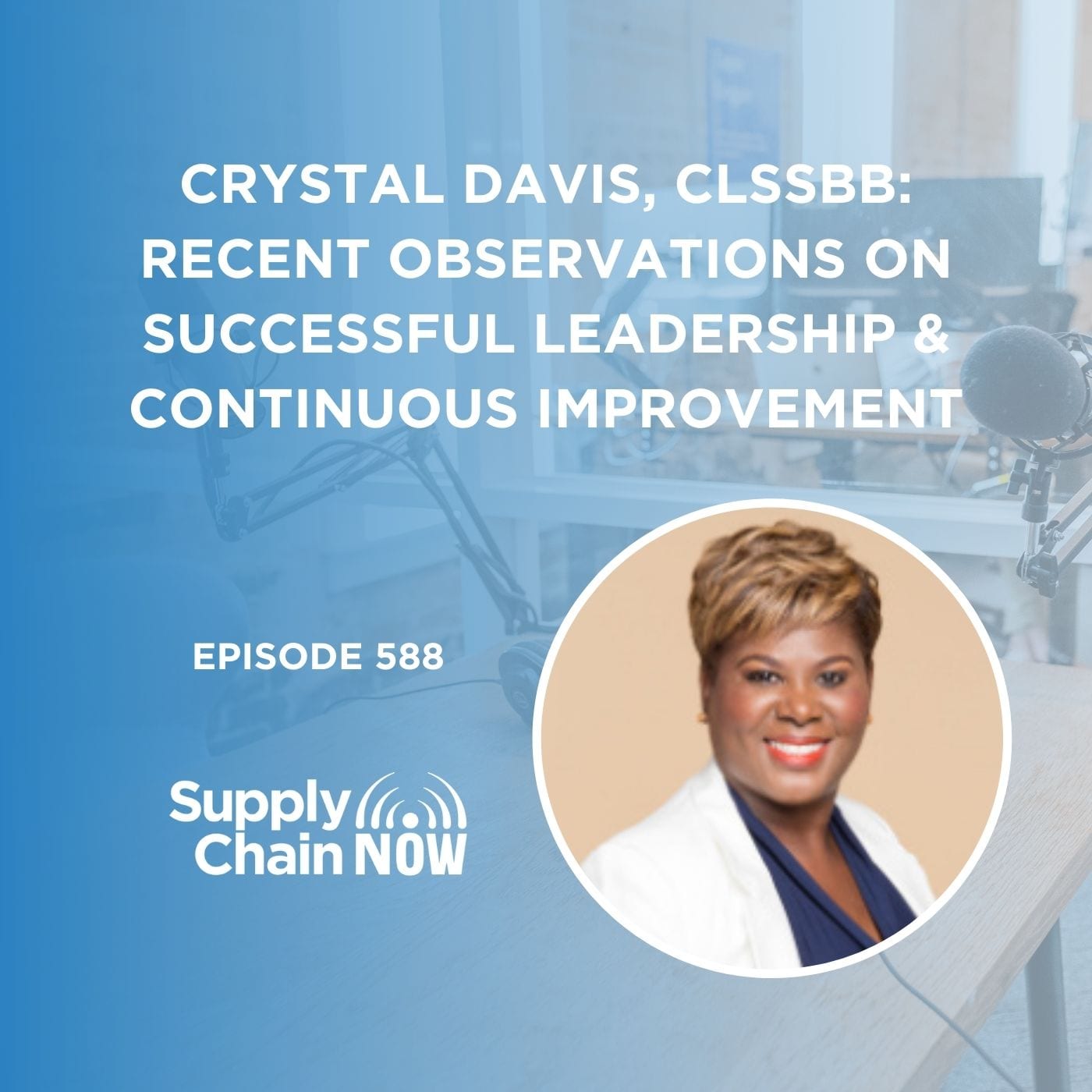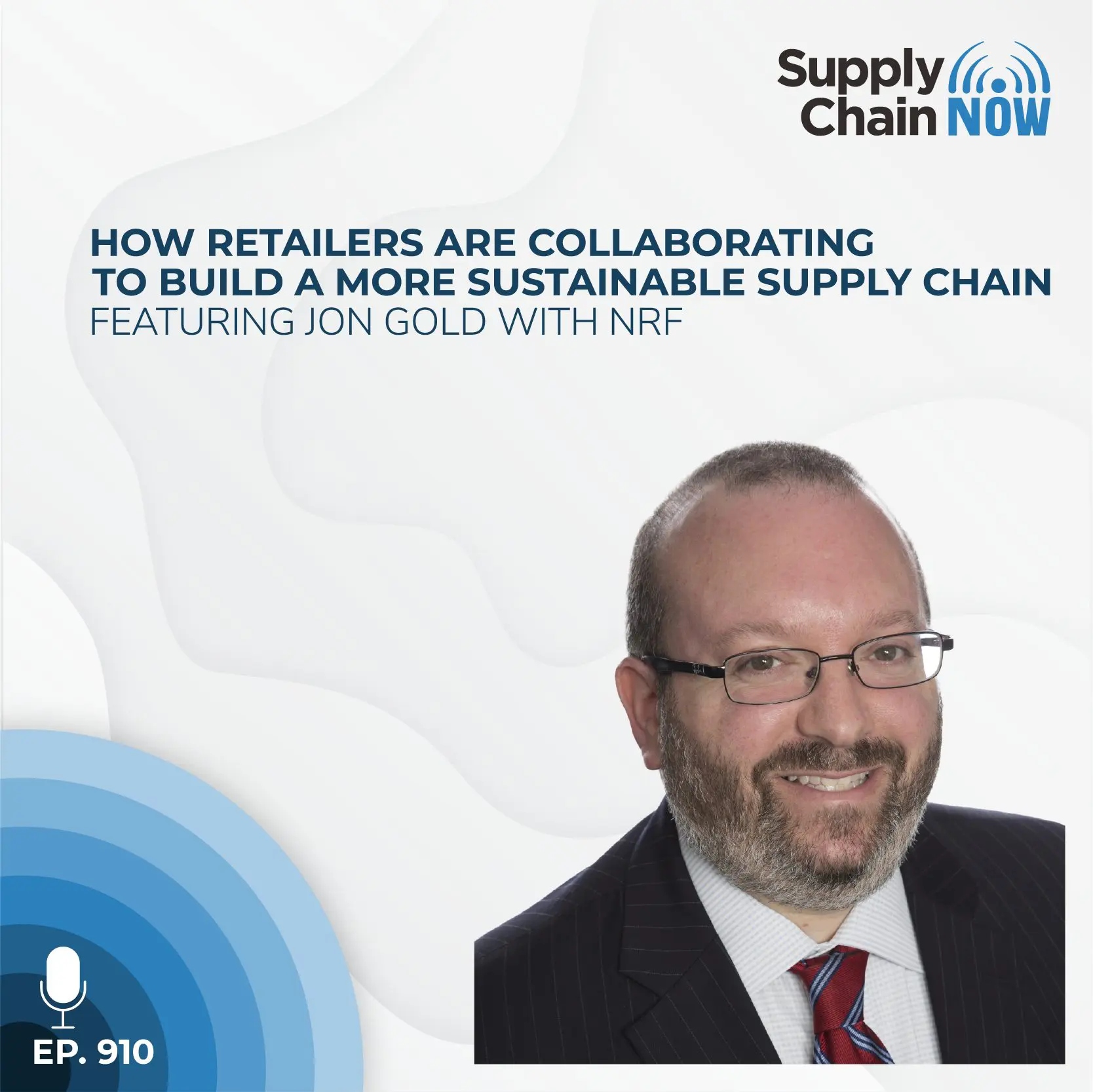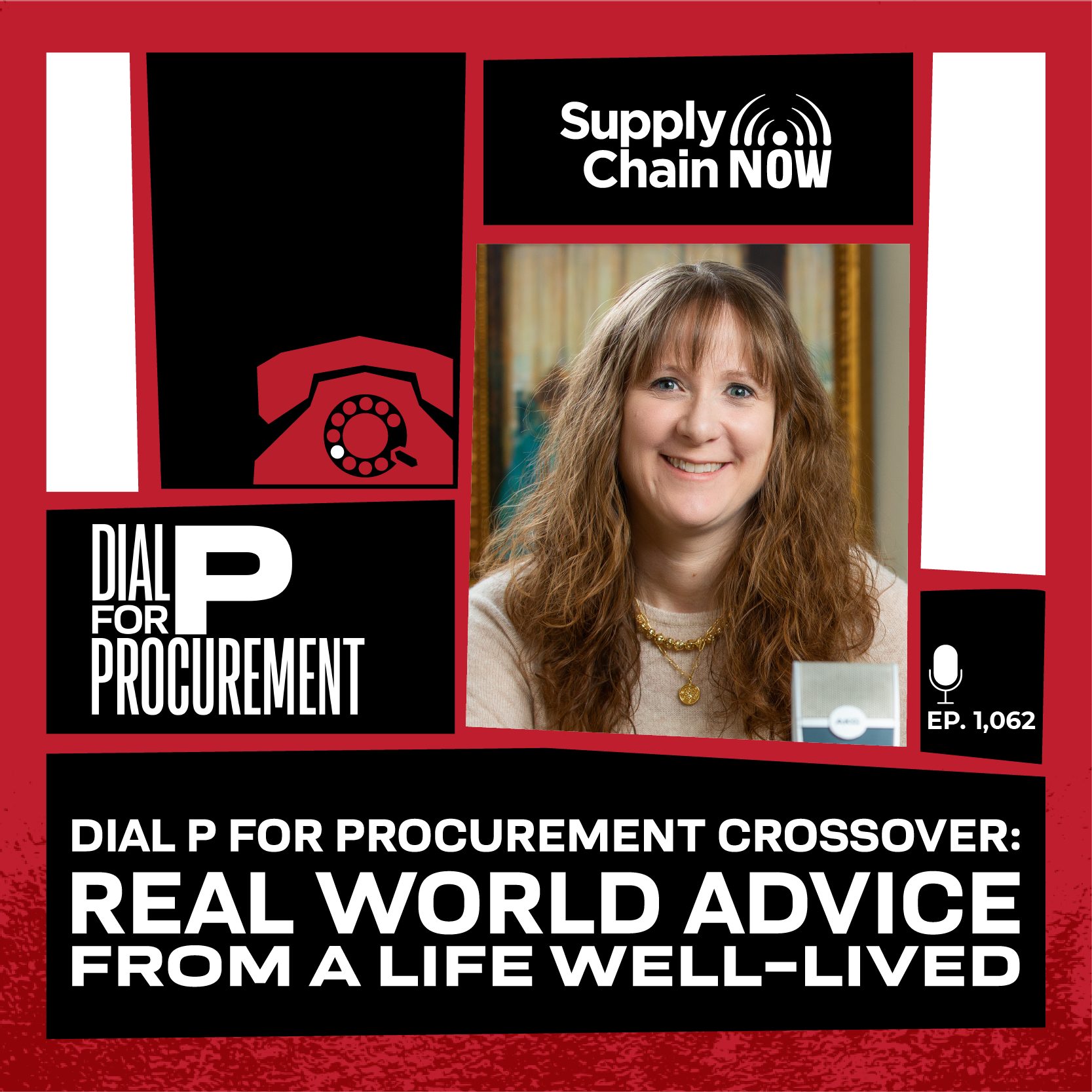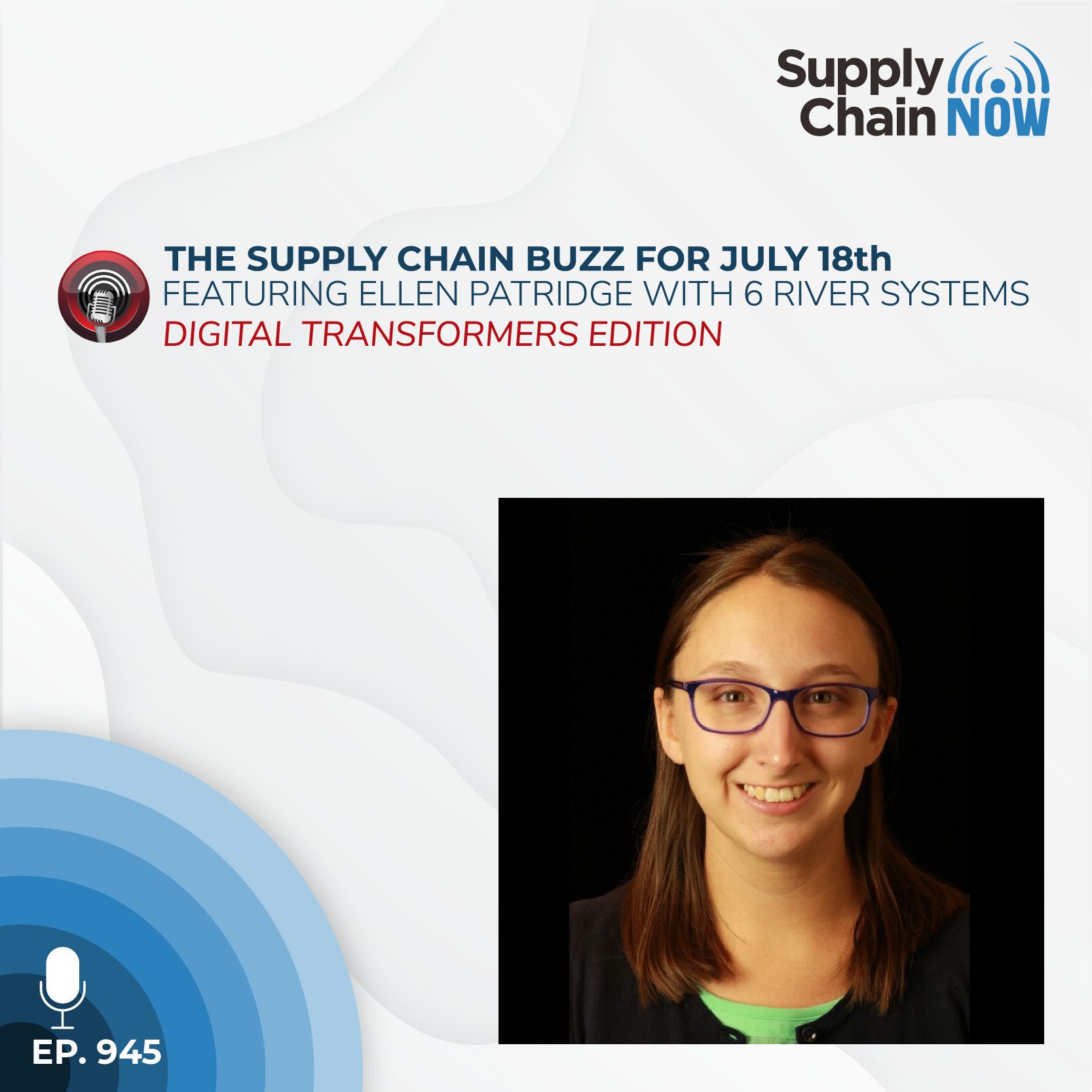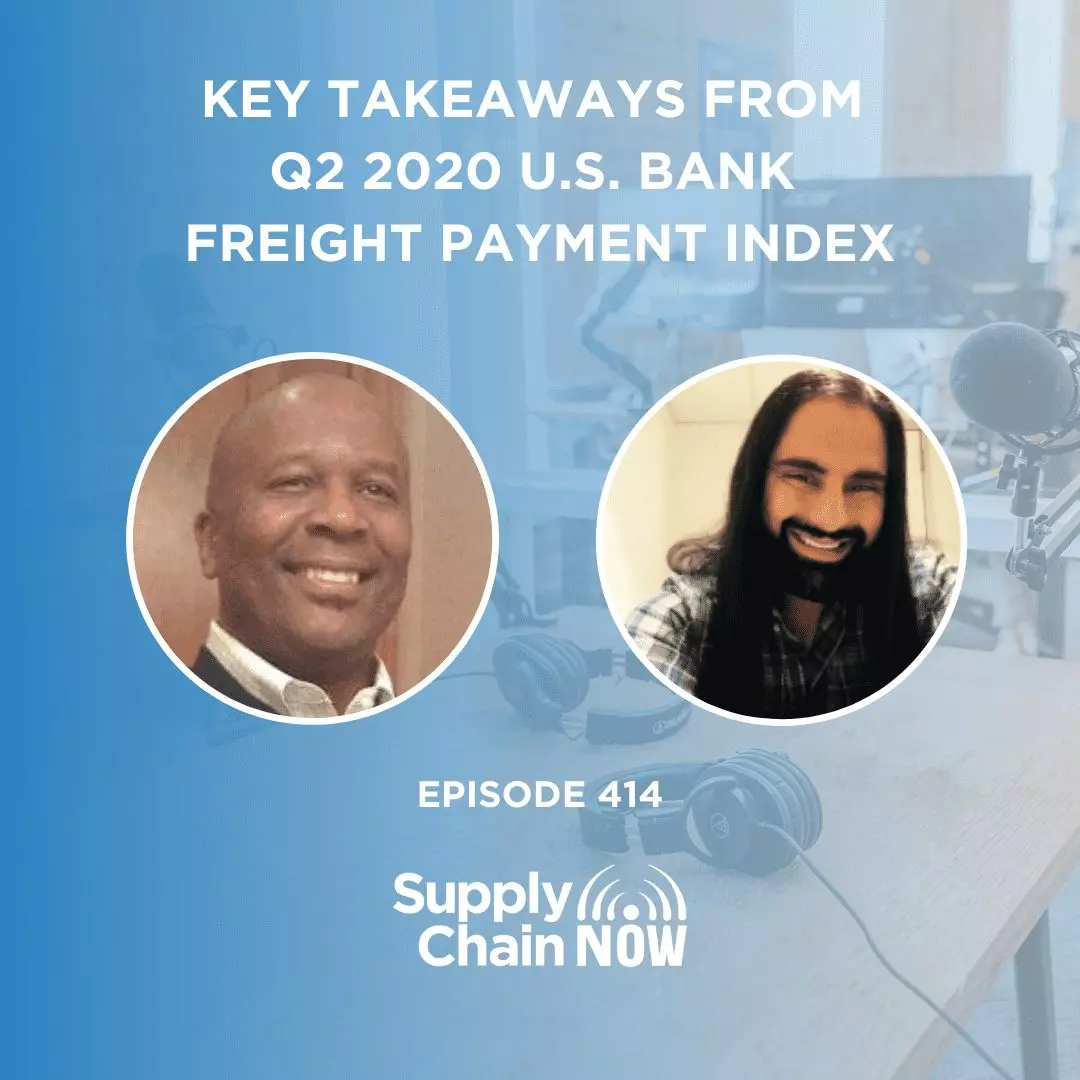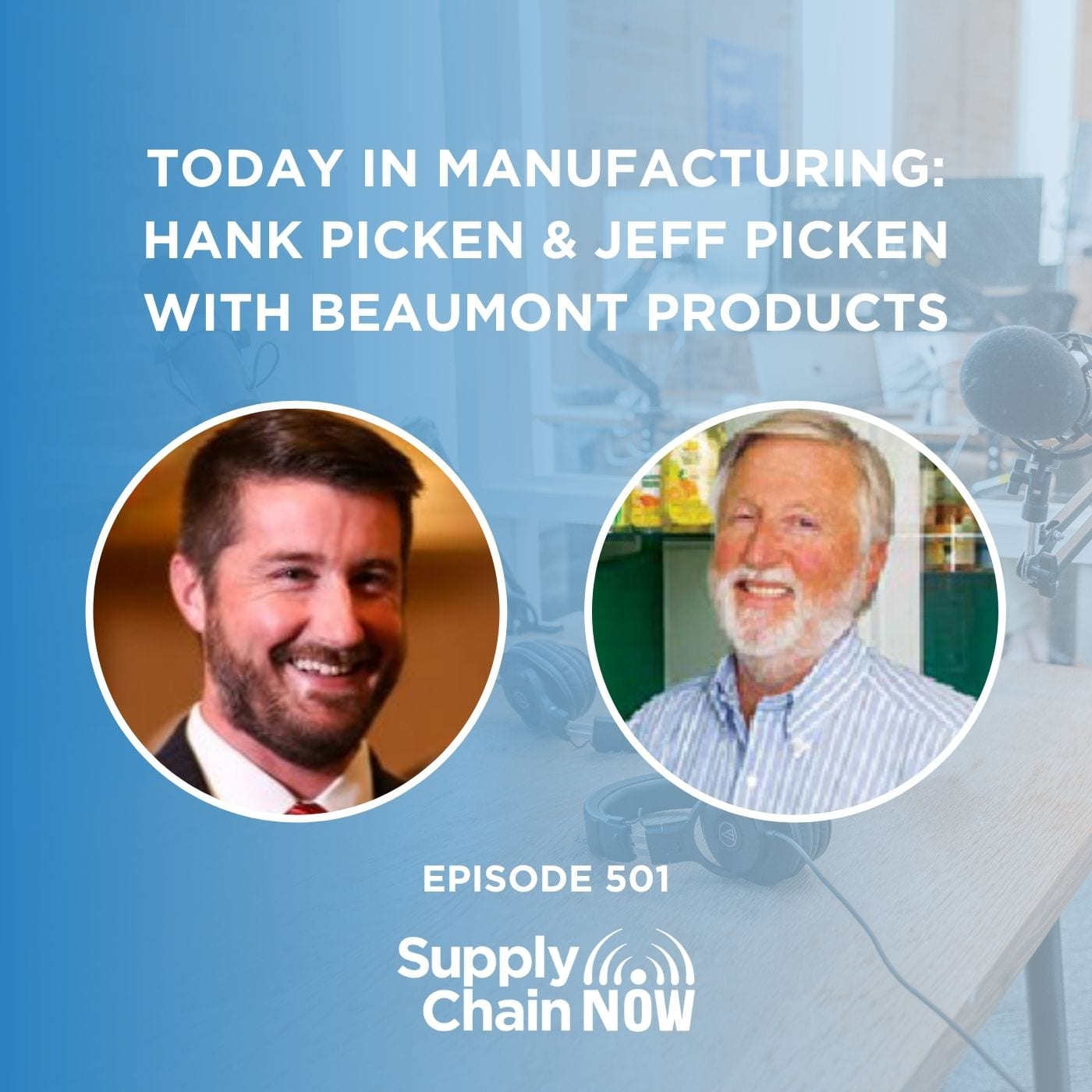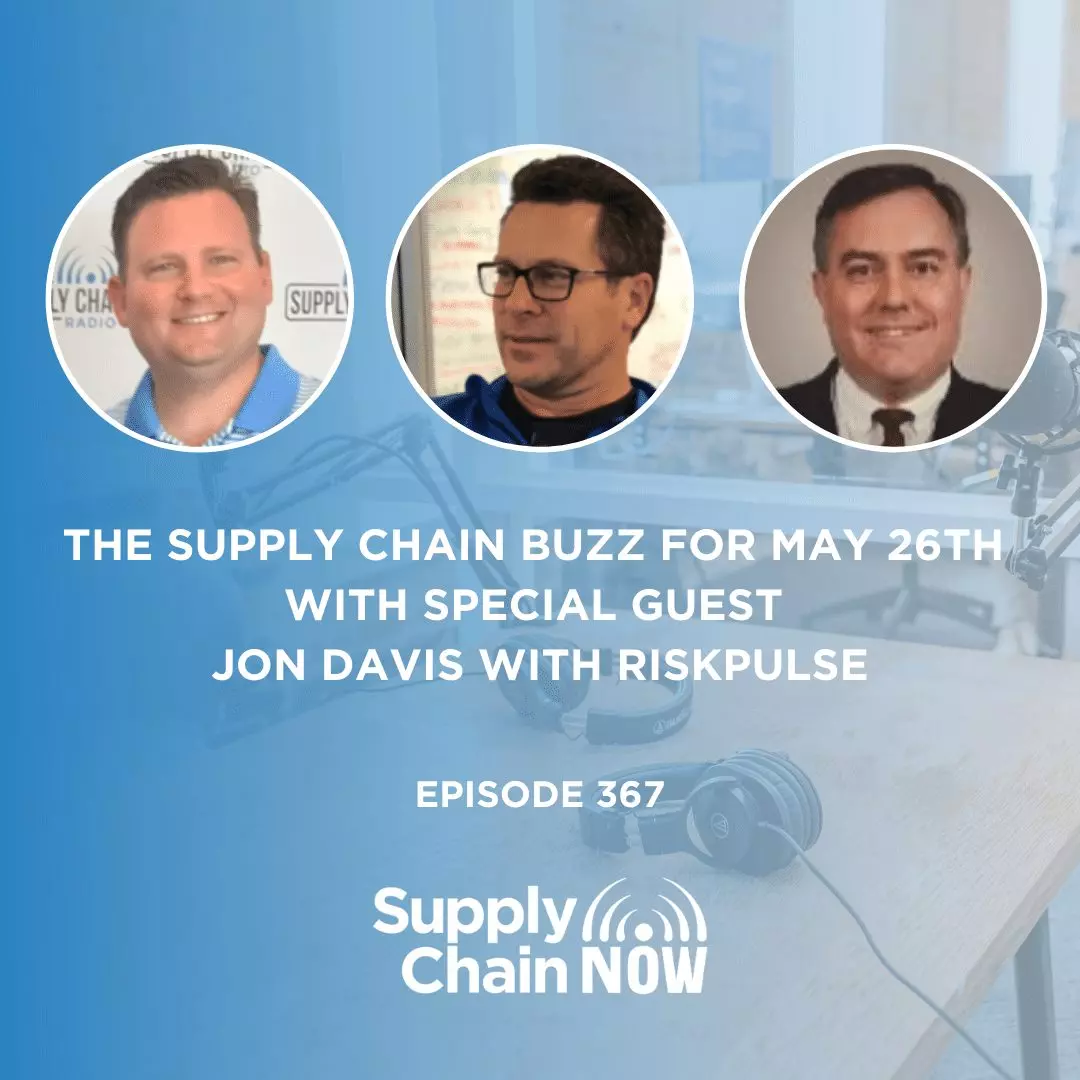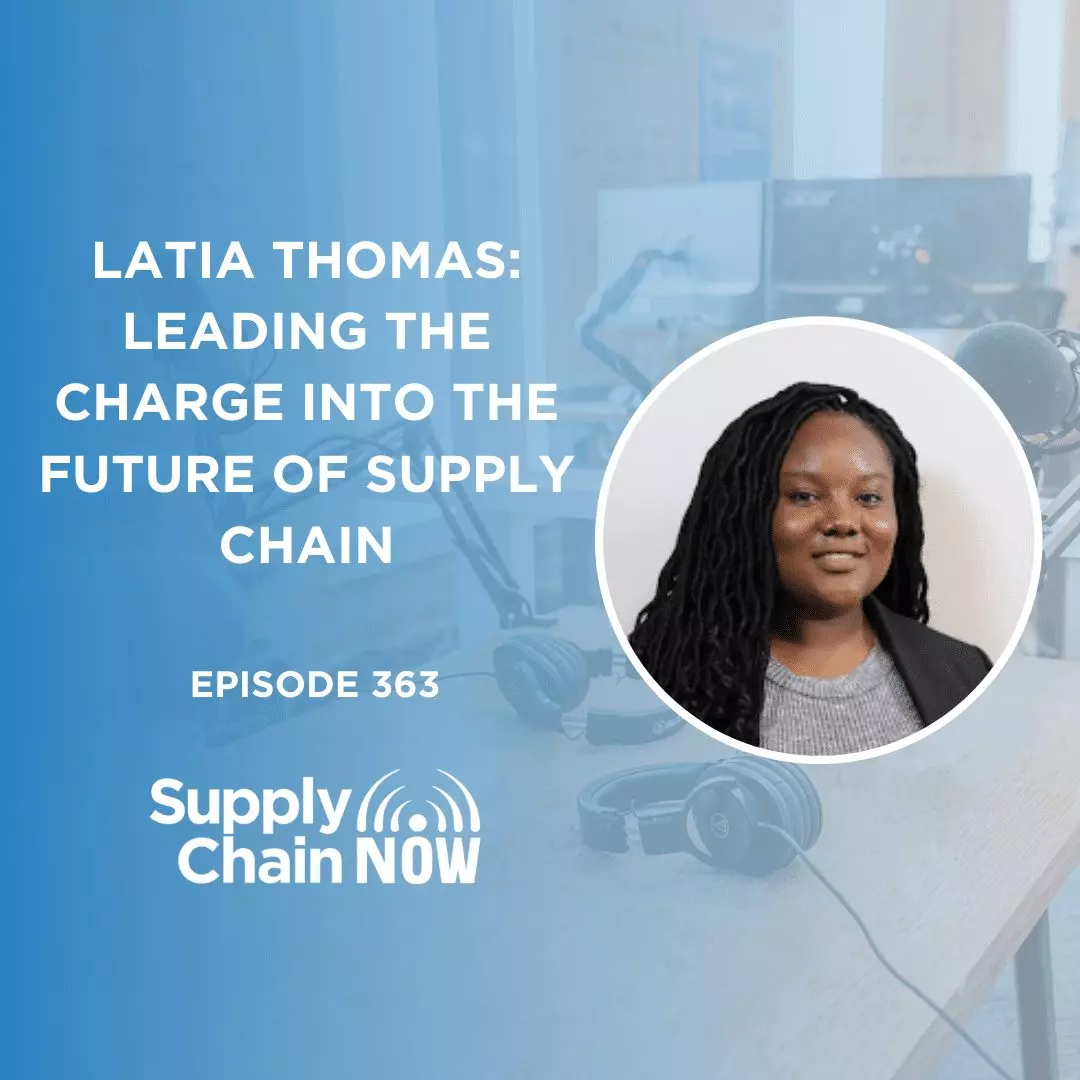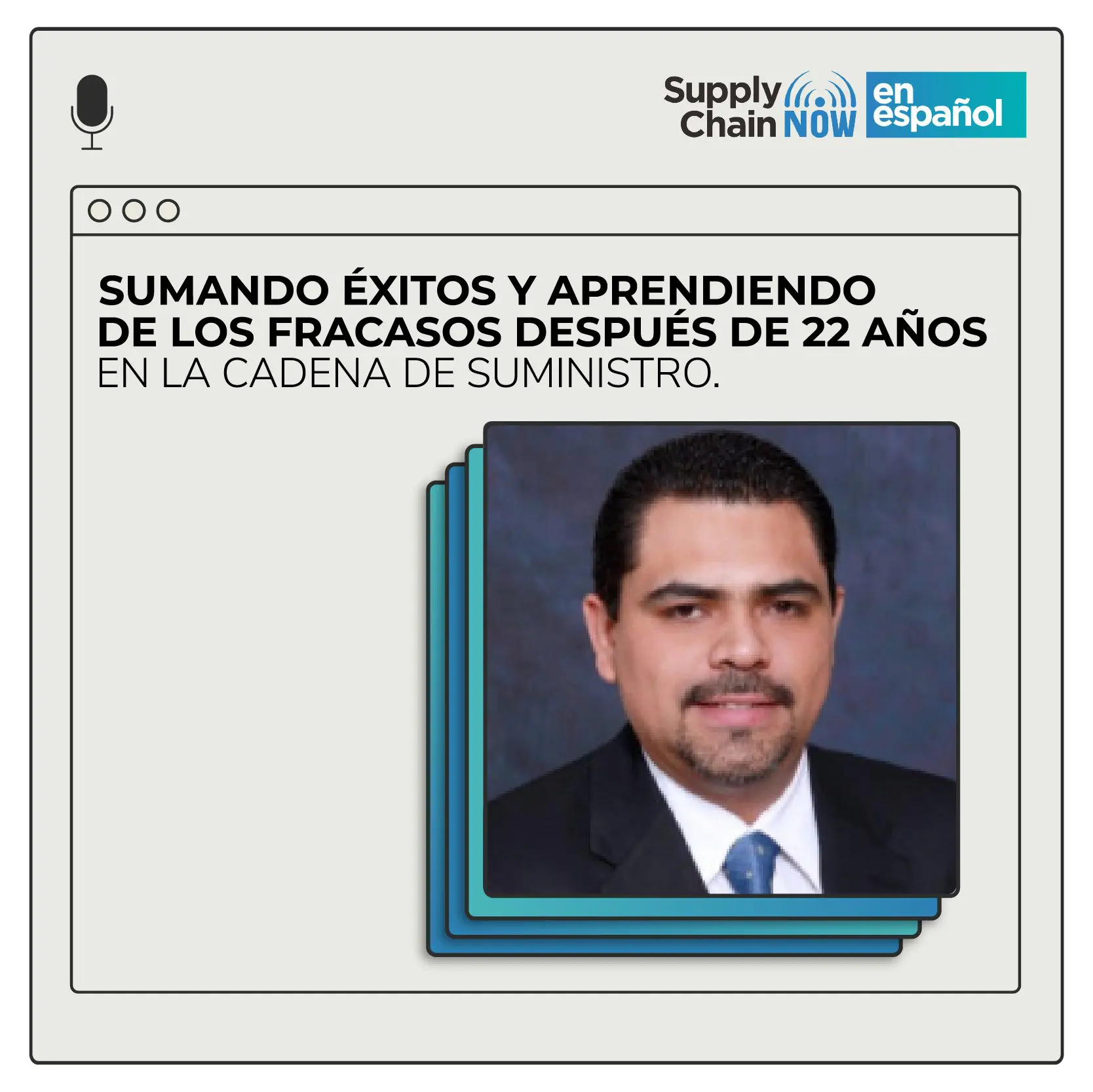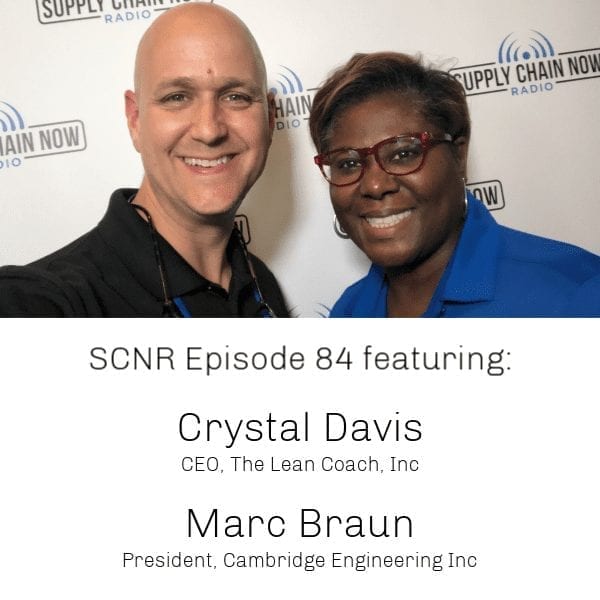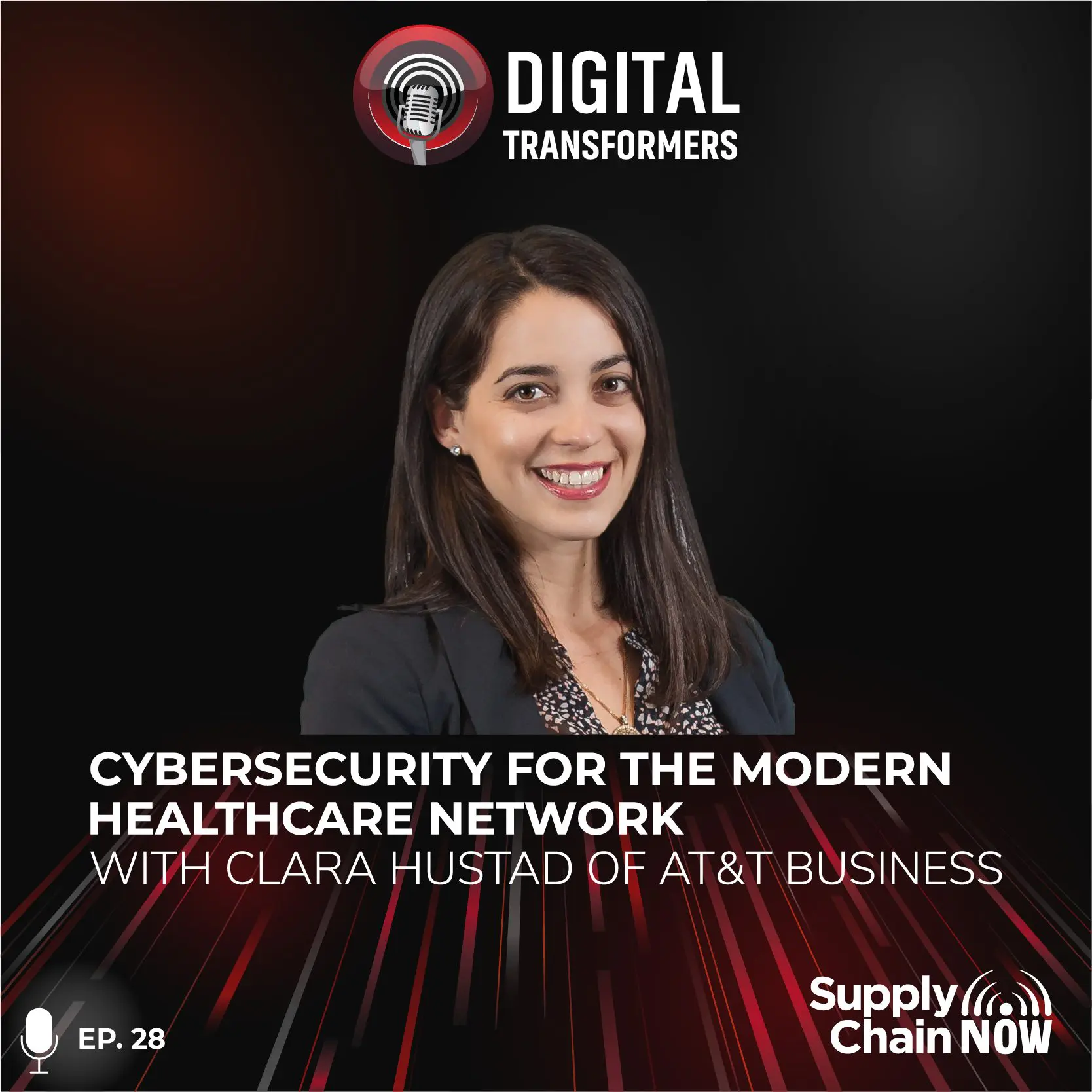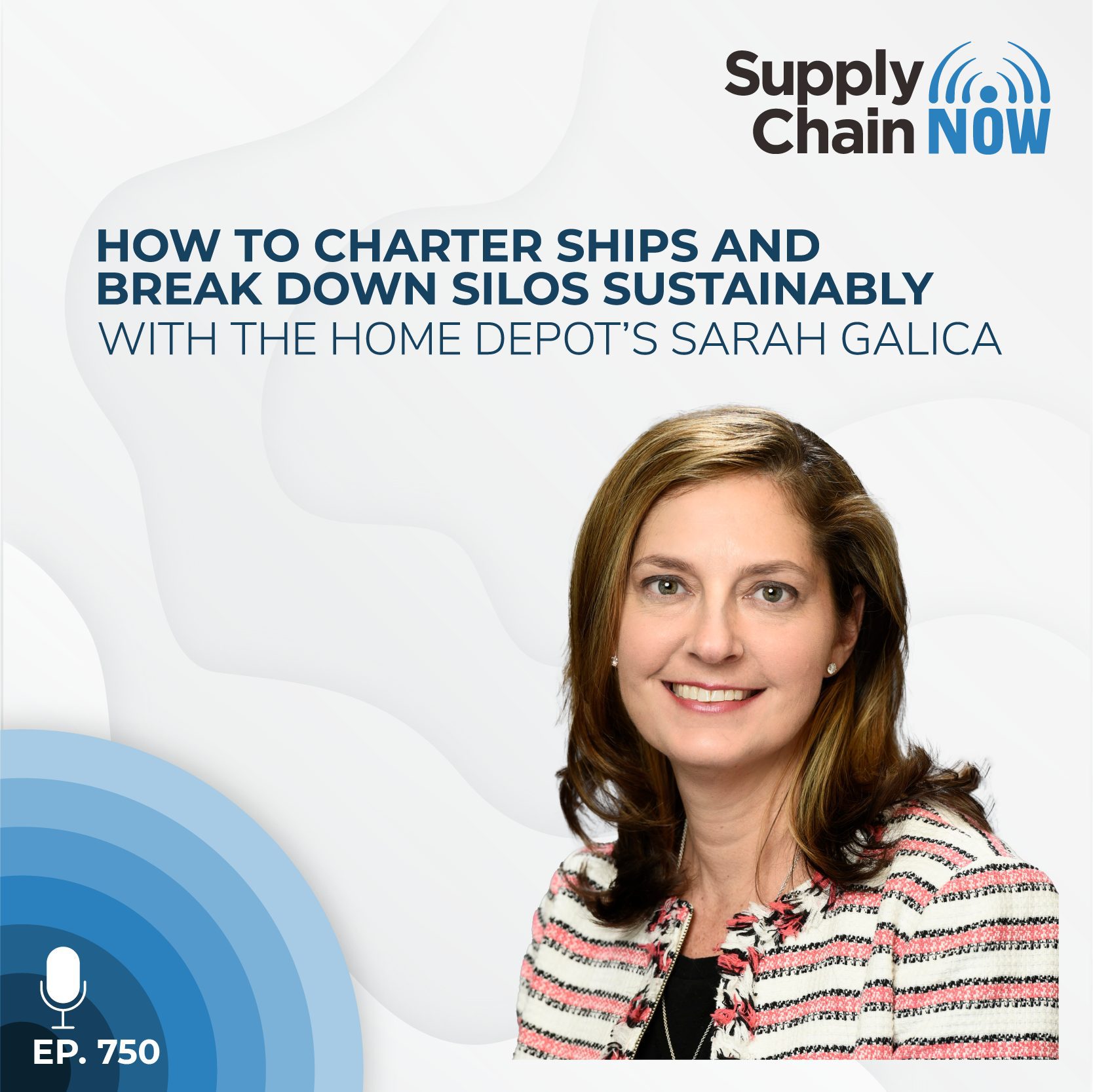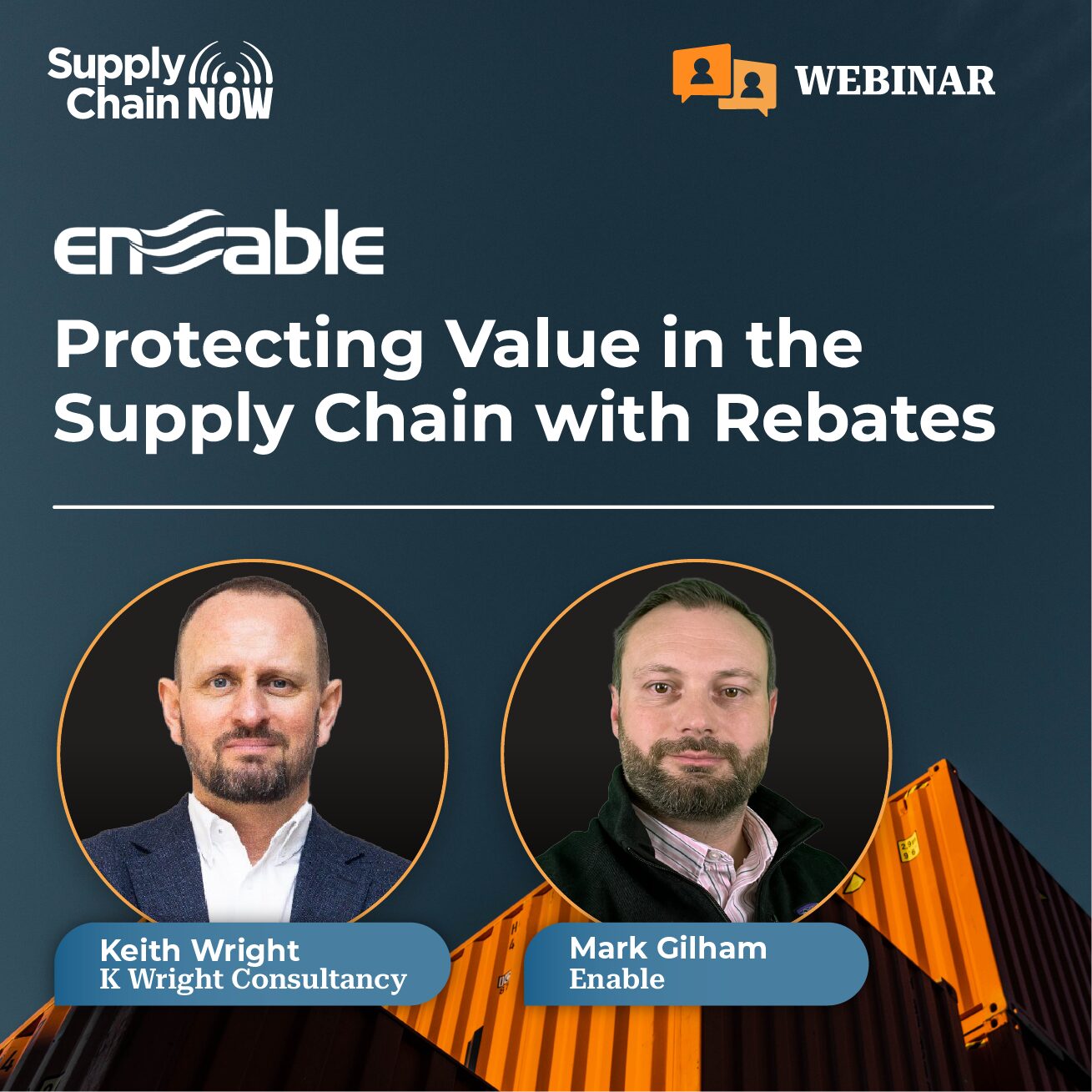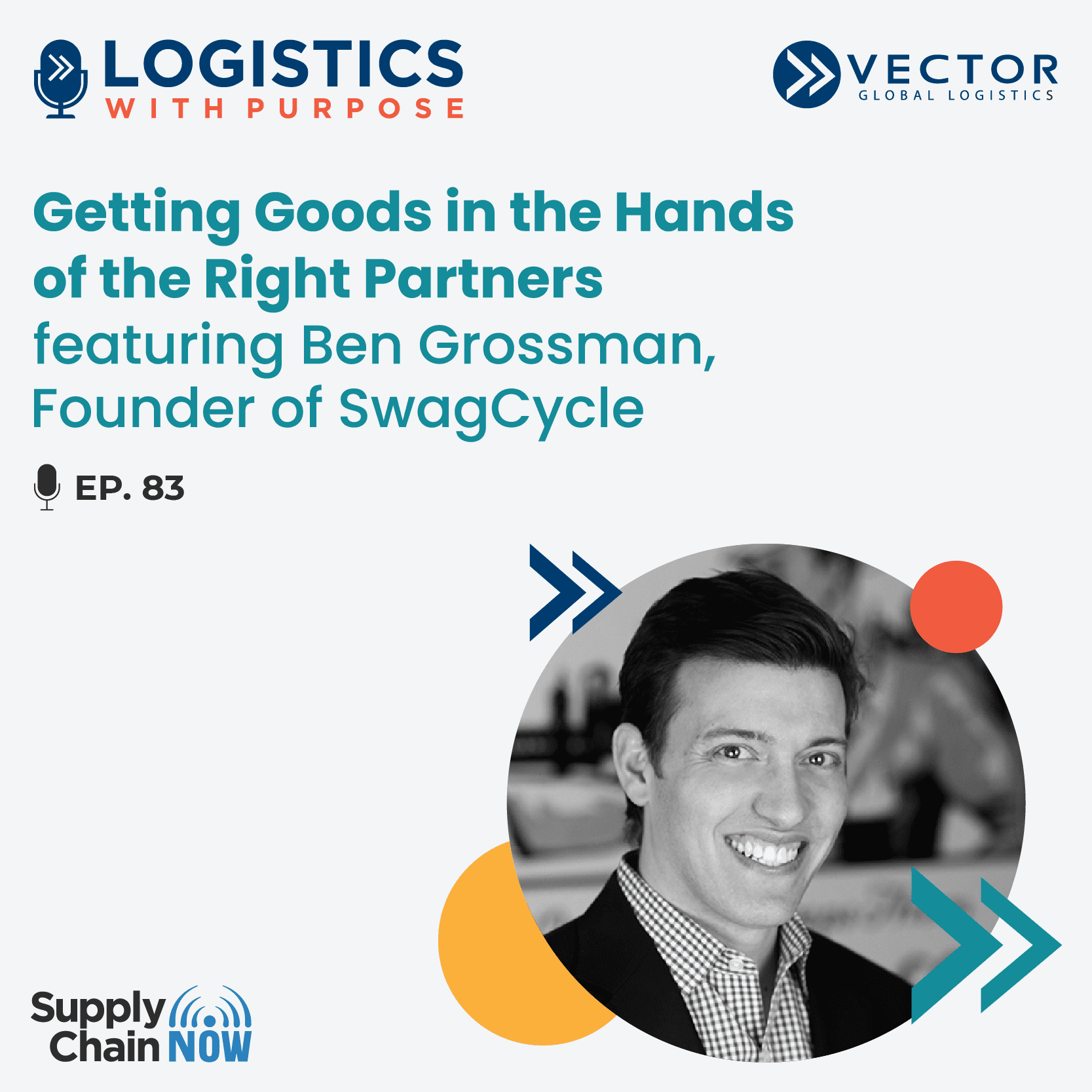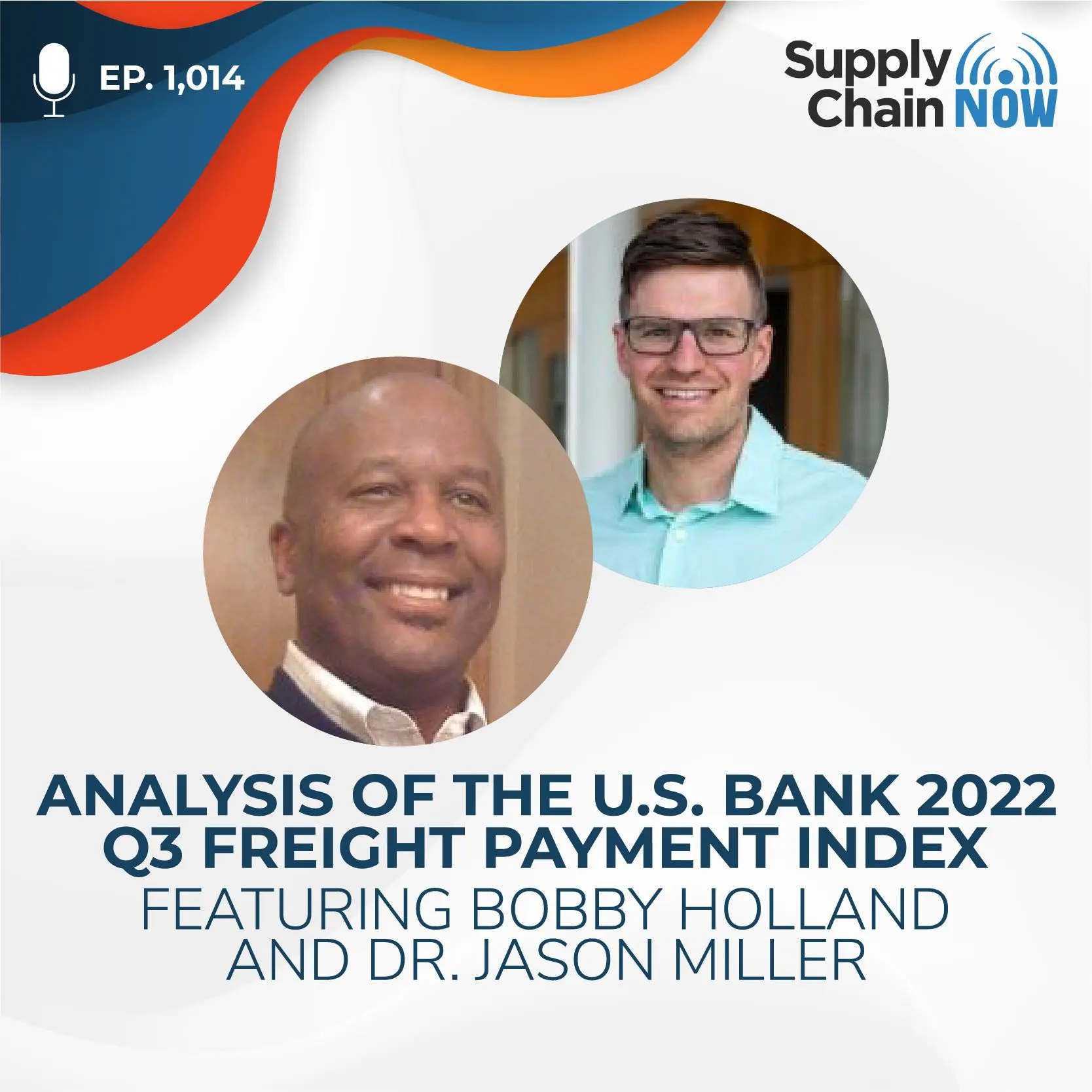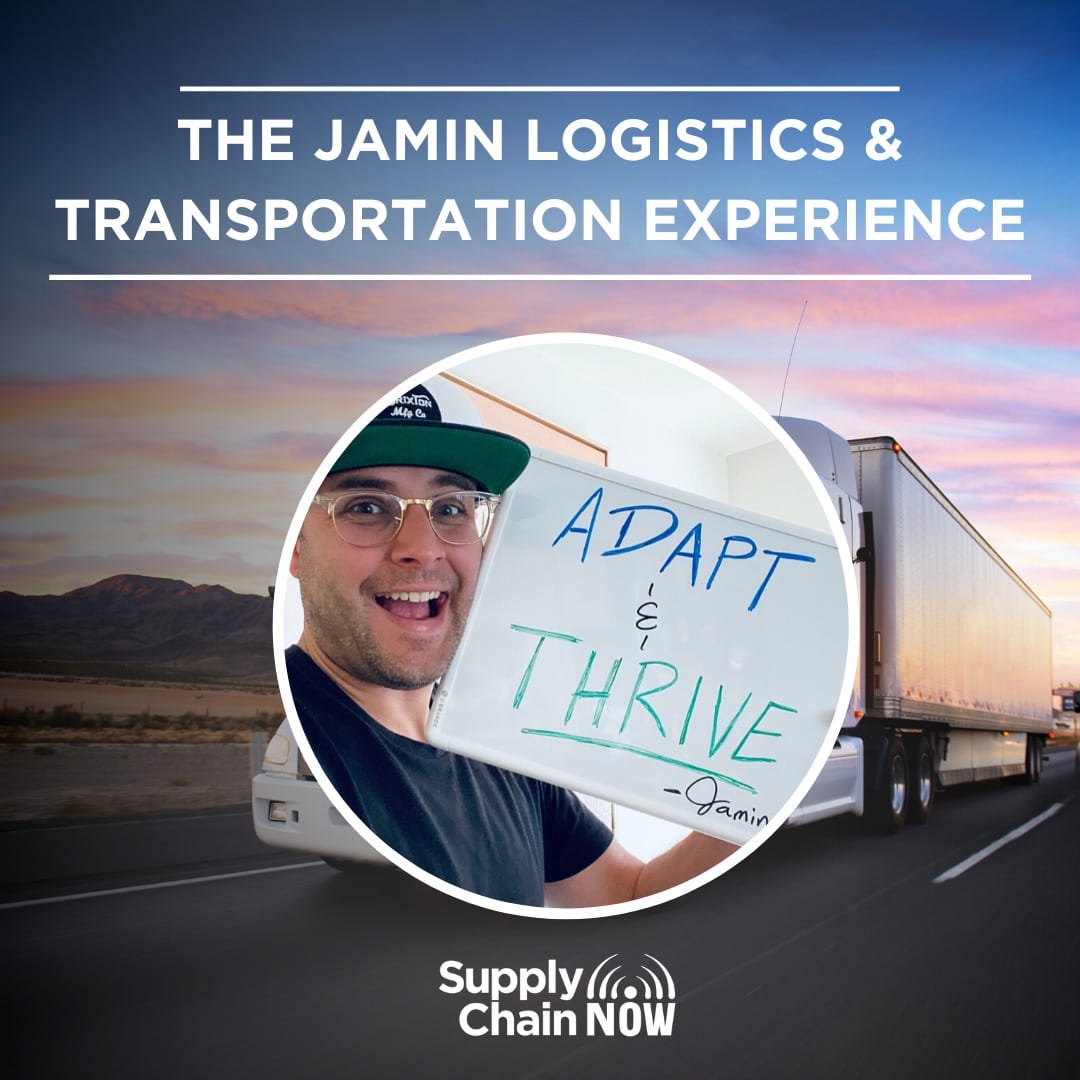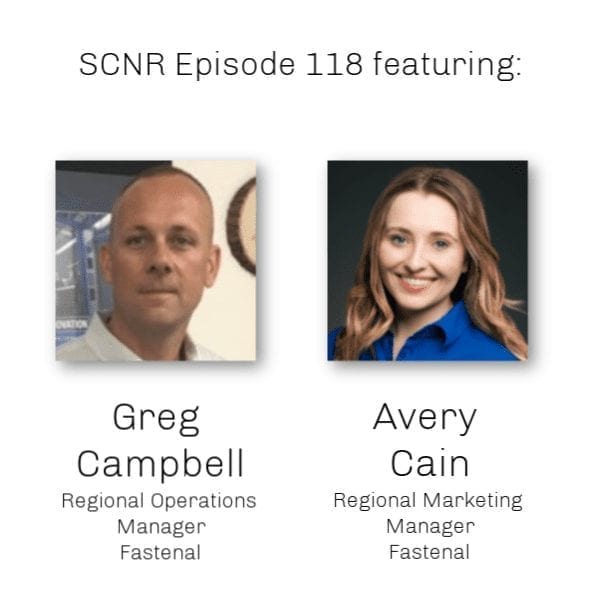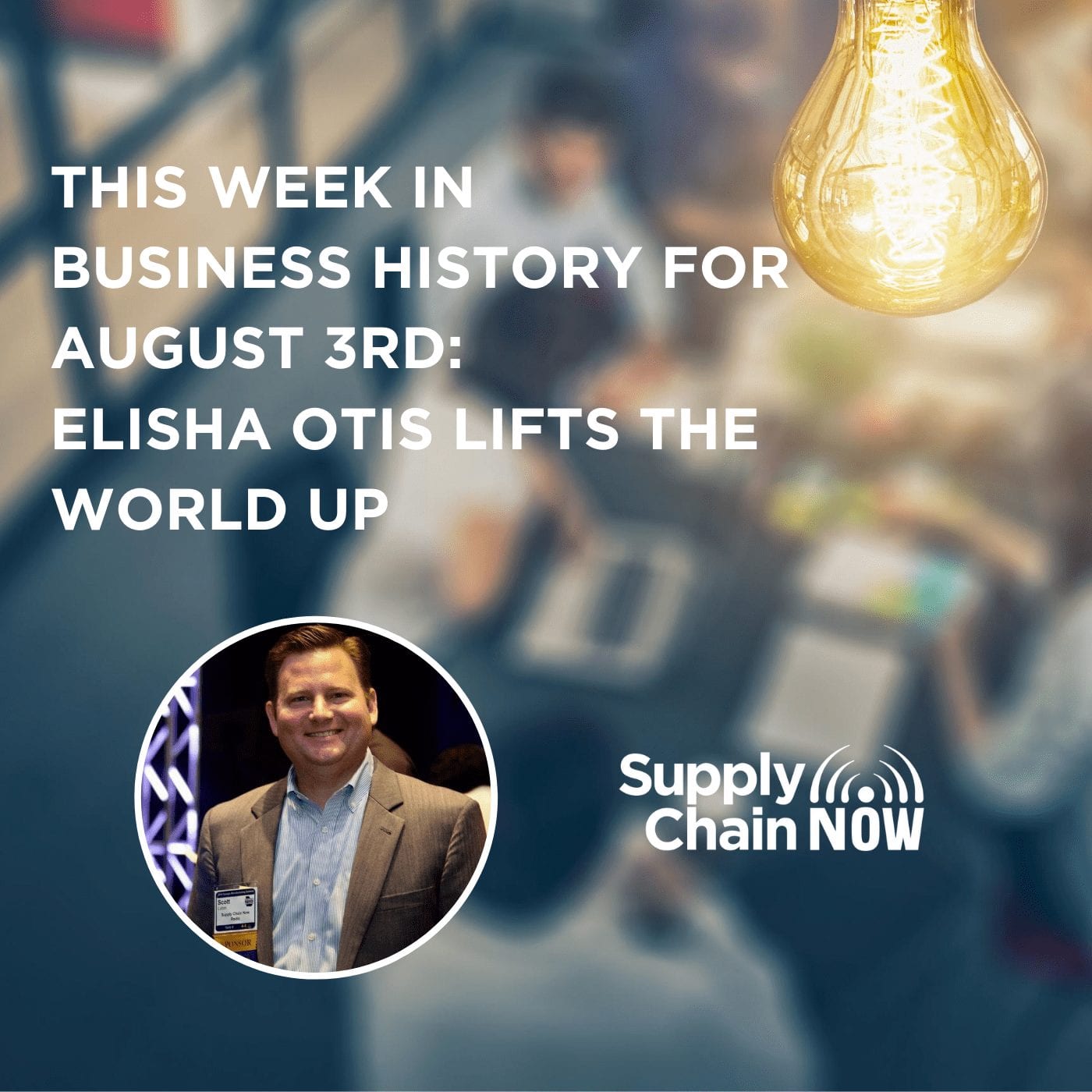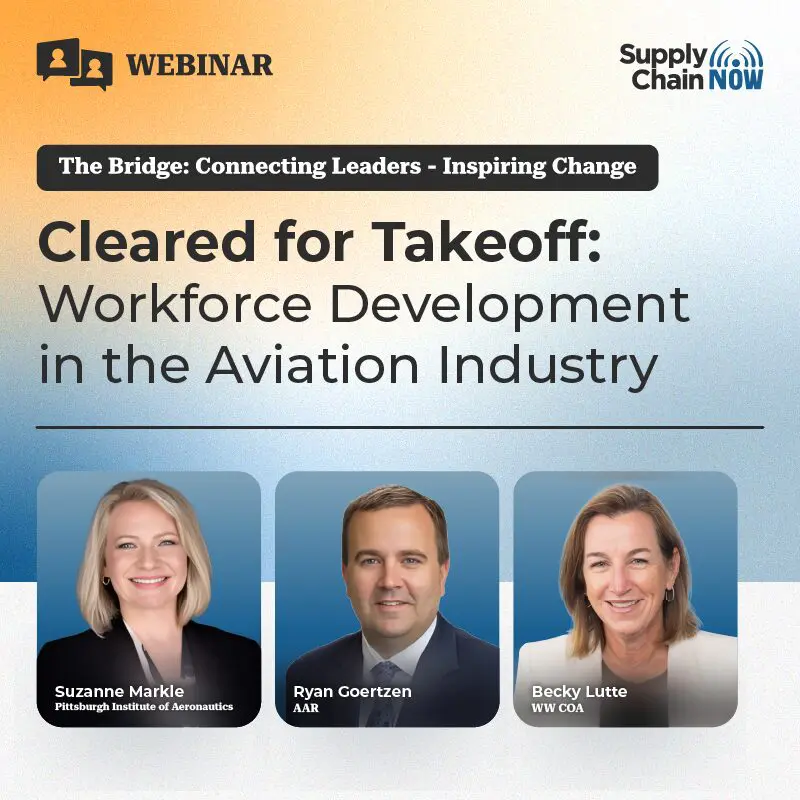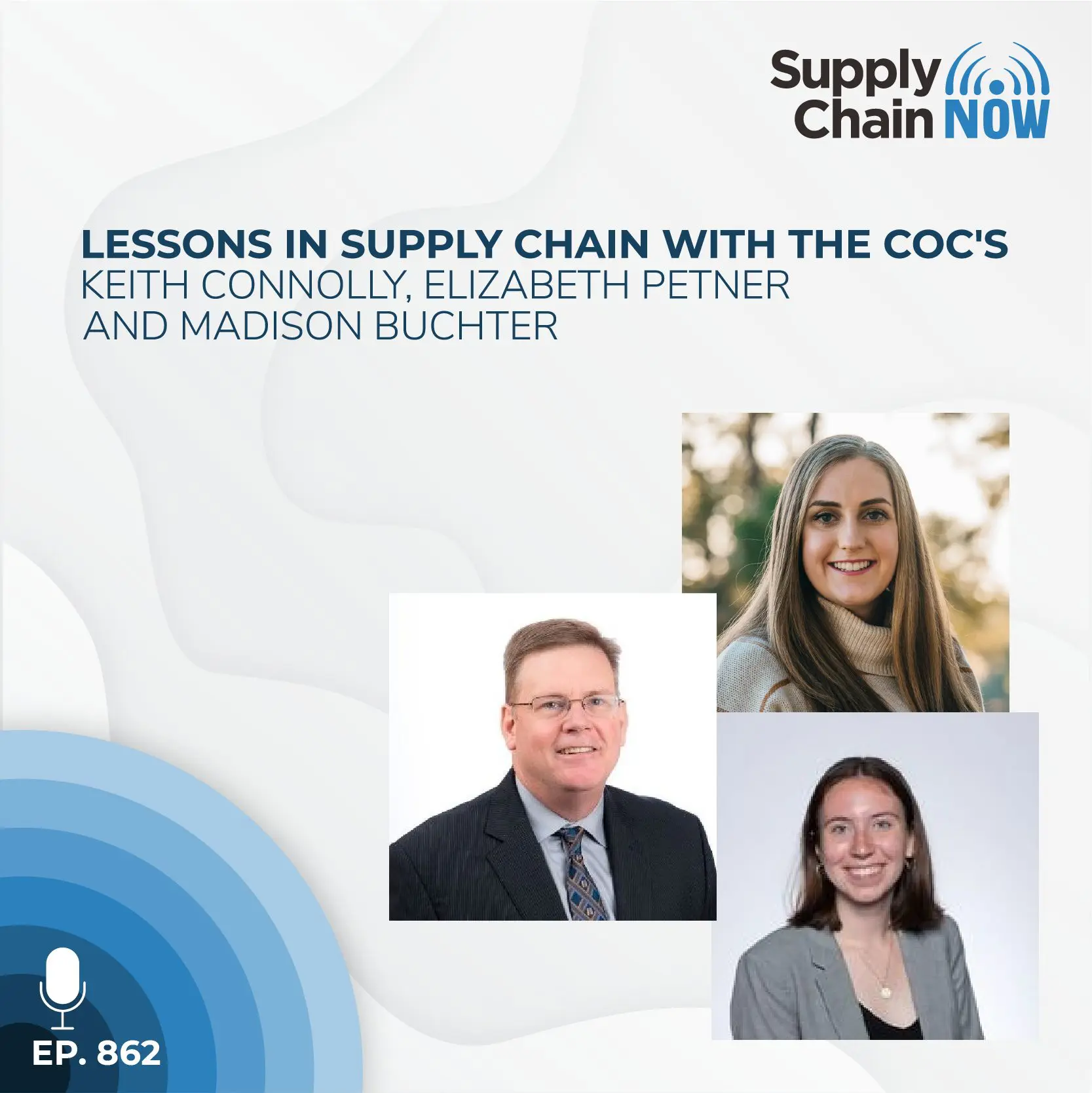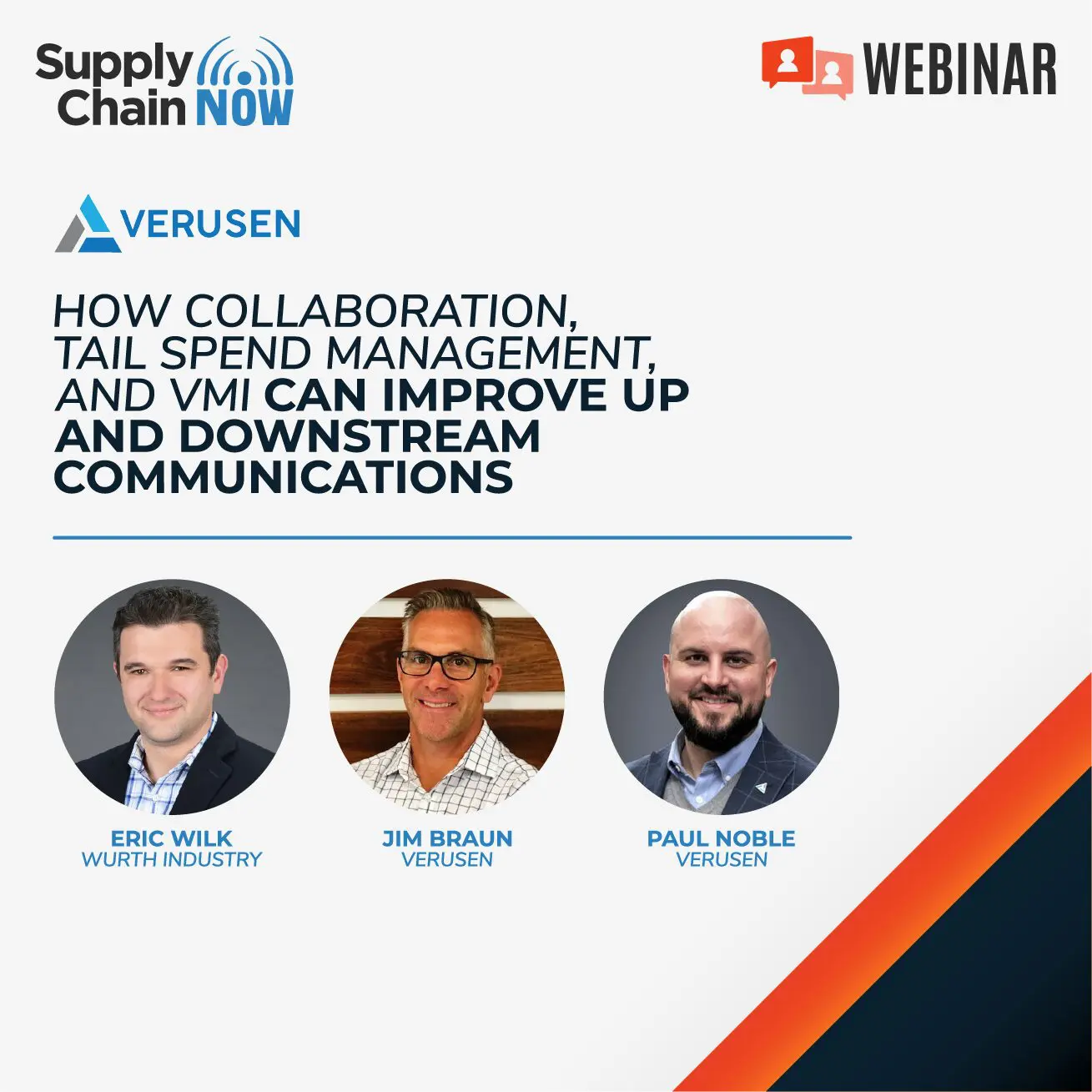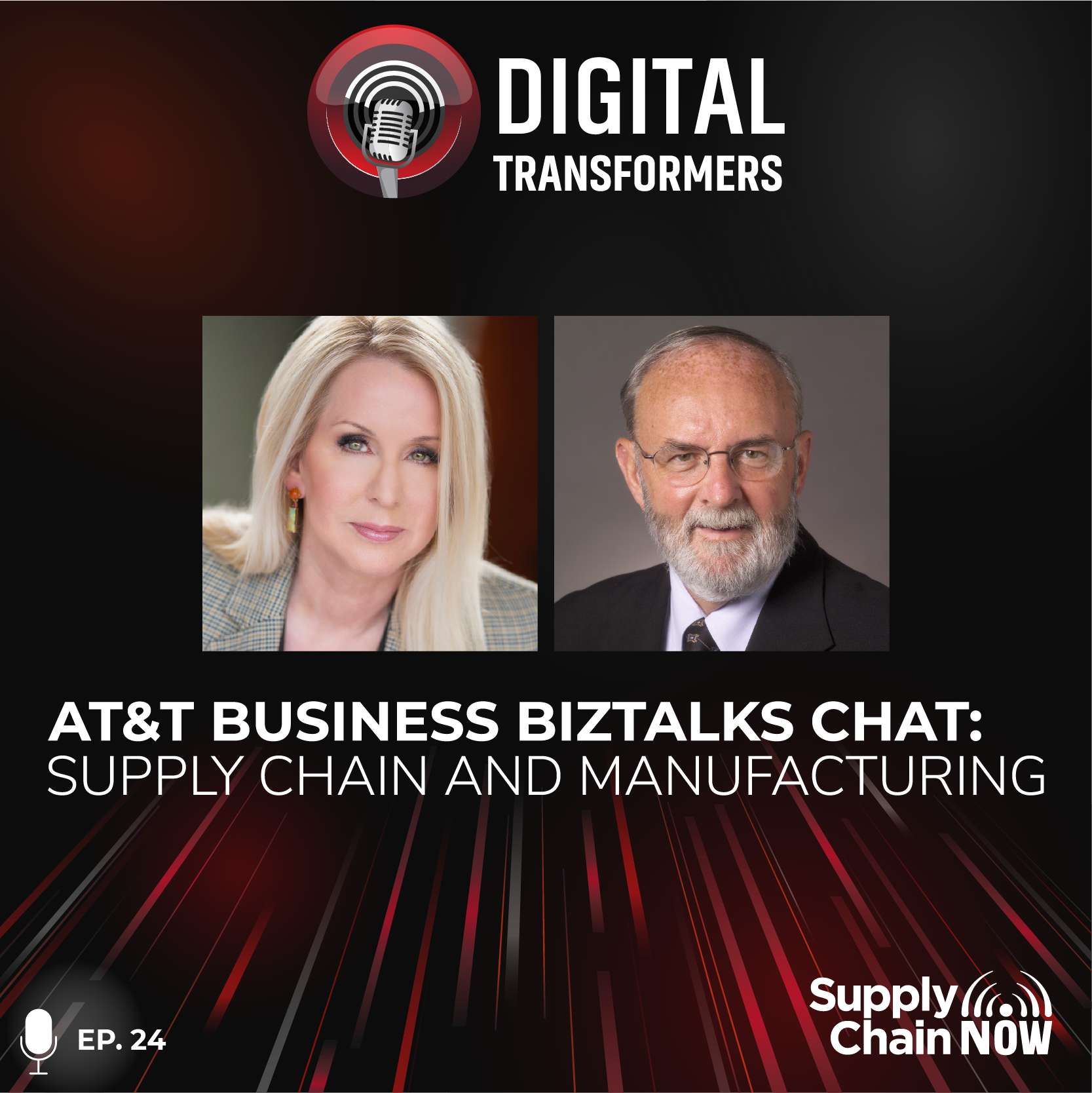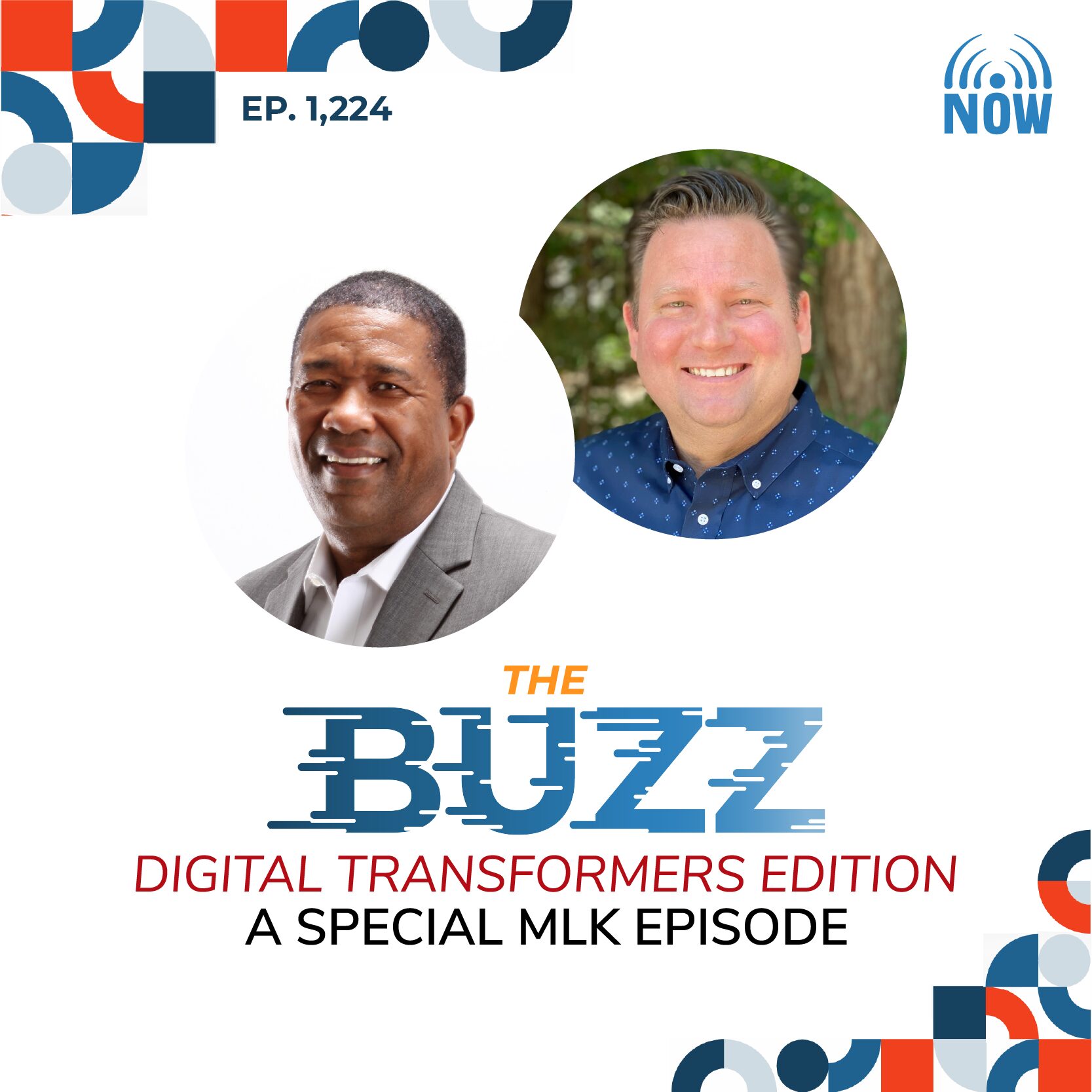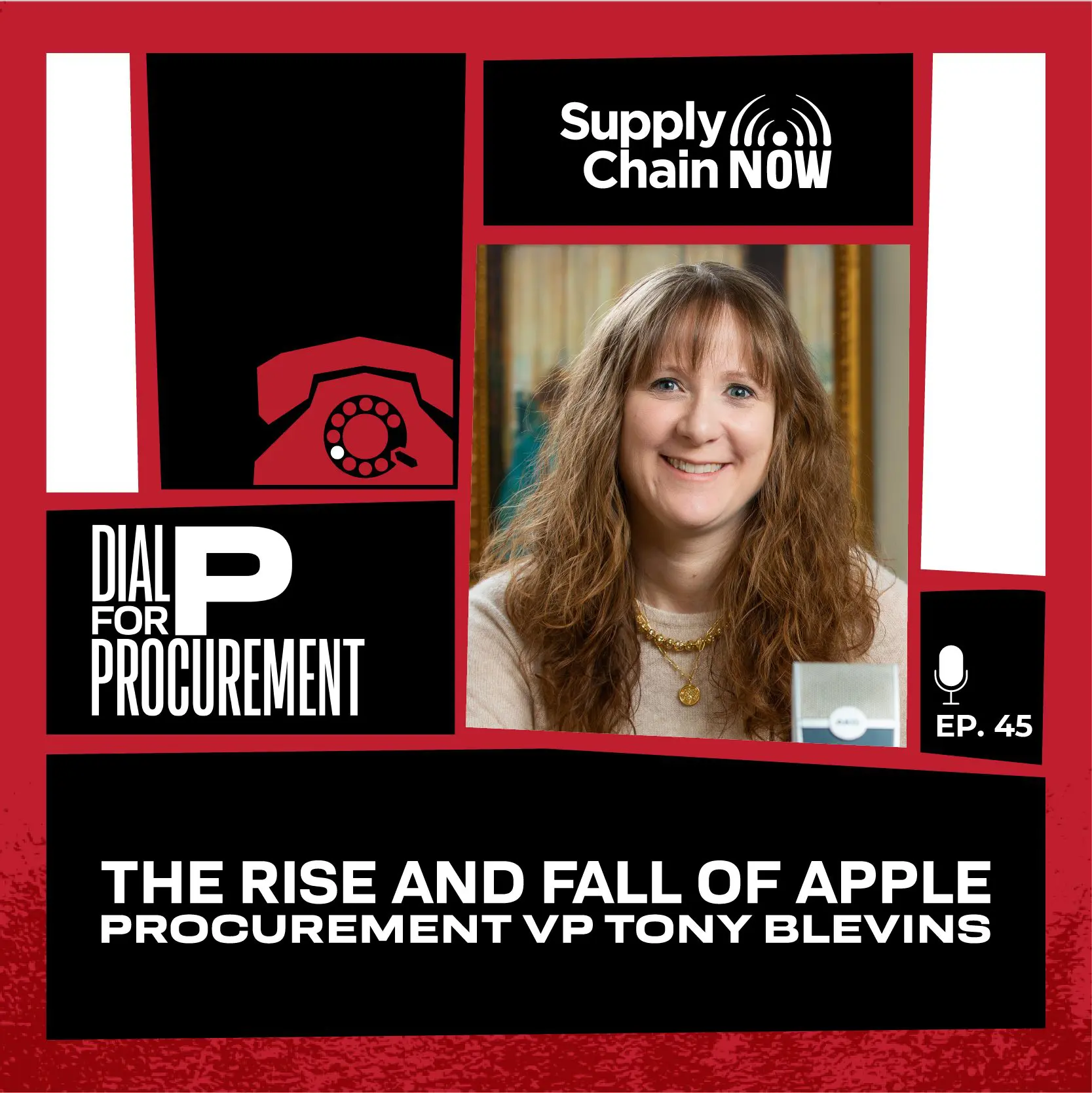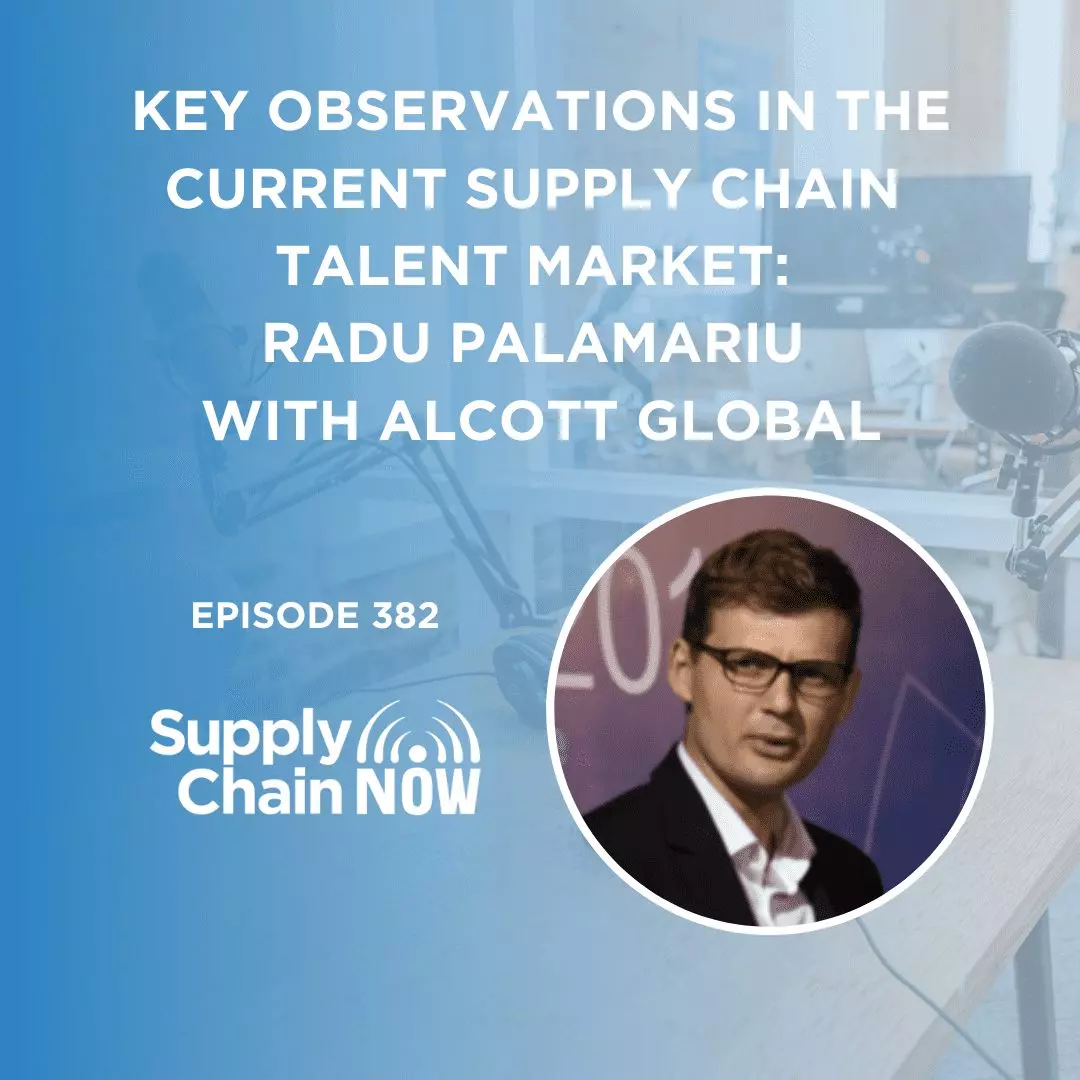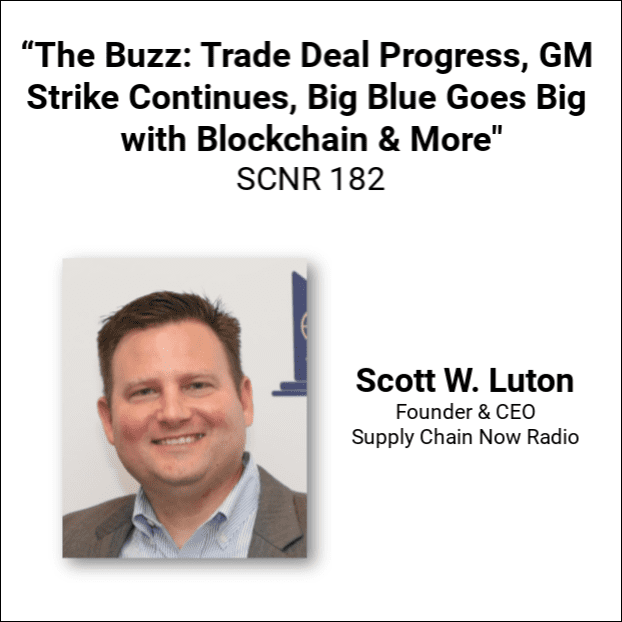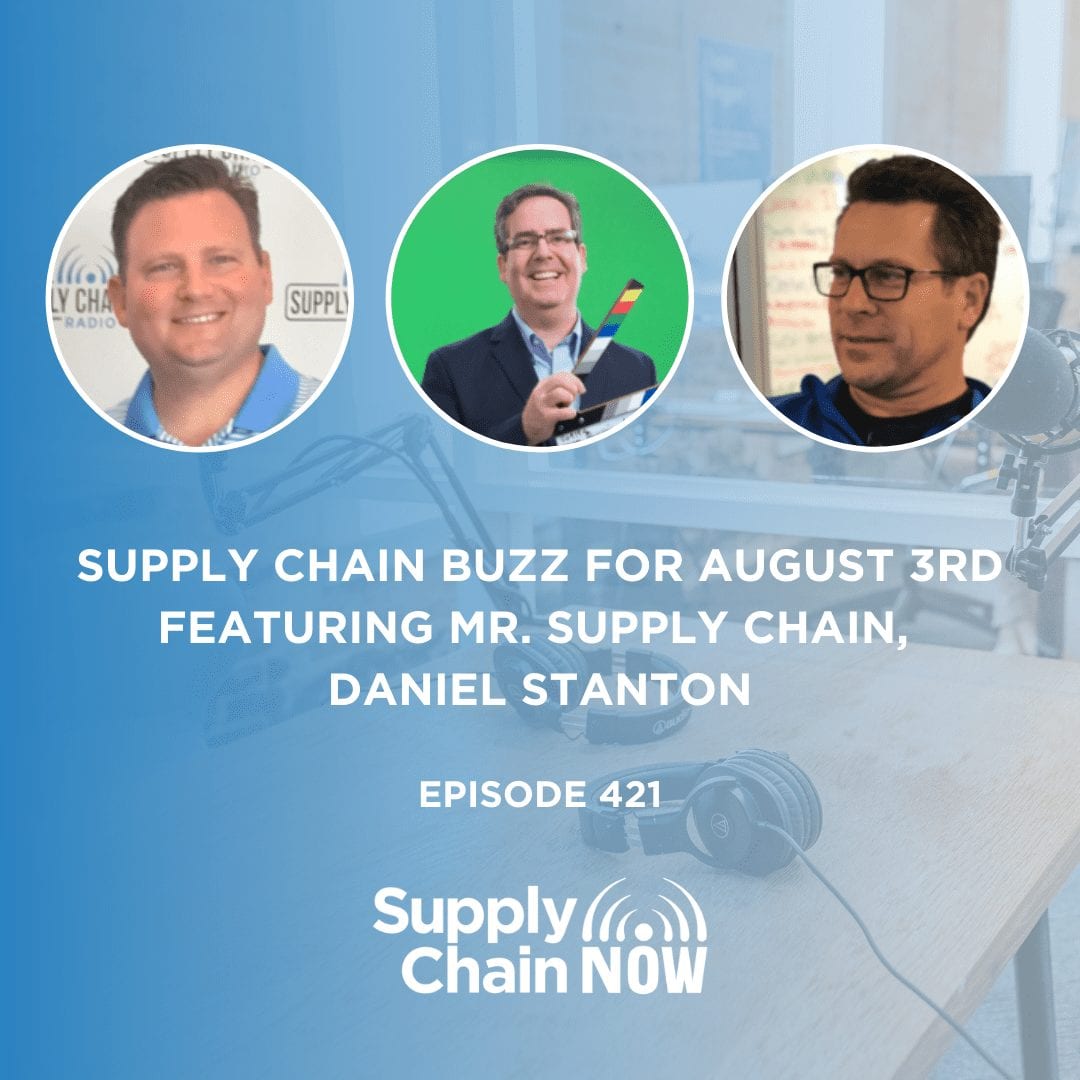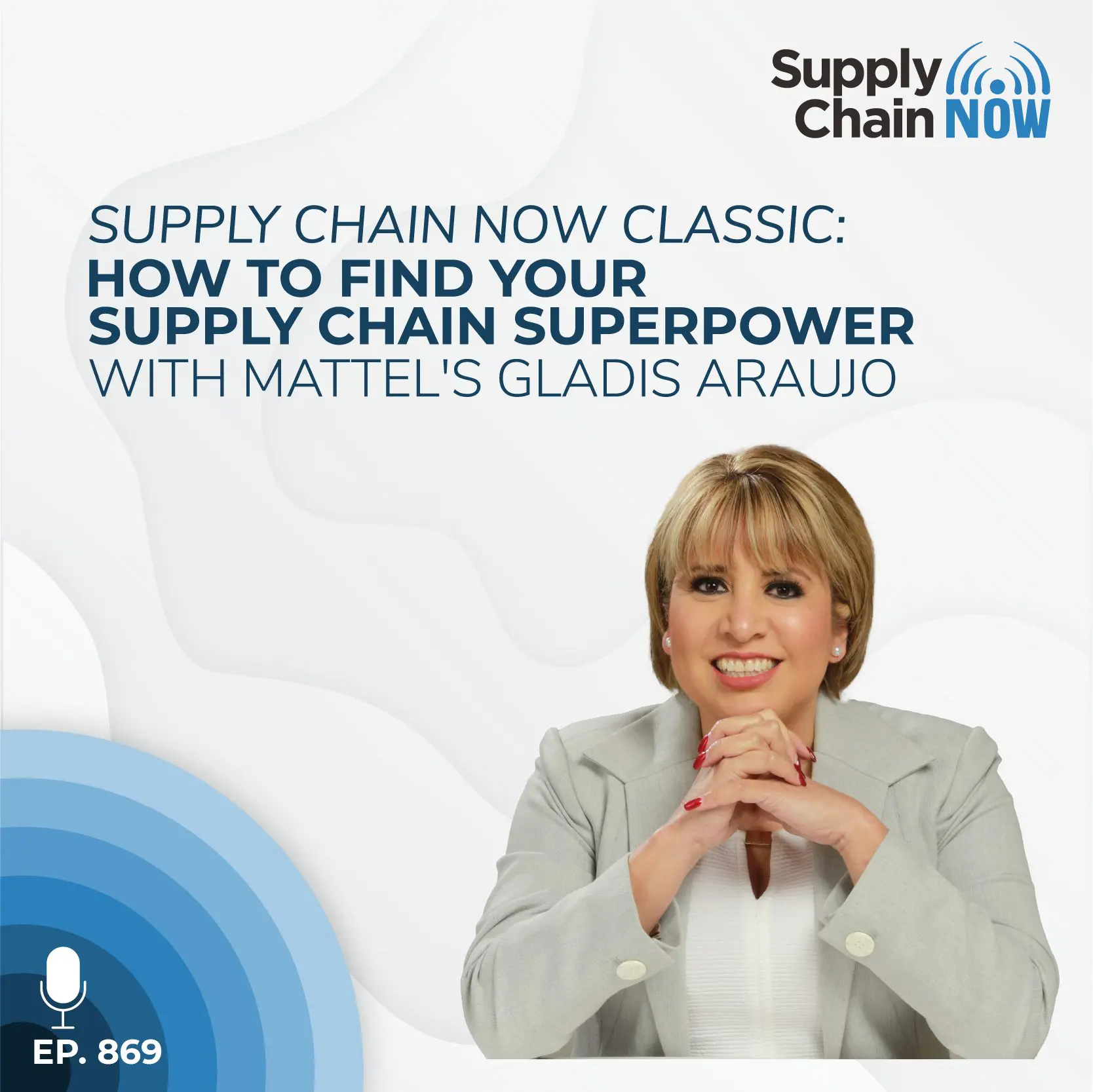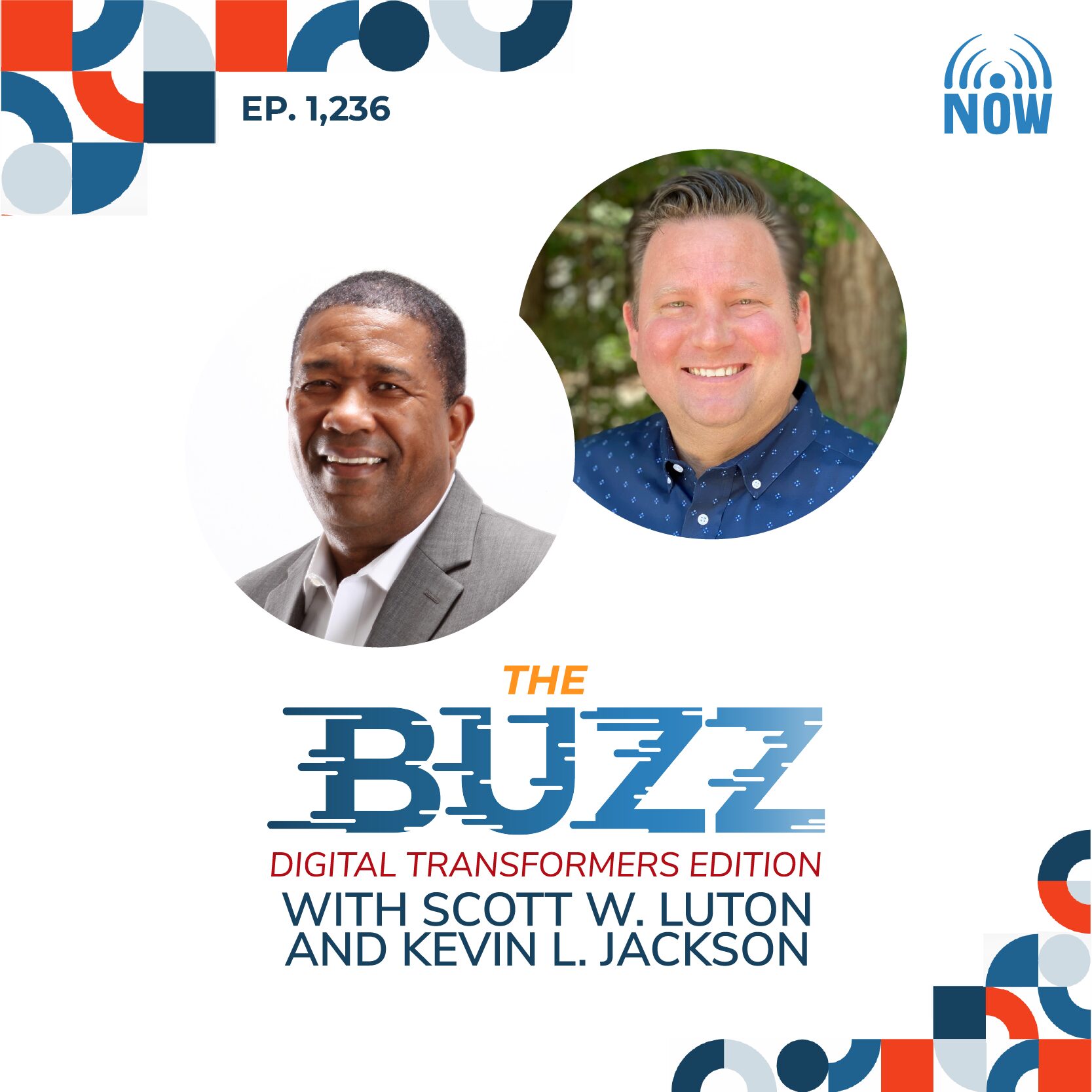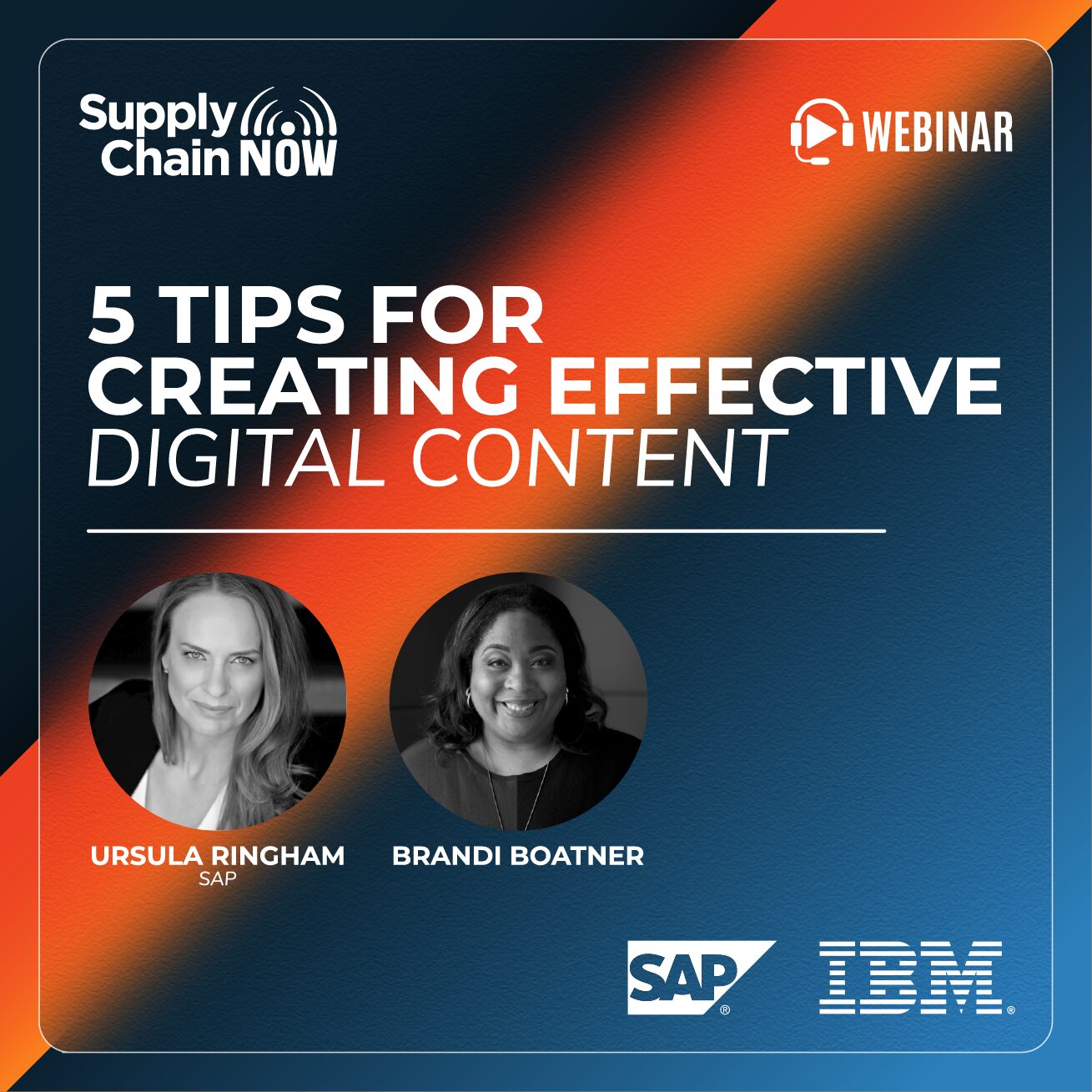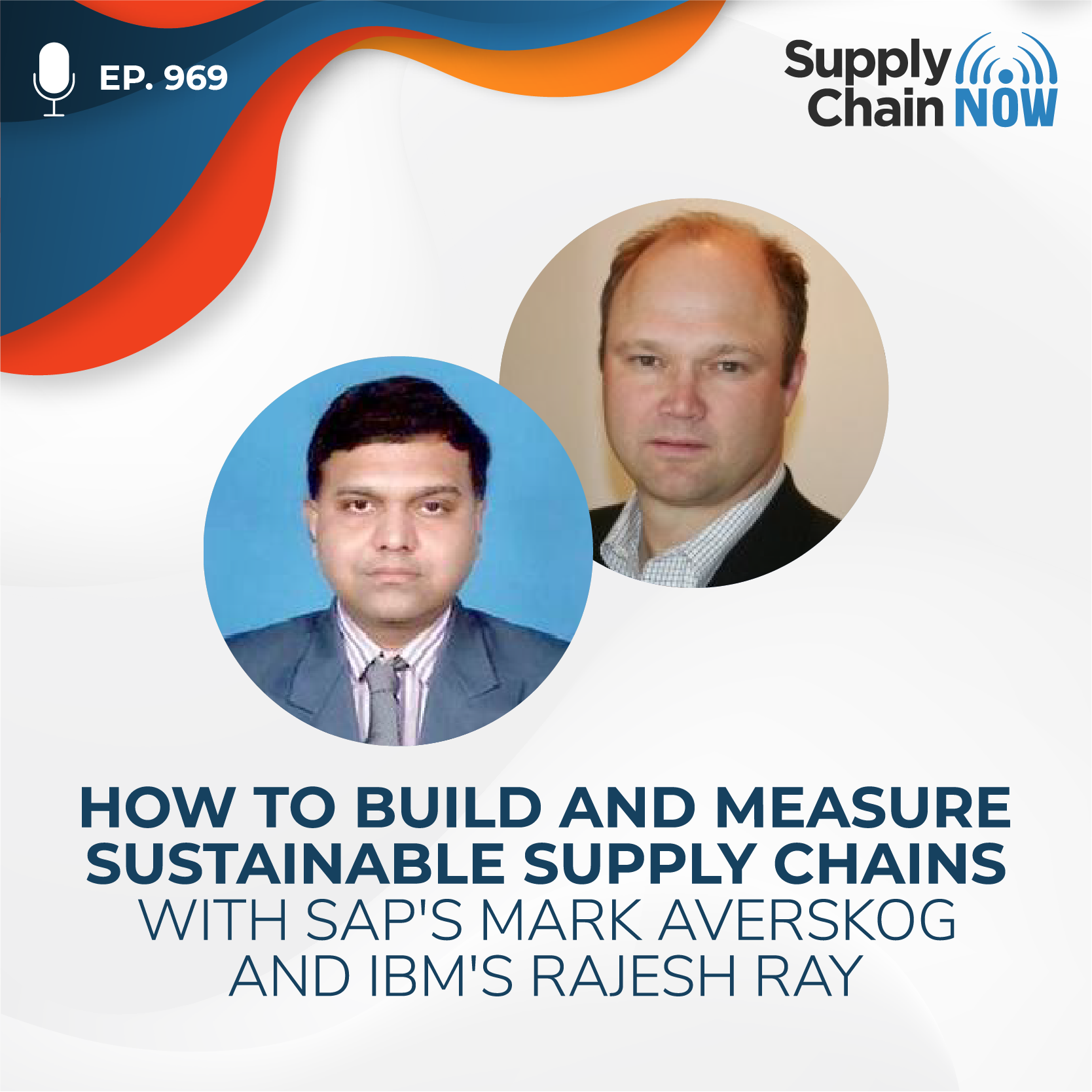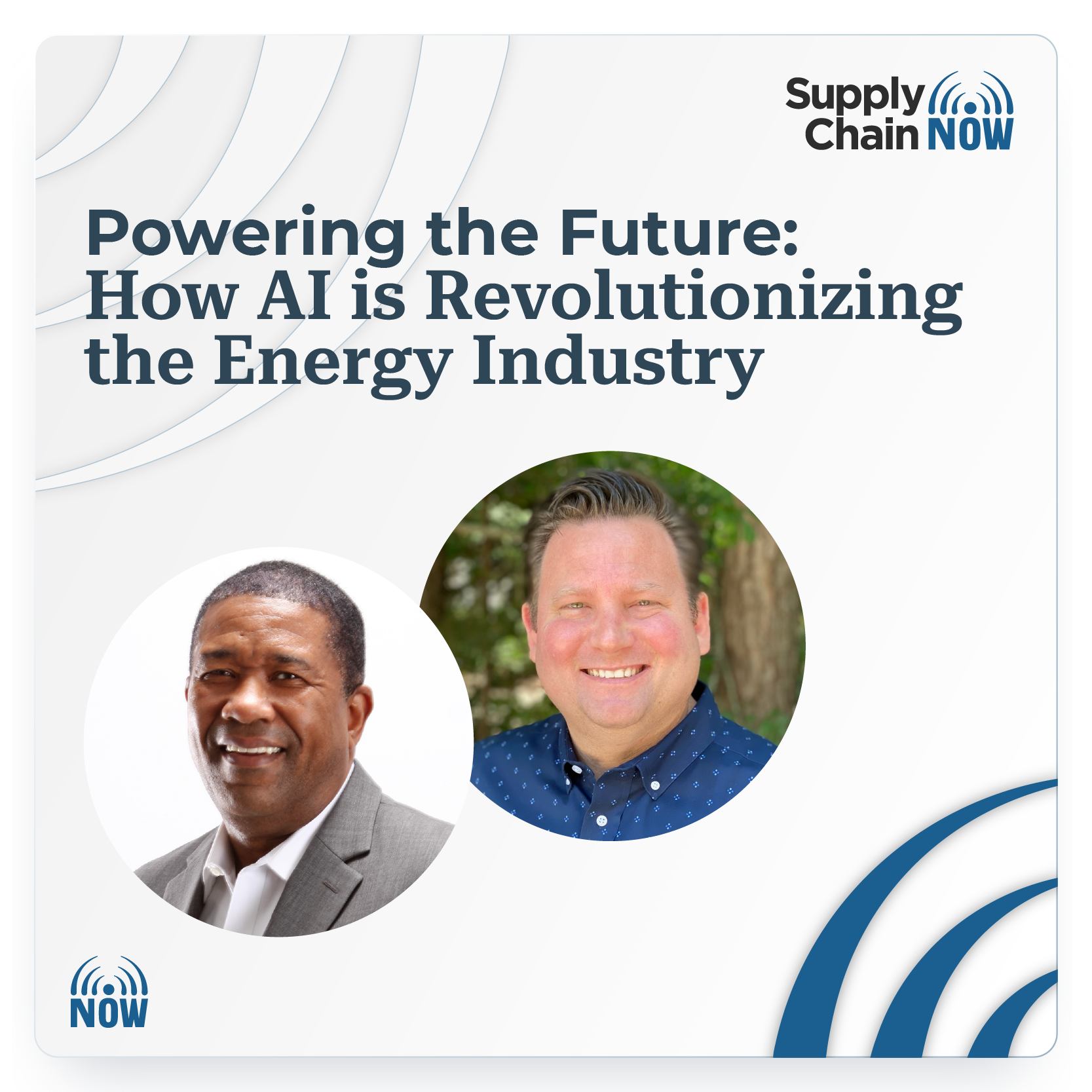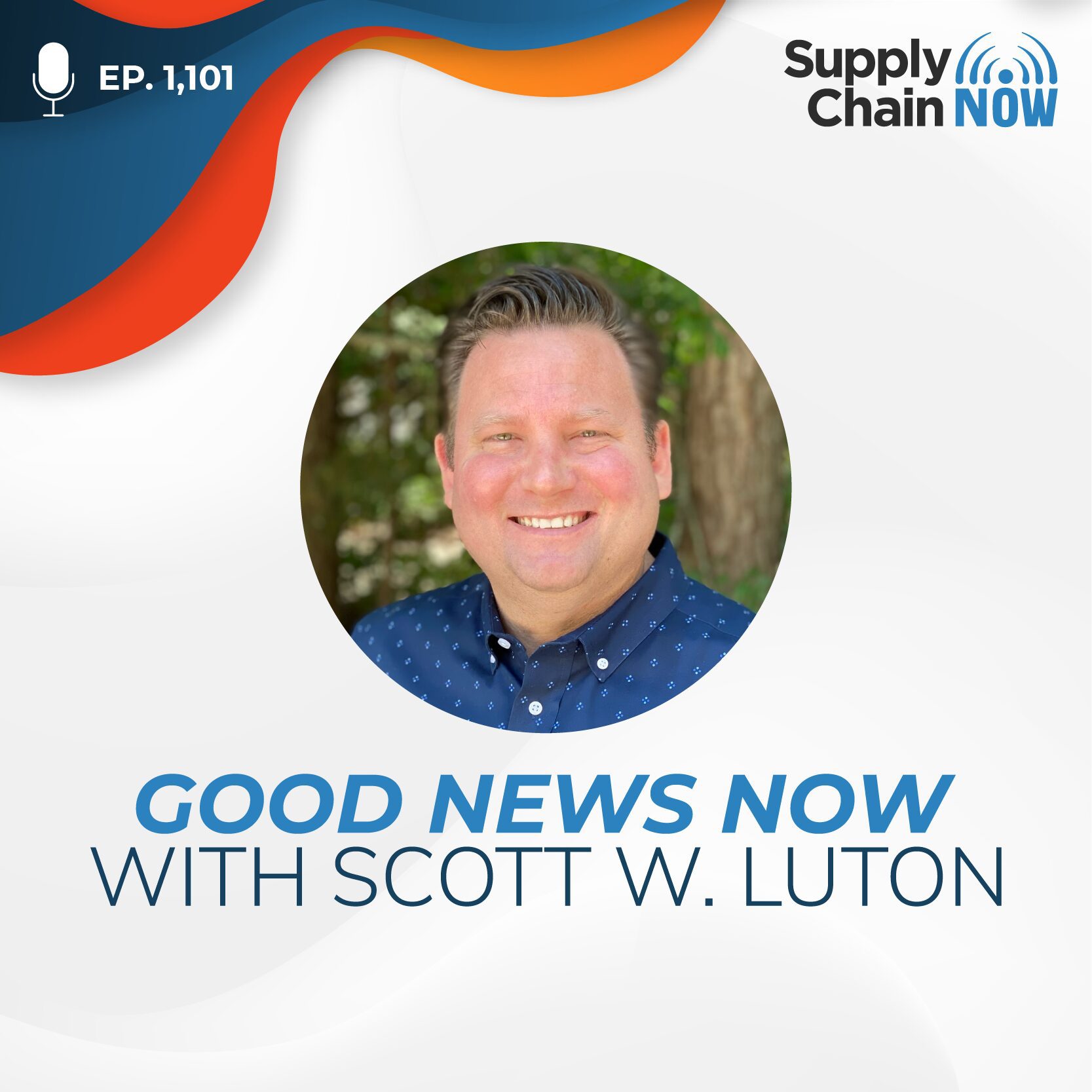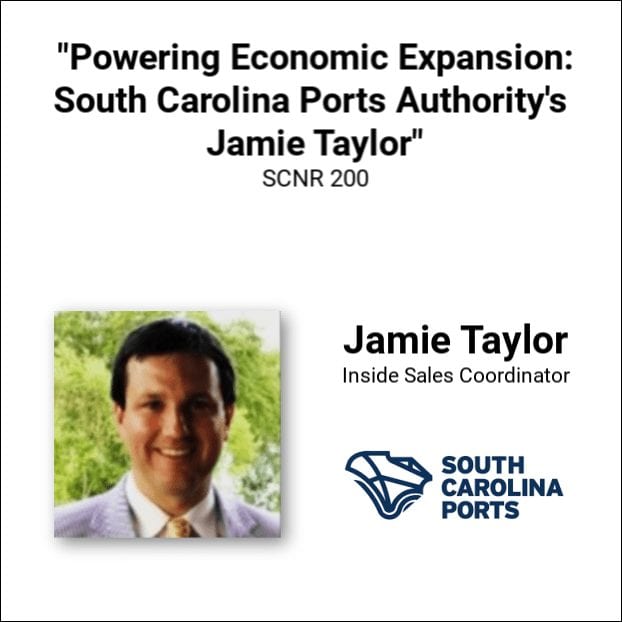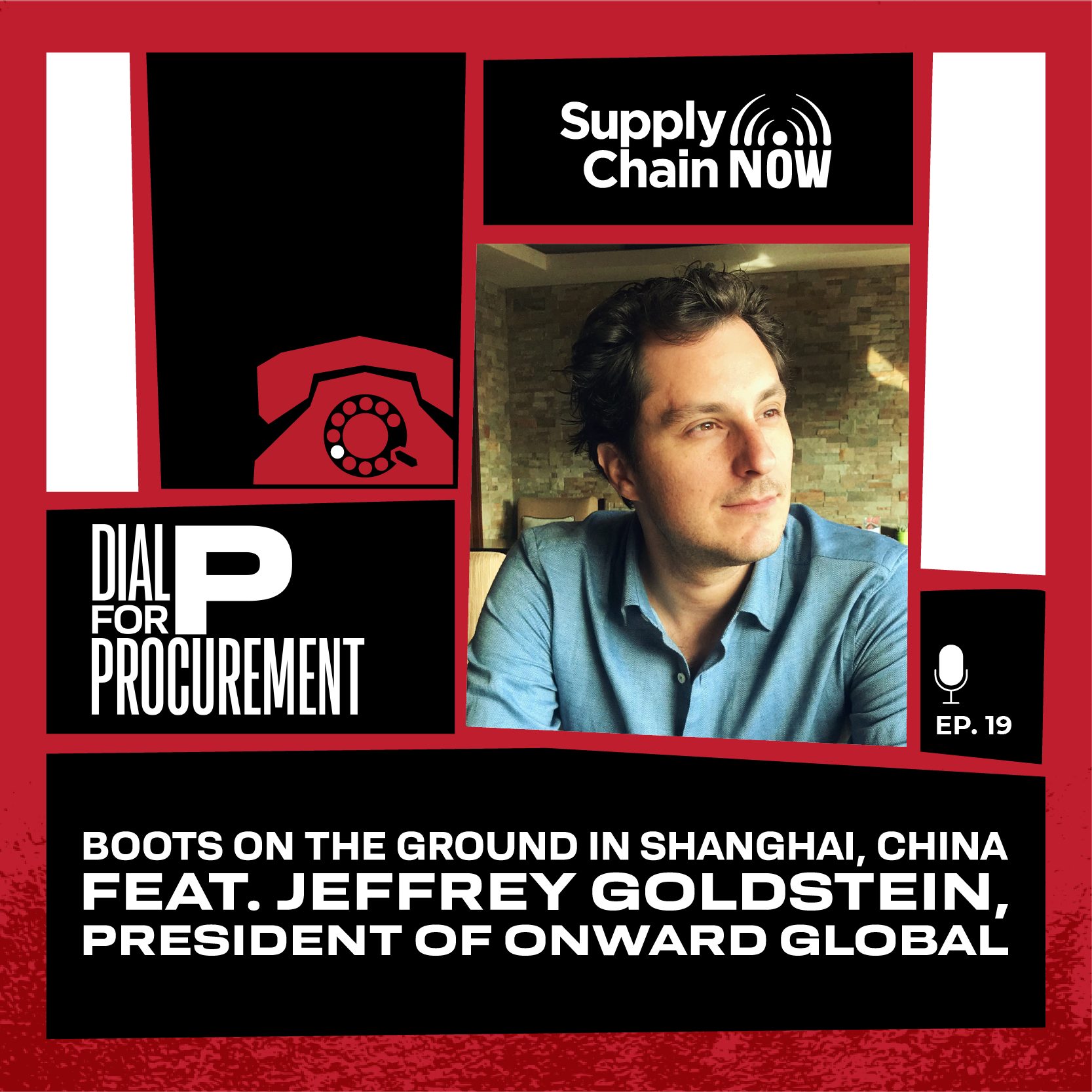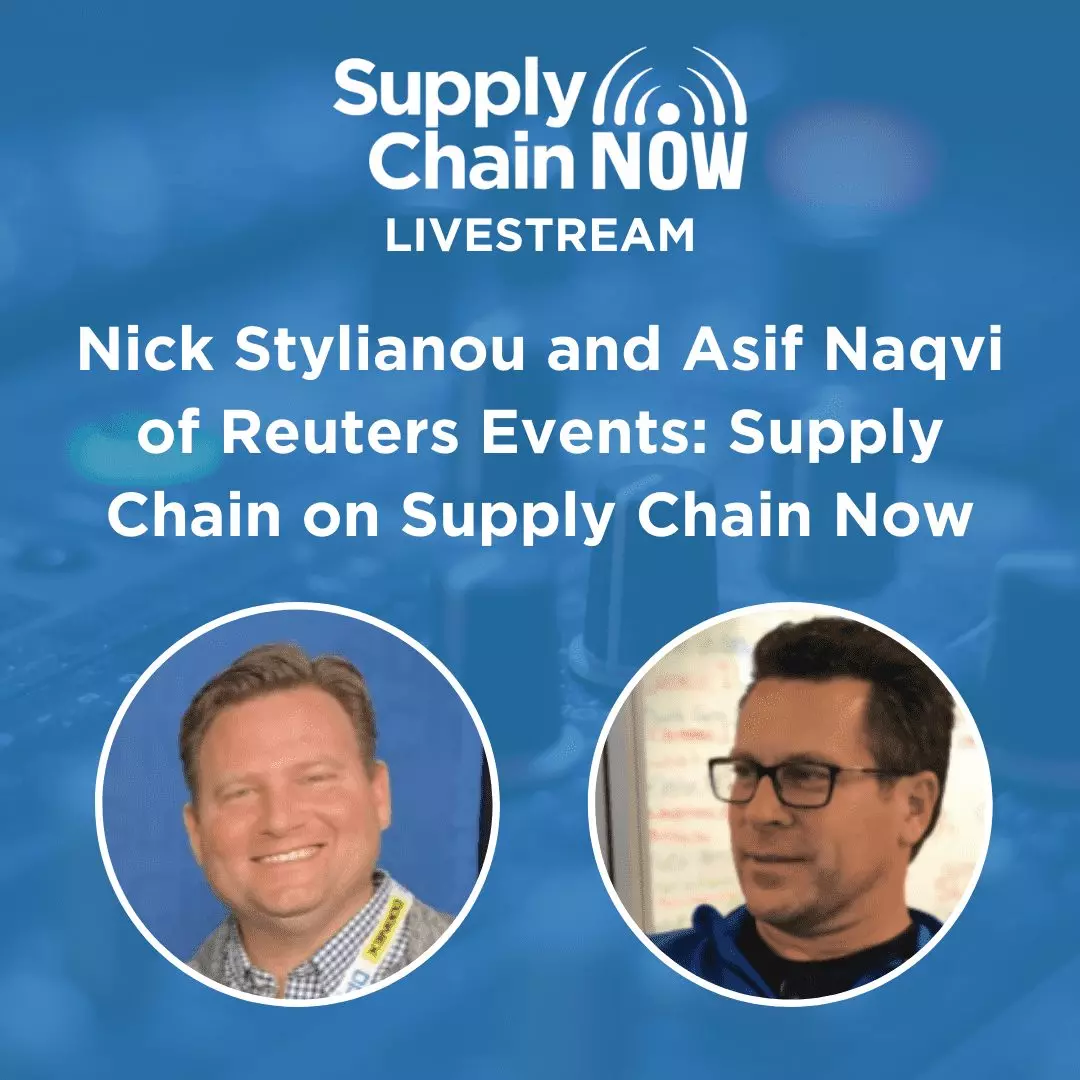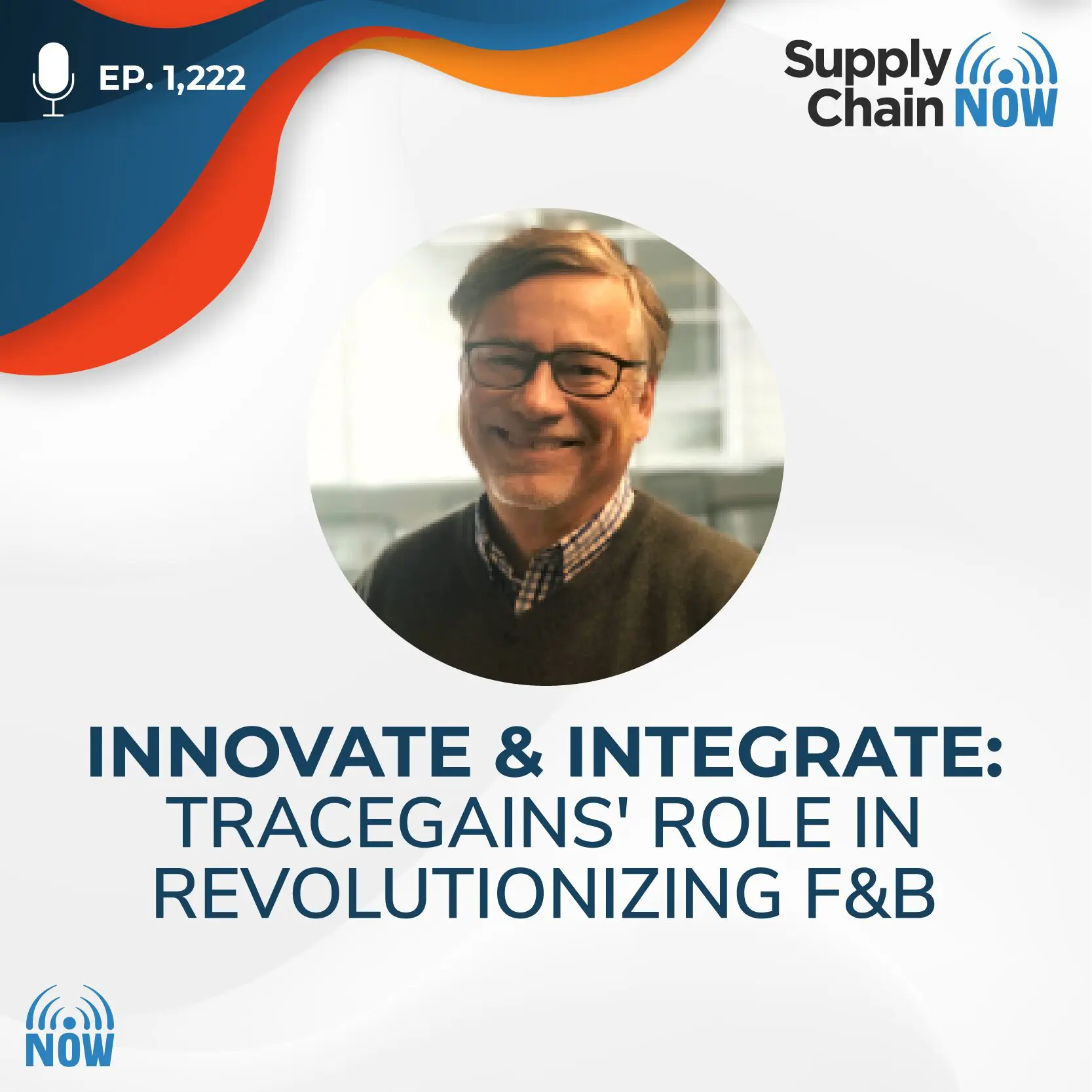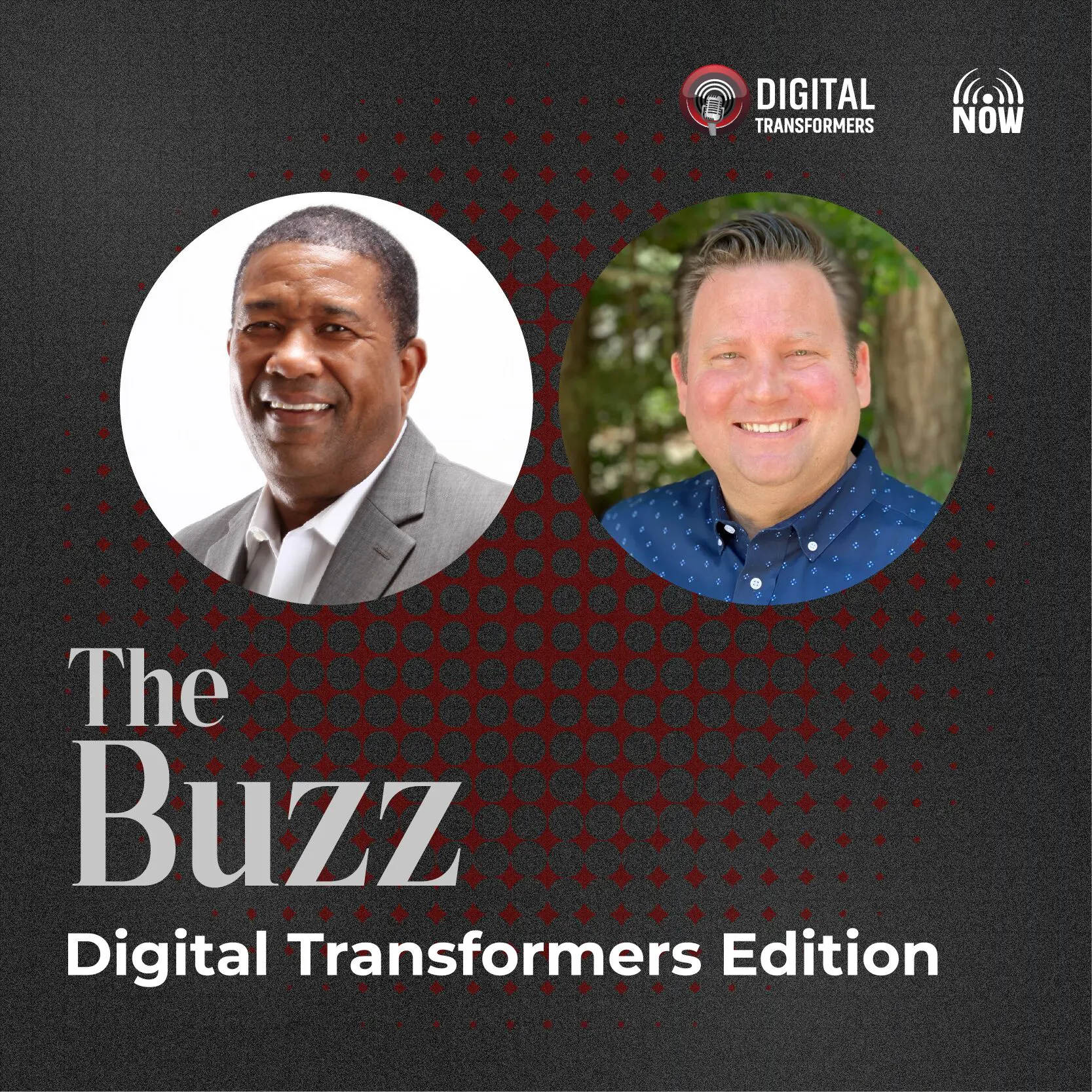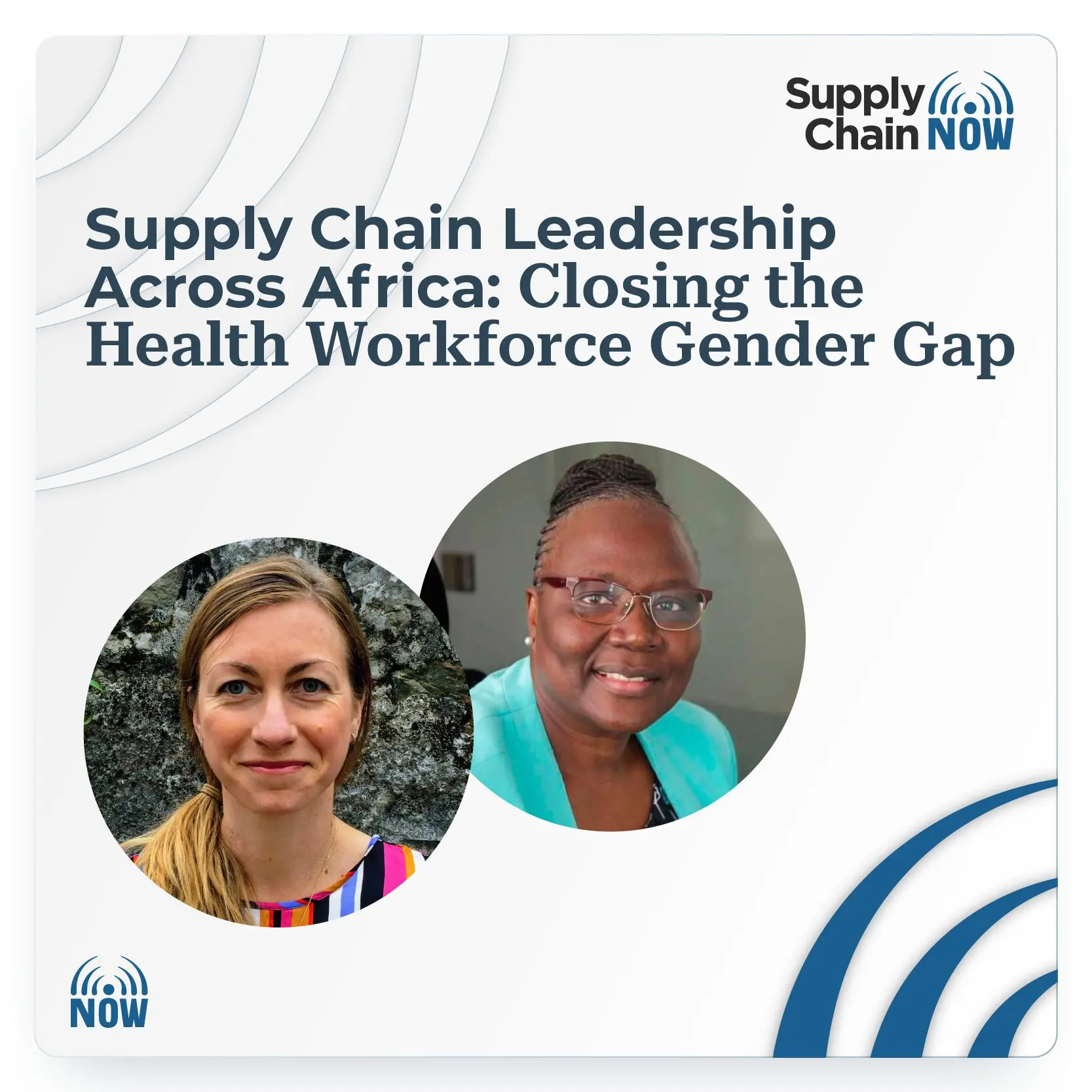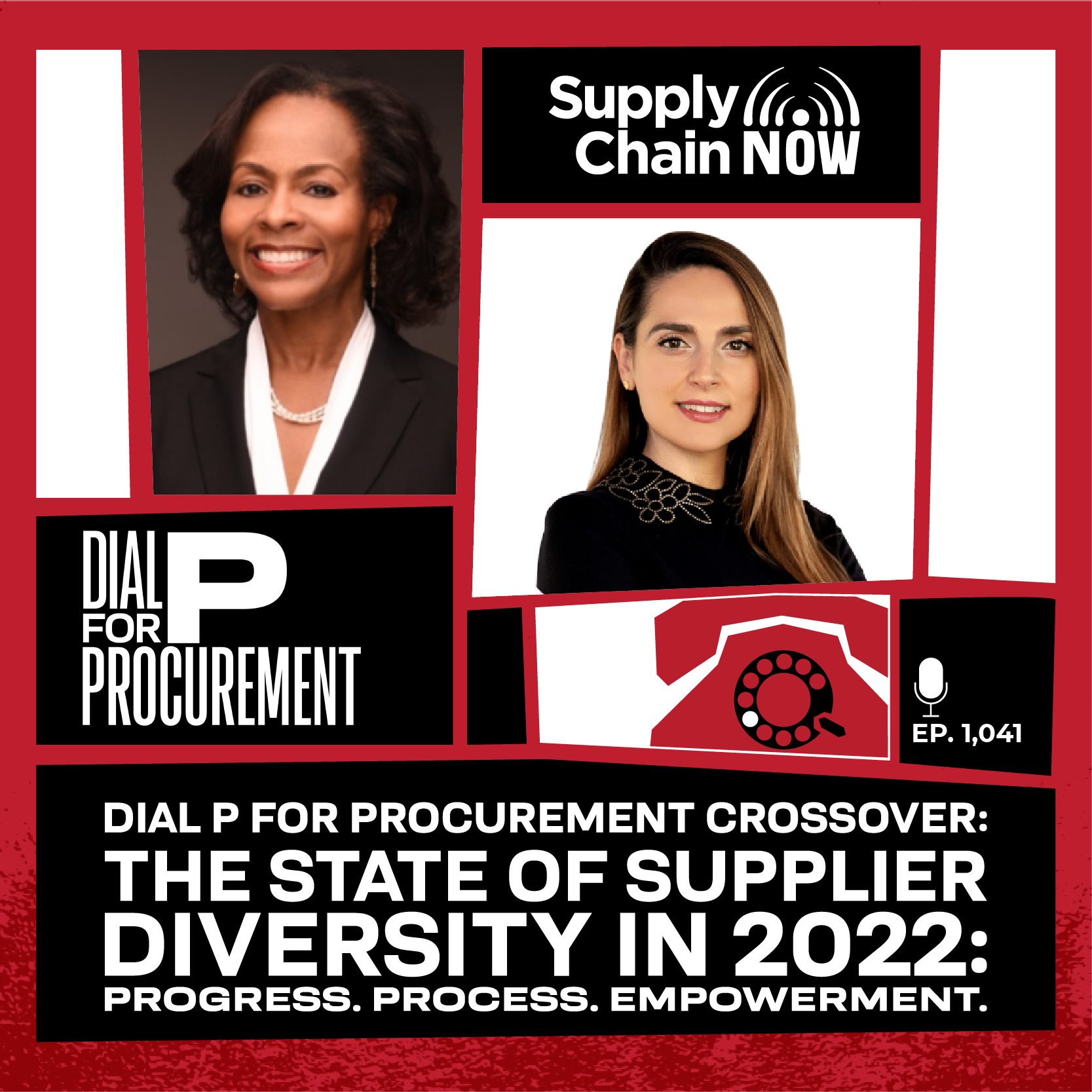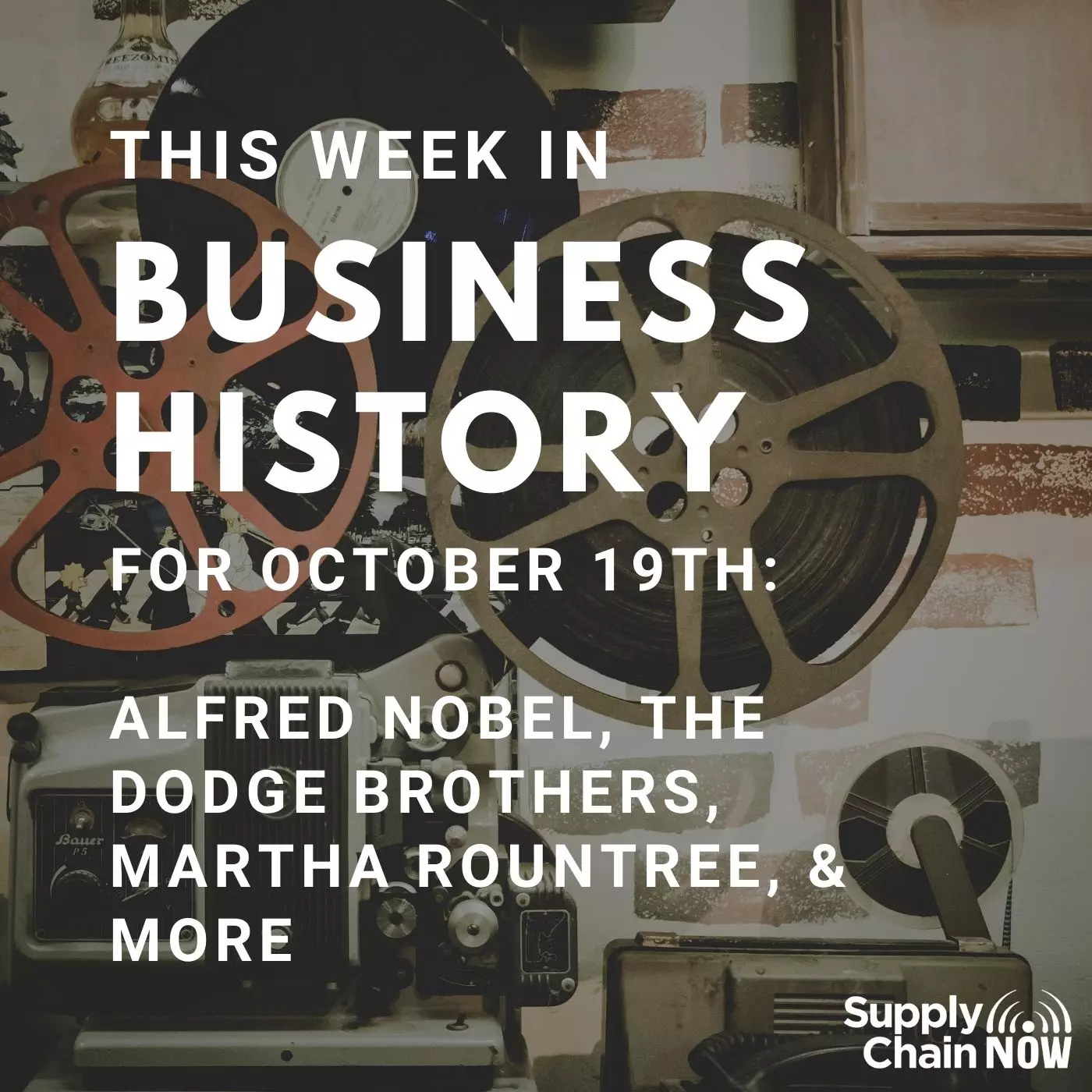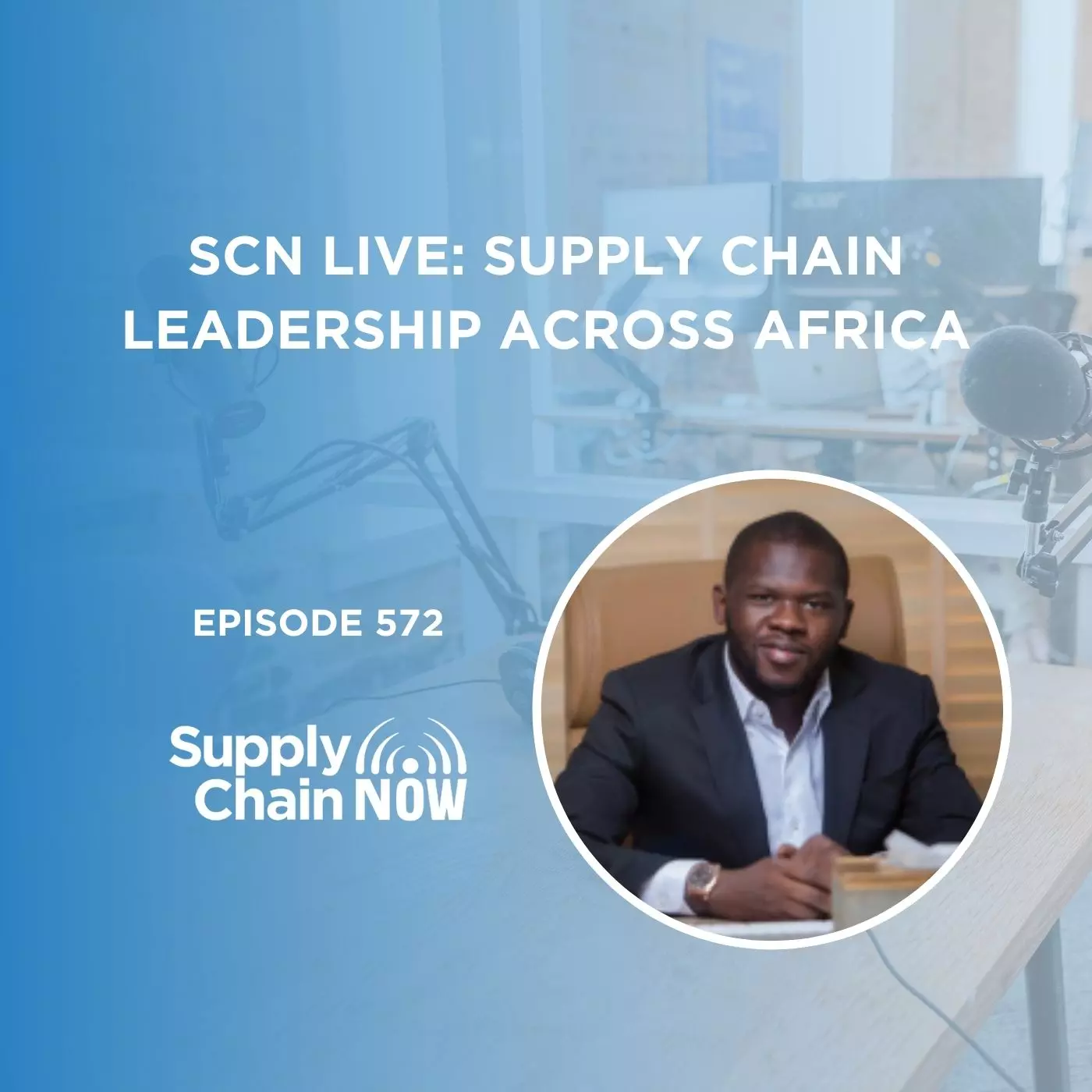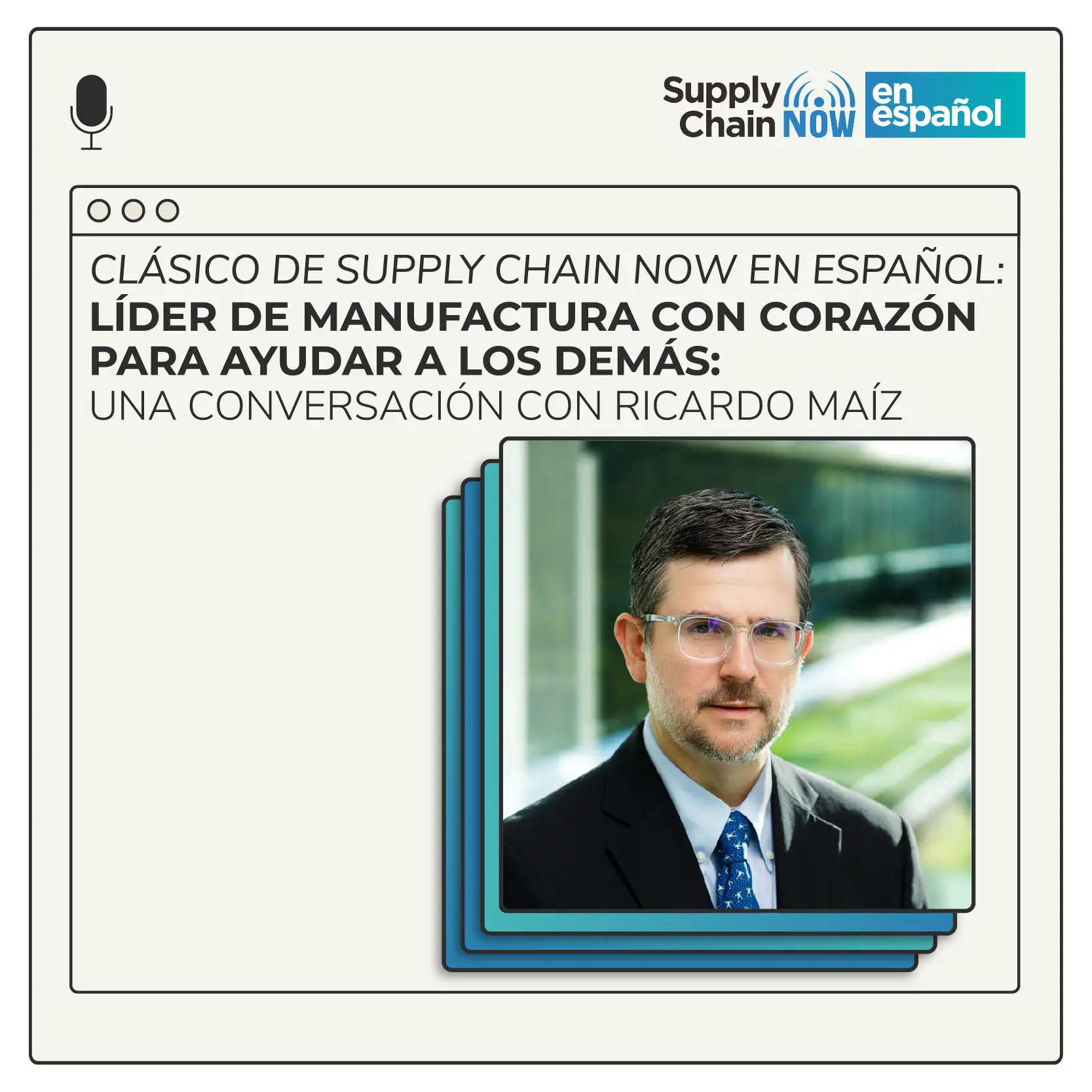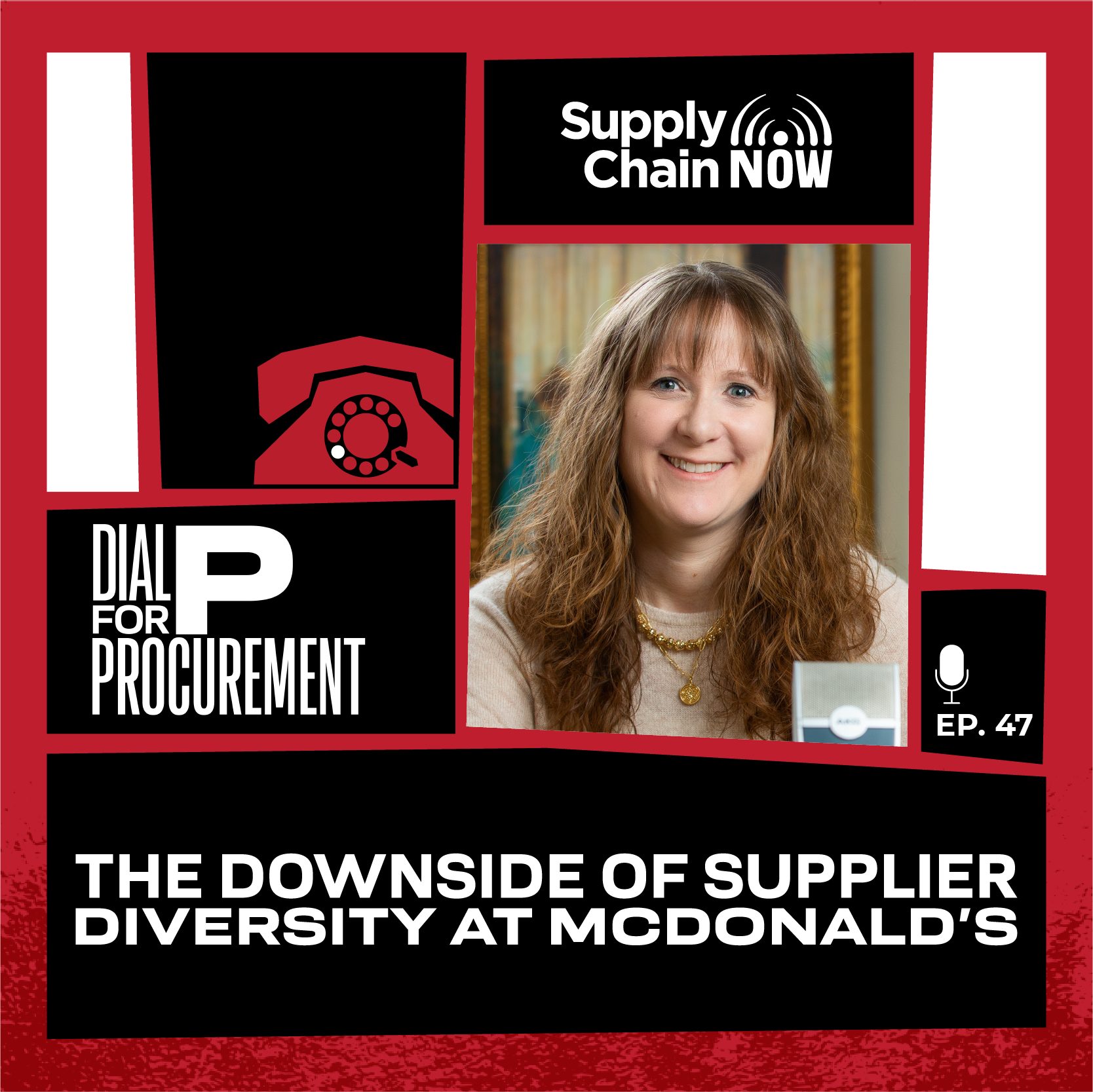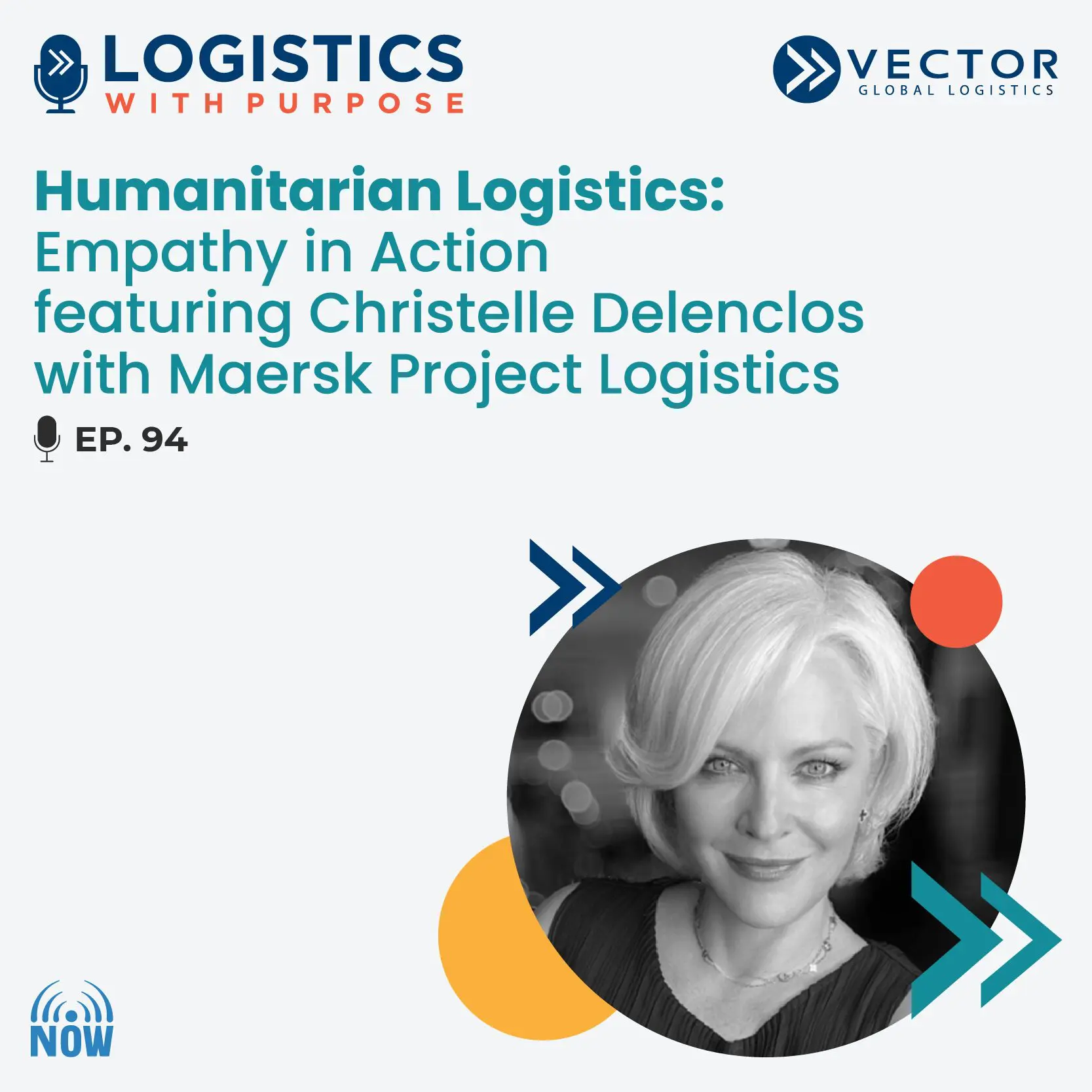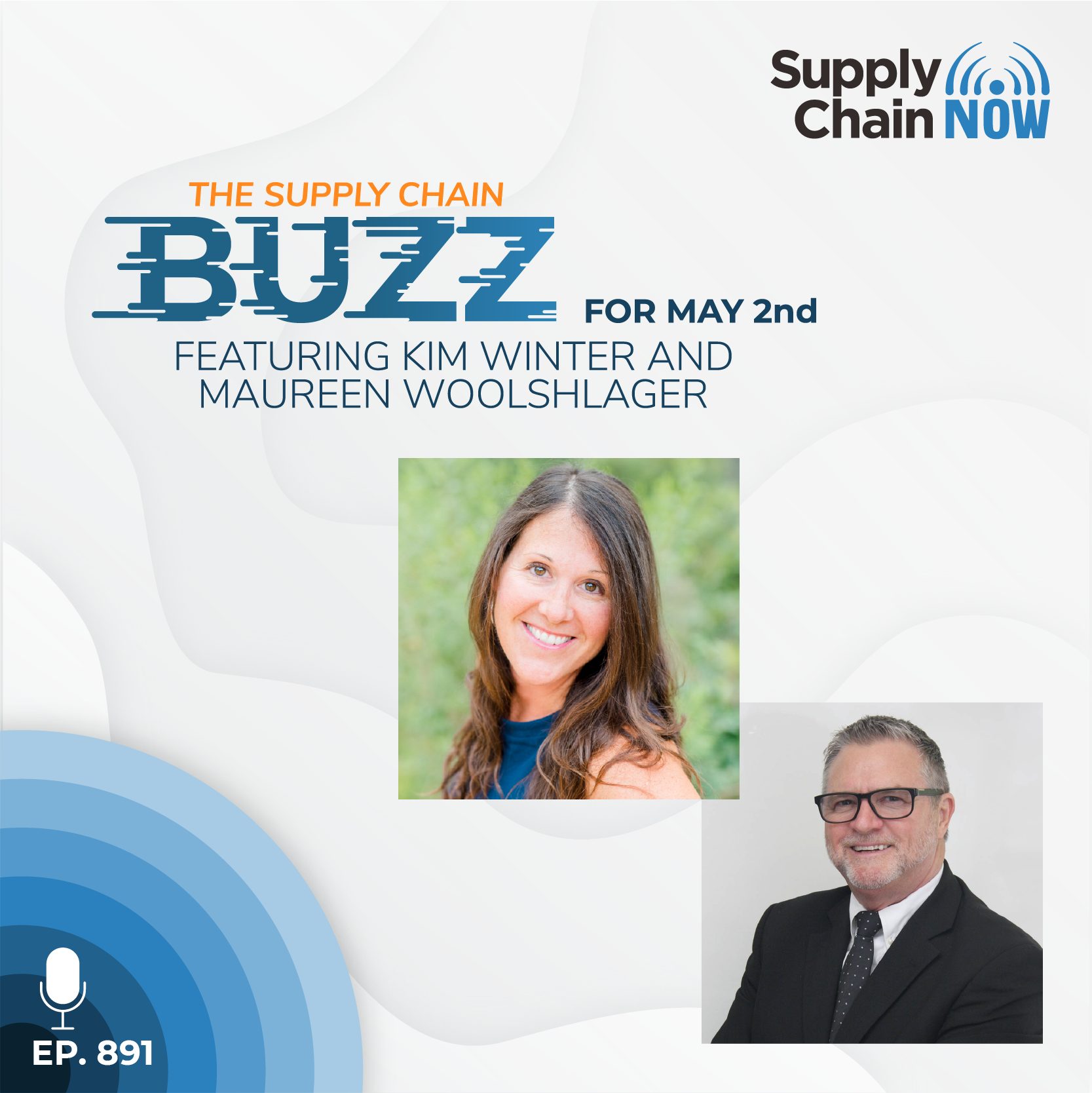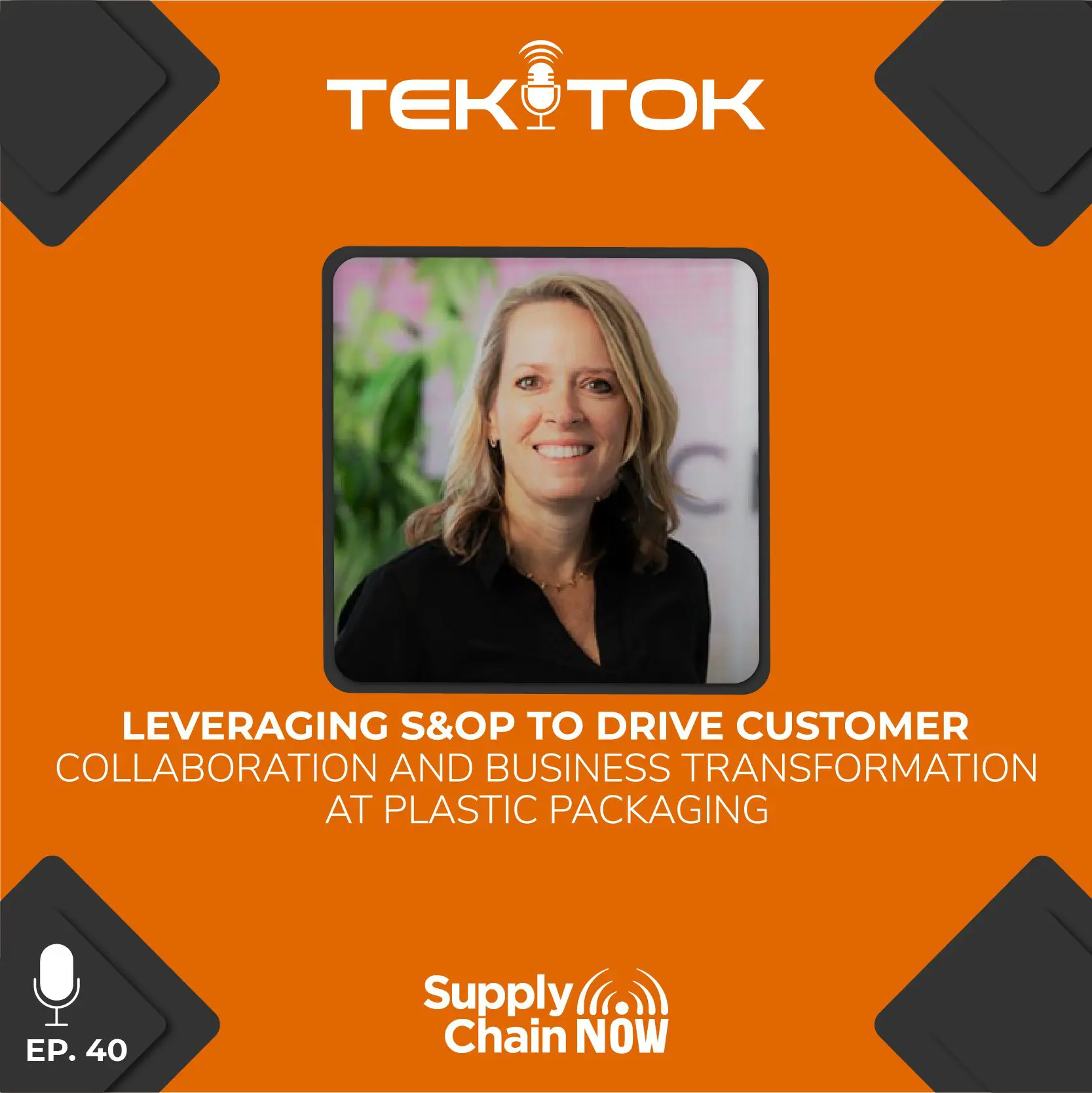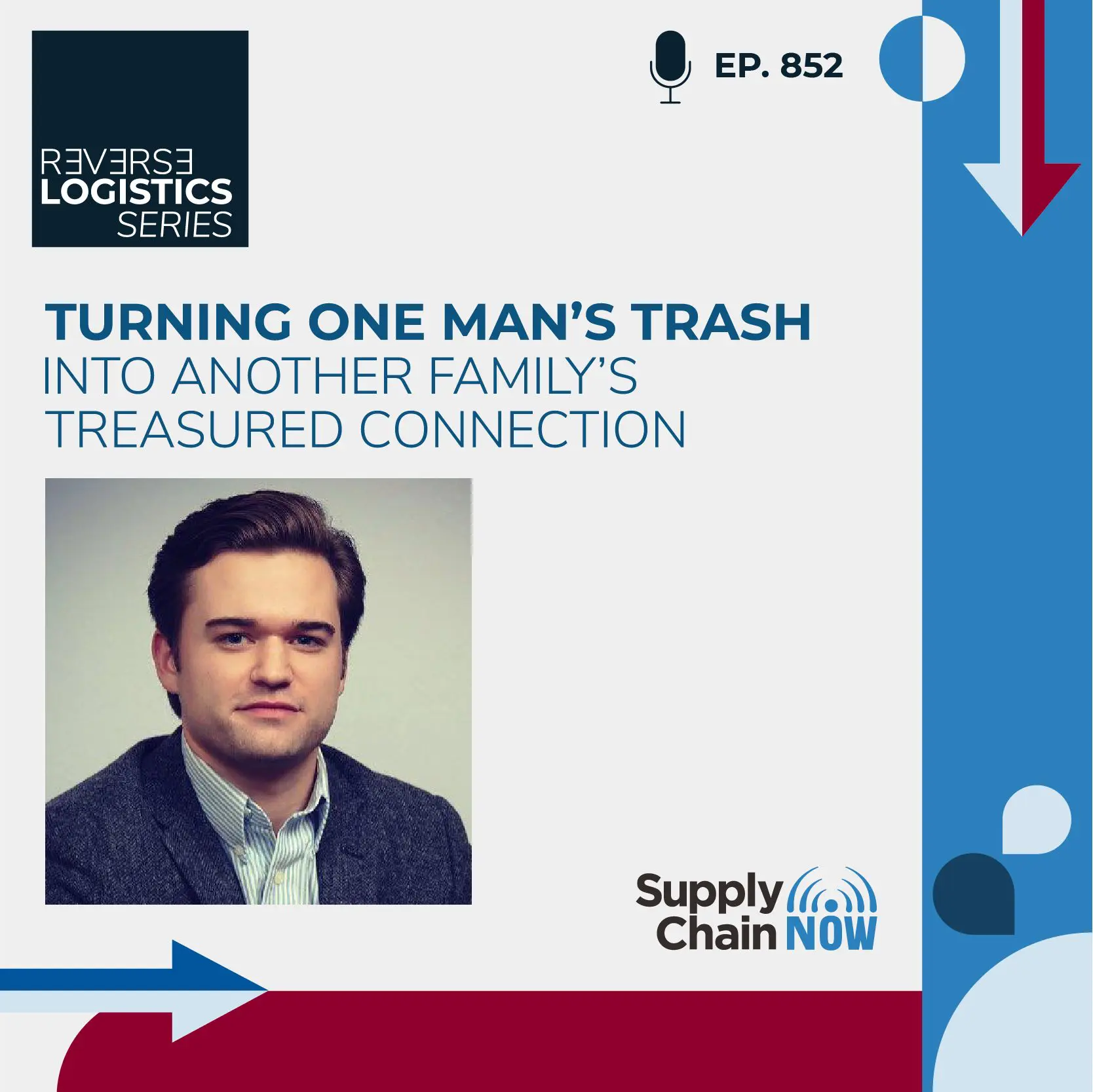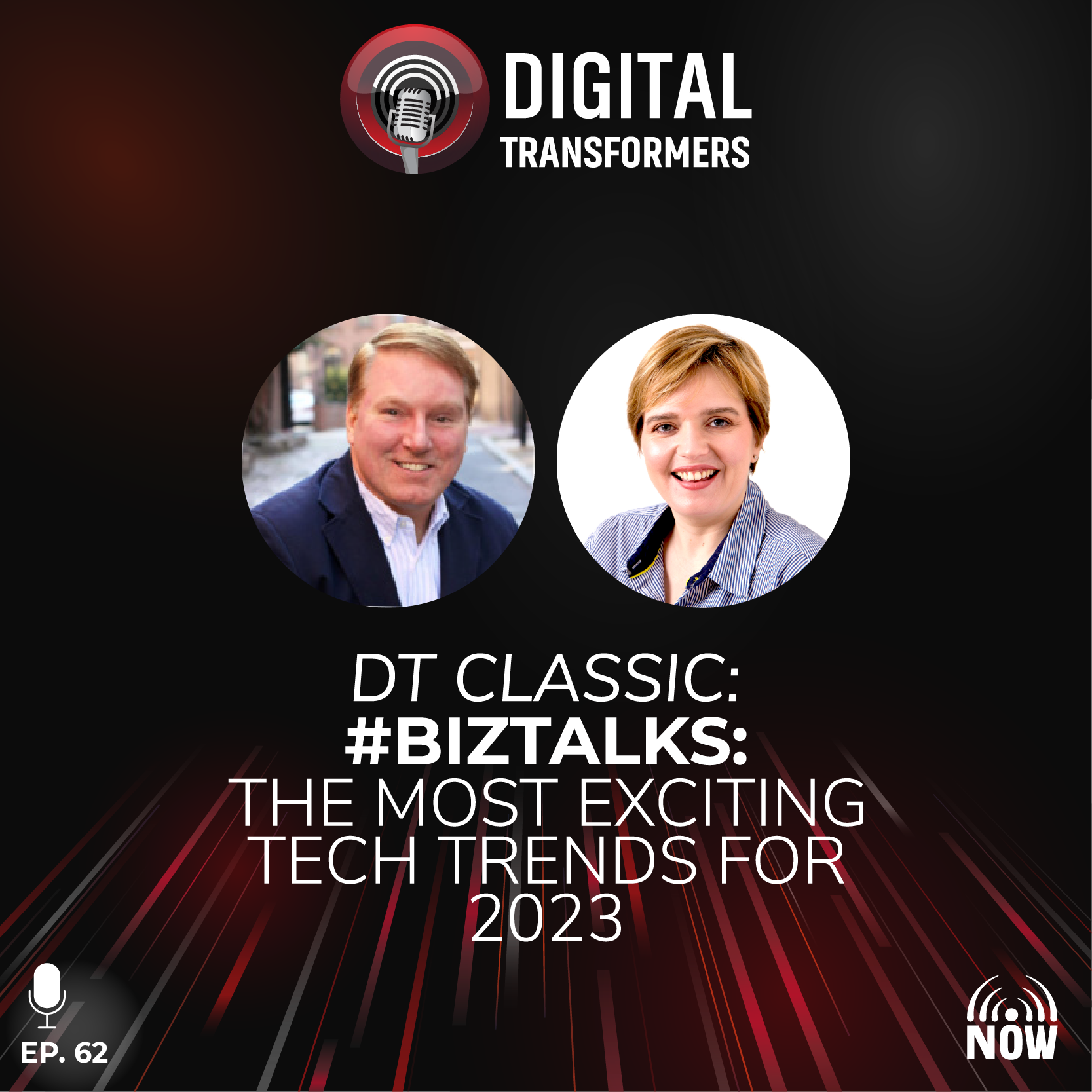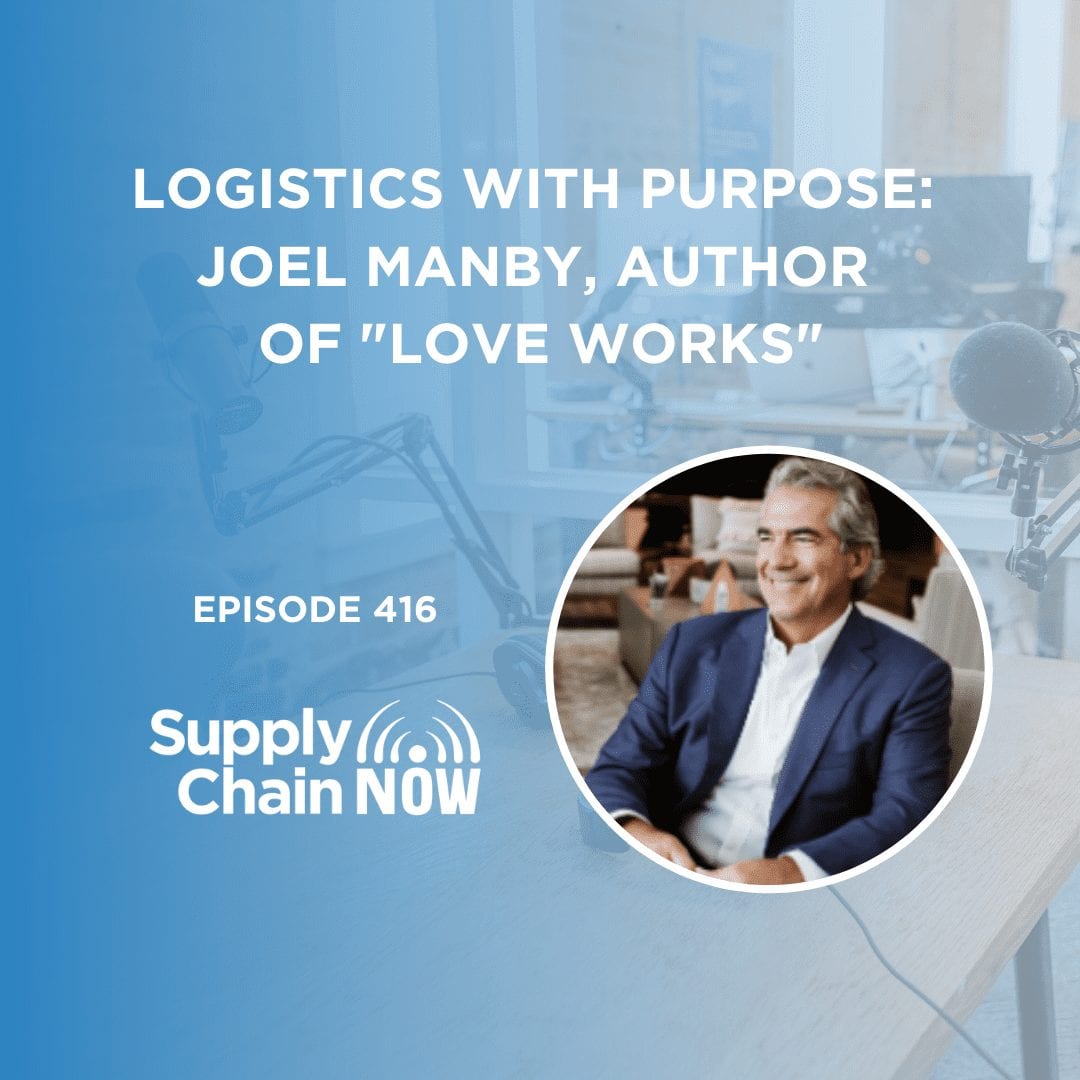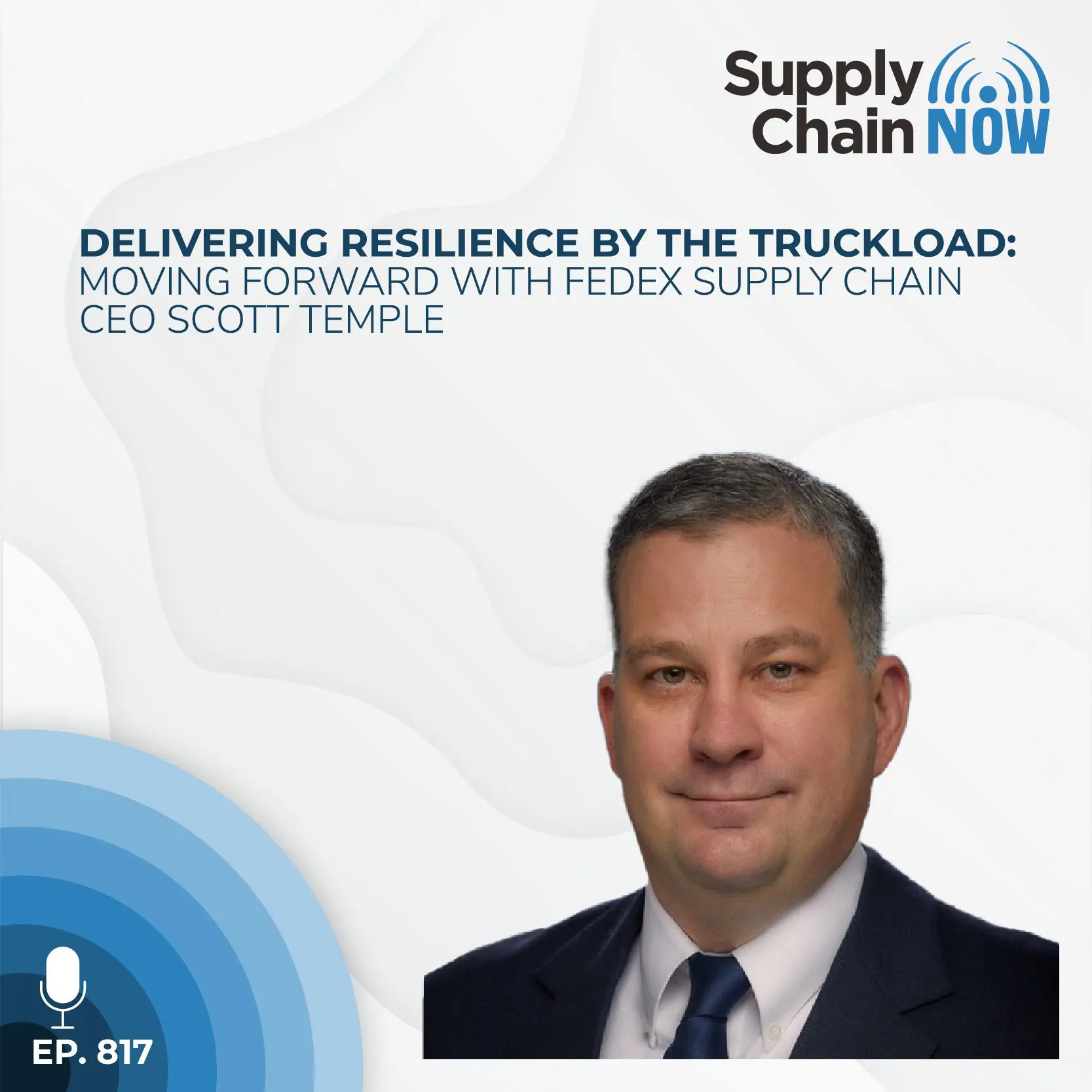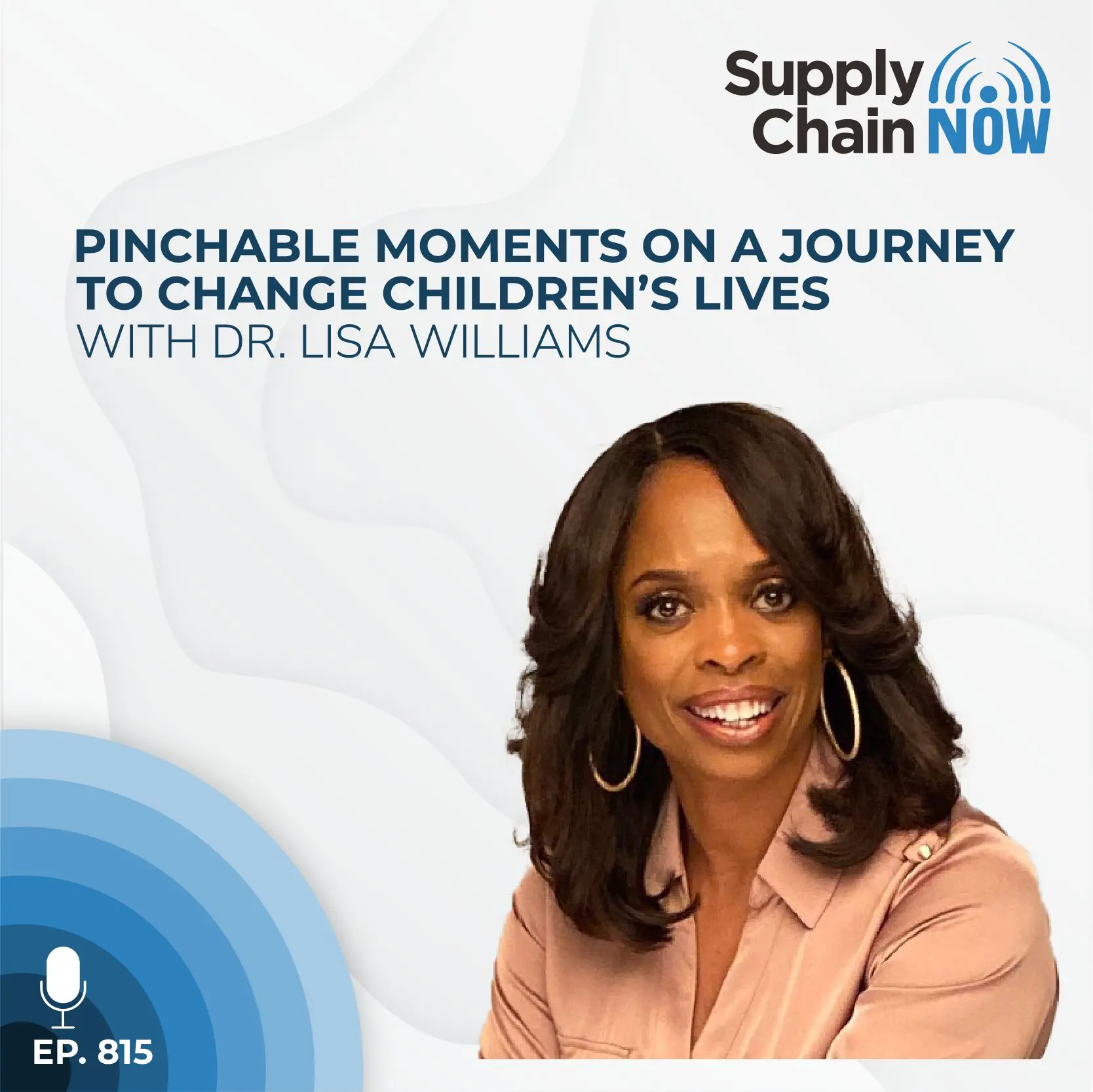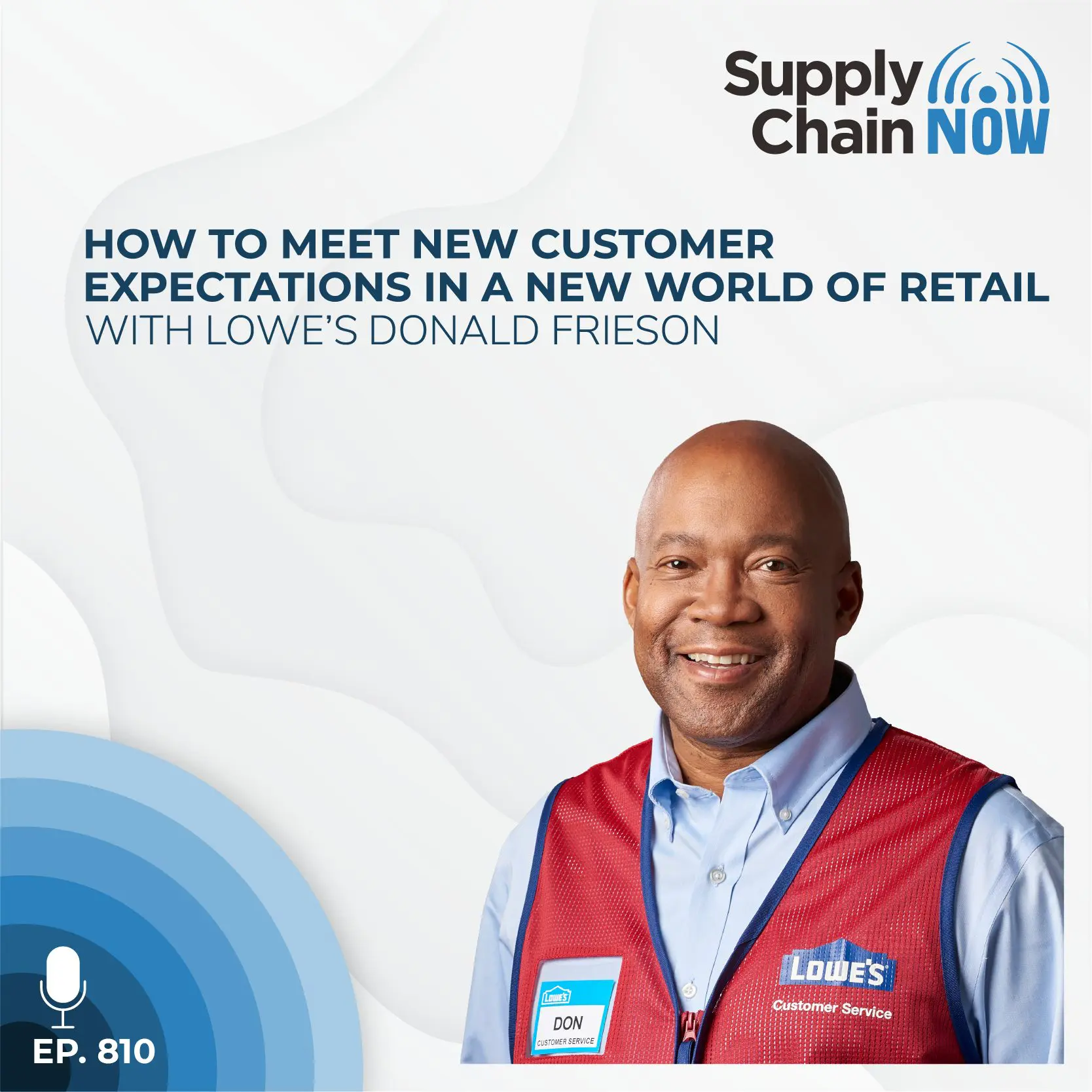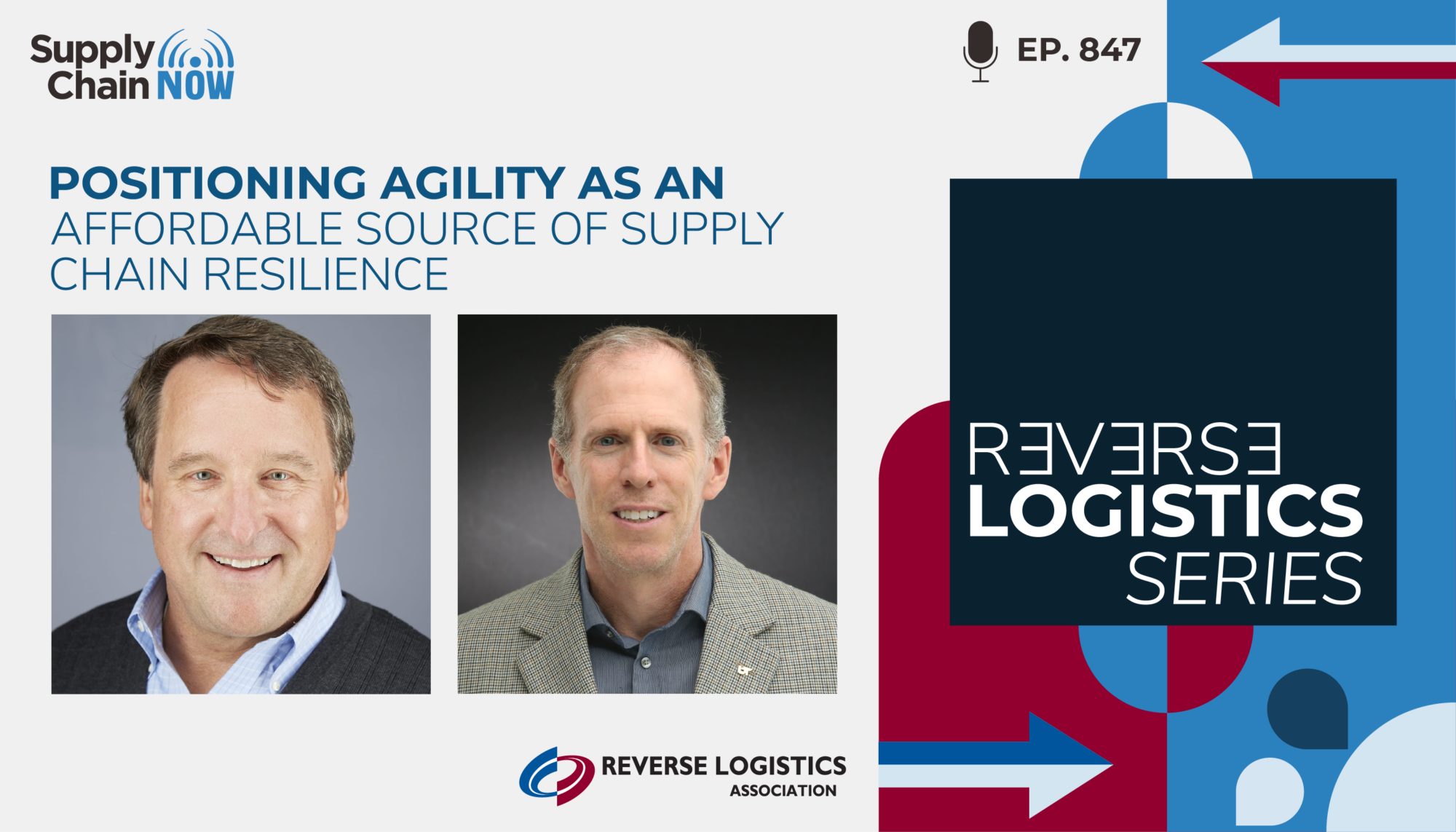
There was one thing that made this disruption so different: the magnitude that you alluded to, but also the ubiquity, right? All of us were in it together, and so figuring out creative solutions was imperative.
-Tom Goldsby, Dee & Jimmy Haslam Chair in Logistics at Haslam College of Business at the University of Tennessee
Episode Summary
This episode was recorded at the 18th annual Reverse Logistics Association Conference and Expo in Las Vegas, the center returns management, reverse logistics, and more.Host Scott Luton was joined by Alan Amling, Distinguished Fellow at the University of Tennessee Supply Chain Institute, and Tom Goldsby, Dee & Jimmy Haslam Chair in Logistics at Haslam College of Business at the University of Tennessee.In this conversation, Scott, Alan, and Tom talk about what they see going on in supply chain – from upcoming talent to academic interests:• The flood of new perspectives and new capital coming into the supply chain startup space as a result of the spotlight shone on it during the pandemic• How the natural tendencies of each generation – from digital nativity to an emphasis on the importance of ESG – fuel the evolution of legacy operational strategies• The research and modeling they are doing to better understand the costs and challenges of final mile delivery and how it can be improved
Episode Transcript
Intro/Outro (00:03):
Welcome to supply chain. Now the voice of global supply chain supply chain now focuses on the best in the business for our worldwide audience, the people, the technologies, the best practices, and today’s critical issues. The challenges and entities Stay tuned to hear from those making global business happen right here on supply chain now,
Scott Luton (00:33):
Hey, good morning, everybody. Scott Luton here with supply chain. Now, welcome to today’s show we’re back here with a couple dear friends here in Vegas, as we’re continuing our coverage of the 18th annual reverse logistics association conference and expo. That’s a mouthful, right? Uh, but it is the center of universe for all things, reverse logistics and returns management. So on that note, as we continue all these shows here, I’m joined by a couple of fantastic featured guests. The dynamic duo I’ve got Alan Amling, Tom Goldsby will be both with the university of Tennessee and then some, so a Tom, how we doing? Doing
Alan Amling (01:08):
Great. Doing fantastic. Thanks for having us on come.
Scott Luton (01:10):
Wonderful. So, Tom, I don’t know if you knew this as Alan came over earlier, it dawned on me that you were on either episode two or three of supply chain now, way back then. How about that?
Alan Amling (01:21):
That’s right. That’s thank congratulations on your success.
Scott Luton (01:25):
Well, I appreciate that as, as I, as I shared, no one cares about those pod podcast numbers except the podcast host and we’re I think 8, 8 23, wow. 8 28 now. So it’s been an incredible journey and, but, you know, great guest, great show. And Alan, you brought it then and, and you’re gonna bring it today and you brought a friend and a partner.
Alan Amling (01:46):
Oh, absolutely. Tom’s awesome. One of the, one of the best in supply chains. So
Tom Goldsby (01:51):
I think I should just step off right now, downhill from here. Right. So
Scott Luton (01:55):
Doesn’t get any better. Does that one of the best in supply chain, does that come with a championship belt?
Tom Goldsby (02:00):
Really? Should I really, did you pack the belt? Did you bring it to Vegas?
Alan Amling (02:04):
I did. As a matter of fact, we’re gonna need to break it out Rick
Scott Luton (02:07):
Player. Well, obviously, and, and I know that you’re doing things beyond university of Tennessee, but that is such a, an incredible organization. That means a lot in global supply chain. Right? Turns out a lot of talent that’s changing the industry for the better, right?
Alan Amling (02:20):
Yeah, no, absolutely. You know, one of the things that attracted me to a university of Tennessee is they do a lot of focus on applied research, right. Research that companies that, that are struggling right now care about. Right. And so it’s been fantastic. Yeah.
Tom Goldsby (02:39):
Outstanding. Something else. That’s really cool about being at the university of Tennessee’s got, if you can believe it, it supply chain management is the largest major in the UT system. Really? Yeah. We have, uh, a last count of a 1400 undergraduate students. I think it’s probably closer to 1600. Now that the world knows a little something about supply chain in this, this COVID era. But also we host a multitude of masters programs and executive programs as well as the PhD program.
Scott Luton (03:07):
Yeah. Outstanding. So supply chain is indeed. Cool. Now it’s
Tom Goldsby (03:10):
Very cool. And uh, we’re, we’re trying to make it cooler. Love it possible.
Scott Luton (03:14):
Well, let’s, let’s dive in some of that and we are, we’re gonna talk, we’re gonna pick their brain on what’s going on in the industry, but before we get there, I wanna get to know y’all both a little bit better and share with you with our listeners. So Al wanna start with you. Okay. Tell us where you grew up.
Alan Amling (03:28):
So I grew up in a small town in Southern Oregon, about 12,000 people. It’s called grants pass. Okay. And, uh, it’s got one of the top steelhead river in the country called the rogue river flows right through the middle of town. Yeah. I was able to, to get from my house to the river in five minutes, like
Scott Luton (03:48):
Tom
Alan Amling (03:48):
Sawyer, Tom Sawyer. And I didn’t realize at the time just how precious that was. Mm. So loved
Scott Luton (03:56):
It. Yeah. You’re the first person from Grant’s pass on the show. So had a plaque
Alan Amling (04:02):
Back there. Bet. Very go.
Scott Luton (04:05):
All right. So Tom, how about you?
Tom Goldsby (04:06):
I am a H from near French lick, uh, Indiana. That’s one. Indiana’s my hometown. Okay. And, uh, French lick Indiana. There was a famous resident, uh, played basketball some years back may have heard of him, but also about equidistant in the other direction is John Mellencamp, small towns, Indiana. So I grew up kind of equi distant between those two places in Mitchell, Indiana.
Scott Luton (04:27):
Outstanding. Formally John Cooper, Mellencamp,
Tom Goldsby (04:30):
Johnny Cooper, Mellencamp. That’s right. Yeah. He, he’s not so fond of that,
Tom Goldsby (04:34):
But
Tom Goldsby (04:34):
Yeah. A label he had for time.
Scott Luton (04:36):
Yeah. And of course, labor to one and only from French lick Indiana. Is he still, I think he’s still involved with the, with the Pacers. Okay.
Tom Goldsby (04:43):
Right. Yeah. I think he’s in the organization. Is he, you know, no longer coaching might. I don’t think he’s president, but he’s at least consulting. I think he’s spent some time in Indy. Awesome.
Scott Luton (04:52):
Right. So we’re, that’s gonna be a great segue. It’s like you read my mind cause I want, I want to get from both of you, your favorite sports team of all time and to, I’m gonna stick with
Tom Goldsby (05:01):
Oh wow. That’s a, that’s a tough one to pick out a singular certainly was a big fan of the Larry Bird Celtics. Yep. And also the Reggie Miller Pacers. All right. But before that, it was probably the big red machine, the Cincinnati reds of the mid, mid to late seventies, uh, that, uh, they were just unstoppable.
Scott Luton (05:17):
Yes, they were. They sure were big red machine. Uh, Pete rose is only
Tom Goldsby (05:22):
Rights. Uh, Dave conception, uh oh,
Alan Amling (05:24):
Fantastic.
Tom Goldsby (05:25):
Yeah. Yeah. Griffy on and on and on UN Johnny bench. Yeah, yeah, yeah.
Scott Luton (05:29):
Johnny bench, uh, can, but they have, he can like hold five baseballs in one hand or something. Ridiculous
Tom Goldsby (05:36):
Of that. Yeah. Yeah. It’s ridiculous. And dunk with it.
Scott Luton (05:40):
All right. So a that’s gonna be a tough one to top.
Alan Amling (05:42):
Yeah. I’m gonna go with the bad news bears. No, actually I would say kind of that late seventies era Steelers group with, uh, Bradshaw and Harris Lynn Swan, iron Kirk mean Joe Green. Right. Uh, and my favorite of all time, Jack Lambert, if you’re, so if you’re too young to know who Jack Lambert is, go on YouTube. It’s absolutely awesome. The guy it’s just, he’s just spitting and he is guy missing his front teeth and he pumping his legs.
Tom Goldsby (06:18):
It’s like the same intensity you bring to the classroom. That’s
Alan Amling (06:20):
Right’s that’s
Scott Luton (06:21):
Right. So, you know, what you’re saying is if you look up the word football in the dictionary, it’s got a picture of Jack Lamb.
Alan Amling (06:28):
It’s got to, it’s got to right.
Scott Luton (06:30):
Uh, alright. Those are some outstanding answers. I, I almost want stick with sports for the rest of the time together, but let’s, let’s shift gears. Uh, we’re gonna talk about what y’all been doing with some really exciting projects and, and, and engaging that now generation, which we’re gonna talk about, but let’s talk about lessons learned. Cause 2021 has, has taught us, uh, and has created so truckloads of Eureka moments, uh, and Allen, wanna stick with you here? So name one, gimme one and good Eureka moment for 2021 for you.
Alan Amling (07:00):
So there were, there were a lot, but I would say probably the, just the game changer for me was I call it physical chaos, digital order. And what I mean by that is, so I spent at 27 years at ups. Right. And so everything kind of makes sense. There’s a process, right? There’s a, a process for delivering packages in, uh, Wyoming. That’s the same in Hong Kong. That’s the same in Brussels. Right. And it makes sense in, in our, um, three PL division that I worked at for six years, I understood how everything was, uh, ordered in the, in those, you know, 40 foot racks and, you know, the stuff that turns quicker. It, you know, it’s towards the bottom, it’s closer to the pick station. And, um, and then I see some of the, these eCommerce retailers and stuff is all over the place. And they’ve got, you know, all of these, you know, gig workers and contractors and there some are using employees. And I’m like, I don’t understand that from how I grew up. And my big Eureka moment is I don’t need to understand, to be able to look at something and be able to figure it out. If the technology is attaching some knowledge to a product, you can coordinate it. You can coordinate gig workers, you can coordinate con tractors and what’s happening right now is companies are using that technology to connect disparate assets, disparate partners in ways that are approaching the efficiency of a ups and a, and a FedEx. And it’s absolutely fascinating to me.
Scott Luton (09:01):
Agreed, agreed. It is an intriguing time to be in global supply chain right now. Yeah. And, and, you know, I would add before I, I get your, take your time. One of my favorites and we talk about this to the cows, come home. One of my favorite aspects of the pandemic age has been the innovation that has been driving and it’s gonna make the industry better once we are truly in the post pandemic environment. Right? Yeah. Cause it’s here to stay, whether we like it or not, it’s been a big, common thread about these Eureka moments. Yeah. We’re learning to live and work and succeed and win to some degree with COVID, you know, and treat me stronger and, and truly more resilient, not in the cliche sense, you know, cause everybody’s really wrapped their head around resiliency and every title and book and you name it, but in true practical sense. Um, right. So that’s a great starting point, Alan. Thank you very much. Uh, Tom Eureka moment, 2021. Yeah. I’d
Tom Goldsby (09:54):
Say 2021. One was marked as a year in which my two college age kids stopped referring to logistics and supply chain management. And for those of you listening, I’m using air quotes around those terms because that’s the way my kids referred to those things up until 2021 is if it was something that I just made up. Right. You know, what does your dad do? Oh, he does one logistics and supply chain management. So that was certainly very big for me. But, uh, back at, at UT we conducted some research starting in 2019 on supply chain agility. We have an organization called the advanced supply chain collaborative in which Alan and I are quite active. And back in 19, we started a project on agility before the pandemic back before COVID was ever a thing. Right. And, uh, a Jonie was something that was kind of a luxury, a nice to have, right.
Tom Goldsby (10:45):
Wasn’t a requirement in order to succeed, uh, in industry. But Hey, everybody would like to have a little more of it. And so we worked with a wide assortment of companies from big equipment manufacturers, consumer packing goods companies, kind of everything in between. And what we realized is that agility, particularly once we got into COVID right, was a very important and pretty affordable form of resilience. I used to think it was kind of an either or proposition. Do you want your supply chain to be agile or do you want to be resilient? And what we came to appreci through some simulation modeling work we did with those companies was that agility was in fact, a very valid and affordable form of agility, particularly if you could be agile and point a lot of the tools that Alan just alluded to and digitalization, uh, if we could speed up and shorten our planning cycles, for instance, that became incredibly valuable to try to react much quicker to those demand signals that were changing almost day over day. Yeah. And so rather than talking about, okay, are we gonna sho operations, which that could take years or decades to really pull off? Right. You know, the question is, can we get our planning team to work off of more immediate term demand signals? Can we get away from that 30 day planning cycle? Get it down to 21, get it down to 15. What have
Scott Luton (12:02):
You and leverage current partners. Exactly,
Tom Goldsby (12:05):
Exactly. And, and recognizing that we don’t have to go it a loan. We can rely upon vendors, third parties, tech companies, whoever cuz all in this together. That was one thing that made this disruption so different. The magnitude that you alluded to, but also the ubiquity, right? All of us were in it together. And so figuring out creative solutions was imperative
Scott Luton (12:25):
Quick follow up to that point, you know, early in the pandemic, we got a lot of invitations, uh, for our team, our hosts, you know, different series to be on panels for reassuring. You know, we gotta bring this proves, we gotta bring everything back. And a sliver of that, you know, we all, every country in the world likes a strong economy and manufacturing a big part of that. Right. And many cases there’s plenty of reassuring case studies. Good examples for that. But I like your point, Tom, because rather the knee jerk reaction right. And goes straight to finding new partners and, and turning your global supply chain on its head, get better in, in some many cases, it sounds like to me at your current network and find a better way to execute, sounds like it’s a great opportunity to do that in some cases. Yeah,
Tom Goldsby (13:09):
Exactly. And what was so incredible for us as researchers was to write it along with these companies that we’re trying to figure out. And again, we use simulation research, which is, is a very valuable tool to look before you leap. Right. And so we’re able to say, Hey, here’s some options which one of these, you know, looks most viable. And then with your help, we can model what that future could look like. And that future’s not something that’s five or 10 years down the road, right. It’s five, 10 days down the road. Right. And, and it could be really meaningful to the decisions we make here. Now
Scott Luton (13:40):
Love that, Alan, your quick follow up to that.
Alan Amling (13:43):
Yeah. So that’s exactly what I was talking about around the university of Tennessee and the, and the kind of research that they’re doing,
Scott Luton (13:50):
But just in that kind of what he was describing, what Tom was describing, where, you know, no quick rush and not every case to nearshore sho you know, uh, resource, all this stuff that, and in some cases that that’s the appropriate thing, but first let’s examine how we can execute better with what we have.
Alan Amling (14:09):
Yeah. I, and so, so I love that. I love that point. It gets me to, you know, talking little bit about what some of these startups are doing, right. Yeah. Right. So it was like 24 billion invested in from, in startups in the first three quarters of 2021. And, you know, in, in my role now I’m talking to a lot of startups and what’s interesting, it’s, it’s a mix of people, people that have been in the industry. Right. But there’s a lot of talent coming in that are offering new perspectives. Right. I, I talked to a guy that was part of development of the iPhone at apple really. Right. That’s that’s that has a startup, there was a former catcher for the, um, uh, Washington nationals that has a returns company called pollen. It’s absolutely fascinating coordinating gig drivers. And they’re all coming at it from some different angles, a diversity of thought. Right, right, right. And it’s really energizing the industry and, uh, agreed. I think it, I think that’s fantastic.
Scott Luton (15:17):
And it also seems unrelated note corporations, big enterprises are more willing to engage in some of the risk of working with startups. And that’s been a great development here. It seems like in the last two or three years. Yeah.
Alan Amling (15:29):
Yeah. All right.
Scott Luton (15:30):
So let’s both of y’all are alluding to some of the things you’re involved with now, uh, related to the university of Tennessee and maybe some things you’re doing in the industry in general. Let’s talk more about that. And so Allen will stick with you for a minute. You’ve got a, you’ve got a full plate, maybe a couple full plates. I do tell us, tell us what what’s going, what you’re doing with UT and tell us some of the other projects y’all got cooking.
Alan Amling (15:51):
Yes. Tell so I’m retired. So no, I, so I did retire from ups after 27 years of 2019, but I’m congratulations
Scott Luton (16:02):
By the way, that’s a 27 years as a beat.
Alan Amling (16:04):
I’m as busy now as I’ve ever been. So I really love the work I’m doing with Tennessee. So I, I teach in the online master of supply chain a course. So I teach a strategy in a technology class, love interacting, uh, with those students. Fantastic. And then, uh, doing some research as part of this advanced supply chain collaborative and had the, you know, honor of, of, of working with Tom the last couple years and worked with some other professors on a, on a blockchain project a few years ago. So the ROI of blockchain, right? So what, how does it really matter? What’s real, what’s hype. And, and so that’s, that’s about half my time. And then I’ve got an LLC where I’m doing consulting, I’m, uh, advising startups in this space. And, and then I’ve got a book coming out awesome, March 16th, and it’s called organizational velocity.
Alan Amling (16:58):
And it’s, it’s all about how companies can get out of their own way and move at the speed of business. And it was something that, you know, that I, I, I struggled with at ups, even though I would say ups is probably one of the most companies they’re, they’re not moving at the speed that I’m seeing some of these startups in younger companies and even advanced more technology, advanced companies moving at. And what I found, I, I, I talked to leaders in the military. Yep. Digital leaders, fortune 500 leaders. And, and what it came down to is not technology. It’s not operations, it’s not process. It starts with mindset. Moving at the speed of change is a decision, not a circumstance
Scott Luton (17:46):
Like
Alan Amling (17:47):
That.
Scott Luton (17:48):
We got our podcast. There you go. There
Alan Amling (17:49):
You go. And, and so I distill all those lessons in the book, I call ’em truth bombs, golden golden nuggets. And, and it all ties into supply chain, right. Because when I was doing my, my work really on disruption, when I started it, supply chain was really not getting disrupt. Supply chain was pretty protected. That’s not the case anymore.
Scott Luton (18:12):
No, it’s not. No, it is not right. So organizational velocity, that’s it coming out March 16th. And as we mentioned, you got several full plates. So we look forward to celebrating the book and getting a copy and, and I’m sure it’s gonna be a best seller, Tom talk. Cause a lot of the stuff you’re doing together, the, the collaborative, the advanced supply chain collaborative sounds like a really cool initiative. Yeah. Talk to us about what you do with UT and outside of UT. Sure.
Tom Goldsby (18:39):
So, uh, I serve as the D and Jimmy Haslam chair of logistics and fairly new to UT after 25 years in academia was on the faculty at Ohio state for, from many years also Kentucky and great school. Yeah, yeah, yeah, absolutely.
Scott Luton (18:52):
For supply chain, the Ohio
Tom Goldsby (18:54):
State, Ohio state university. Thank you for the, yeah. The alums. Would’ve been throwing things at their, uh, at their mobile device, uh, without that correction. So thanks, Scott. I appreciate that. But, uh, great institutions, but you know, what really drew me to UT was what Alan was describing and this incredible collegiality. Yes. But, but the innovation, uh, the risk taking, which dare I say, you’ve spent a little time in academia. You realize the universities aren’t very much, uh, risk loving organizations in their own. Right. And, and what we saw at UT was an organization that innovate and created things, whether it was academic programs, uh, research initiatives, centers. So, so Al and I represent the global supply chain Institute at UT. And that’s really the engine by which we, we incubate ideas and, and we, uh, incorporate industry and, and everything that we do really programmatically, uh, from, from scholarship, uh, and teaching and research. And so what really brings Allen E here to the reversal logistics association meeting, which I have to point out is my first RLA meeting. I’m, I’m pretty blown away by, this is a focus on an ask project, a S E um, project looking at eCommerce returns. And this is really part
Tom Goldsby (20:11):
Thing. You know, we got the holidays just in our rear view mirrors and that stuff’s still just flooding all of our distribution networks. And last year, 2021, Alan and I focus on forward deployment. You know, the premise of how we serve the diabolical consumer that is around this table everywhere. Yeah. Around the world that expects unlimited assortment. They expect free shipping, which we all know there’s no such thing as just free shipping. They expect it in two days or perhaps less. They expect no questions asked no hassle, uh, returns. It’s like, how is a business supposed to make money doing this? And so we looked at what we called the physics of urban logistics last year, that last mile piece, we broke it down in terms of fulfillment models, delivery models. And then our research partners said, Hey, you’re only getting half the picture. You know, a lot of that stuff that goes out to the consumer comes back, right? And so we did it a little bit of a dive into returns, but in 2022, our, our objective is to do a deeper dive in returns in here. That’s why we’re here. I
Scott Luton (21:14):
Love it. The industry needs this. And going back, I think we are talking pre-show, we’re hoping our supply chain out team is to spread a lot more awareness to our listeners, especially folks that, you know, they turn us to learn more about general global supply chain, but they don’t understand how they’re contributing to the returns, tidal wave. You know, some of the things you’re pointing out, uh, because we all look, we’re all consumers that’s right. And we all like to take full advantage of, uh, what, what our eCommerce retailers offer. And as Tony RDA likes to say here, the, the mayor of, of this event this week, don’t be surprised when consumers return things, when you make it easy for them to return things. Right. Right. So I love what you are doing. Um, I think this aspect of, of global supply chain, especially in, I call it the eCommerce era, but a lot of folks say we should drop the cuz it just, this is just what commerce does these
Alan Amling (22:07):
Days. Yeah.
Scott Luton (22:07):
Yeah. Um, it sounds like to me, we have a great opportunity with some of work you’re doing to advance and advance faster with this, uh, velocity and using truth bombs and gold nuggets. Right.
Alan Amling (22:19):
Yeah.
Scott Luton (22:20):
All right. So let’s talk about the now generation.
Alan Amling (22:24):
Yeah.
Scott Luton (22:25):
The now generation. So both of y’all get the out standing probably enlightening opportunity to rub elbows with the folks that are already, you know, they may not be in industry formally yet, but they’re matriculating through their ideas are already, uh, having an impact. They’re all consumers, they’re already changing the world. So I’d love to kind of flip the script a bit. I know they learn, learn a lot from both of y’all, but what have you learned from the now generation now don’t wanna stick with you?
Alan Amling (22:52):
Yeah. So, you know, last night from my hotel room here, I taught, uh, I had a strategy class two hour strategy class.
Scott Luton (23:02):
Oh. That just makes my head hurt.
Alan Amling (23:03):
And, um, the average age of the students in my class, because so online masters, they typically working they’re from all over the world. I have people from China and in Europe and south America. And, and then a lot, mostly from the, from the us, most of them are in supply chain jobs, not all of them. Right. There’s a lot of, uh, a lot of these students that, uh, are in different functions and want to get into supply chain. Right. And so I have my lesson plans and I’m engaging them because we’re, we use these sessions to really talk about the application that the, of the concepts that they’re learning. And I had this whole lesson plan, I was telling Tom, and it blew up. It totally blew up because I’m talking to these folks and they’re coming at well, what about this, Dr. Am, what about this?
Alan Amling (23:53):
What about that? And we’re engaged in subs. We were talking about last night, we were talking about the changes from COVID and the rise of ship from store models and, and how that changes supply chain. And so what does that do to the middle mile and, and, and what you, you, should you be concerned about and what happens to inventory when now, instead of having, you know, inventory stored in three central locations, it’s all over the place. Right. And, and, and they’re talking about what their companies are doing, what, uh, what they’re focused on. And one of the, one of my big takeaways is a, a couple things, and it was talked about at this convention, you know, the millennials, the, the gen X Xers, they really do care about ESG. Right. Right. And, and they talk about it in the class and they, you know, they talk about, well, you know, appliances, you know, people are buying more appliances online. How many refrigerators get returned, end up going into a landfill. Right, right. That would shock a lot of people. And the other, other big thing is, is technology, because they’re always telling me about applications that, you know, I, I get up at five o’clock every morning. I’m like in this space. Right. And they’re telling me things that I’ve never heard about. Right. And it, you know, part of that is that as much time as I spend on understanding technology, I’m not a digital native. Right. And I never will be right. It’s like, it’s like
Scott Luton (25:32):
That ship is sail.
Alan Amling (25:33):
It’s like picking up, you know, golf clubs, picking up golf for the first time when you’re, you know, 25 or 30, you’re never gonna be as good as the person that, that picks it up early. And, you know, and I’m so excited because all of those, all of, of that talent, all of that new thinking is now making its way up into the upper ranks of companies
Scott Luton (25:52):
And changing things, changing companies, changing industry, some of the things that you were just talking about, how various generations care more passionately about is changing strategies for meeting that customer experience, that customer expectation. And that’s a beautiful thing. It really is a beautiful thing. So Tom Allen shared a lot of, of, of some of what the now generation is teaching him and the rest of the faculty. I should say, Dr. Amling I know you worked hard to get outta PhD. Dr. Amling. So tell, tell us what, what is the now generation teaching you?
Tom Goldsby (26:23):
Well, I think one other thing that’s important to point out is that we not only work and teach generation now, but we live amongst them as
Alan Amling (26:30):
Well’s,
Tom Goldsby (26:32):
That’s just not only at work, but also at home. Oh, that’s right. And, and I think the expectation I thinked it, Dr. Ham did a great job of, of, uh, speaking. It’s hard to characterize a generation an entire population like that, but I think there’s some certain tendencies that you alluded to that absolutely are, are just so common and, and driving the way they think, and, and the expectations they have, and right, not only the businesses with which they conduct, where they go to work and this sort of, but every day living and a theme that was just brought up earlier at this conference, uh, in a keynote was this notion of transparency in the supply chain and the accountability that consumers. And I think in particular, younger consumers are directing because they have that visibility, right. They expect that visibility, they wanna know where things are coming from.
Tom Goldsby (27:19):
They want to know what becomes of it when, you know, with, with residues packaging and all these sort of things of consumption. And, uh, you know, my own, daughter’s quite active in resale retail that was talked about earlier and, you know, not relying upon conventional brick and mortar retail, or even online retailing, just informal social networks to say, Hey, uh, you know, I got a friend that’s pretty good at stitching and can turn this, you know, this old Cret item into something new and fresh and exciting. And, and I, I see that really challenging the way conventional business has, has operated and, uh, you know, just having that, that awareness, but also beyond just awareness, this keen sincere interest in holding themselves and organizations accountable. Right.
Scott Luton (28:03):
I, and, and demanding the visibility into the, the proof right into pudding of what you’re just speaking to,
Tom Goldsby (28:10):
Because by the way, it makes it a little tough to live with them as well,
Speaker 7 (28:14):
The way we live and consume and question, uh, our own decisions as a household. Right.
Alan Amling (28:19):
That’s right. That’s right.
Scott Luton (28:19):
You’re very right. And organizations have gotta meet this, this, um, I agree with you, it’s tough to generalize, right? Cause cause all these generations, aren’t, you know, it’s not all black and white of what this generation likes this generation, but clearly the expectations, the dynamics, uh, what customers are looking for and the visibility to prove it’s it’s been met is certainly in demand. And that’s a good thing I think for industry and, and global supply chain. So what I wanna do, I wanna keep going on this path. I know we could probably have an eight hour mini series with both of y’all on the topics of, of what this event’s all about. Returns management, reverse logistics. It’s such a, a dynamic intriguing and ever more critical element to what makes up global business. Right. Cause e-commerce is not slowing down anytime soon. That’s we love it. We love it as consumers. Uh, so Allen coming back to you, as you think about that aspect of global business and beyond what you’ve already shared, what, what’s the topic that you really, your laser focused on here lately within the backdrop of returns and
Alan Amling (29:23):
Bet you, you bet. So, you know, part of what, what, what Tom and I try to do is, is look at the entire landscape. That’s what we did around last mile last year, you know, all the way from middle mile to the, to the doorstep and with reverse, we’re looking at, you know, what’s happening, what are the best practices around keeping returns from happening in the first place to induction through processing, through disposition and, you know, what are all the different models and trying to get our heads around it. So people can see a framework and understand kind of what’s happening cuz part of the problem. And it was talked about in a, in a presentation earlier, is that, you know, it’s the, the, the nine blind people trying to figure out, you know, an elephant. Yeah. Yeah. And, um,
Scott Luton (30:14):
I think it’s an Indian proverb.
Alan Amling (30:15):
I believe that that’s right. That’s right. And um, and people understand their, are, there are certain aspects, but they don’t really understand the systemic view. And so, so that’s what, what Tom and I are really capturing. And the, the parts that are just personally the most fascinating to me, one is what’s happening around big and bulky. It’s the least mature. Right, right. And it was kind of the last, the last category to go online. Um, so it’s the most immature, there’s some really interesting things going on there. And then this process of how do I re commerce, how do I capture as much value from that return as possible? And so a lot out of that is, you know, AI and machine learning and, and you know, Tom and I talk about this quite a bit. We have these war room sessions. Right. And we’re like going back and forth. What about this? What about that? And we’re challenging each other, which is, you know, which I just love,
Scott Luton (31:17):
It’s important. It’s paramount.
Alan Amling (31:19):
That’s right. Oh
Scott Luton (31:20):
Absolutely. You gotta celebrate where we yeah.
Alan Amling (31:23):
That’s that’s right. A absolutely. And um, and so, you know, you think about like, what is Nirvana? So Nirvana is so I wanna return something. And when I say I wanna return it, there are algorithms that kick off that say, okay, you’re you wanna, you turn a lefthanded widgets, there’s, you know, uh, 150 people in your immediate area that have searched for a lefthanded widget in the last 12 hours. And it pushes advertisements to them. Right. And the, and the product goes right from the consumers door, right. To the person that’s using it and all the, the transportation legs and all the handling, or is out of that. We’re not there yet. Right, right. But, um, but that’s what it’s, it’s kind of, what is the target? What do we wanna do? Um, as a, as an industry to really increase the, you know, improve the consumer experience, but all also reduce, uh, the environmental impacts reduce the cost. Right. And all of this is within our grass. Yep. Uh, we just need to do it right, indeed. And that’s why I’m so excited about all of this innovation pumped into the industry.
Scott Luton (32:40):
Agreed real innovation. We’re cha real change is taking place. Not, not just the ideation, which a lot of folks think
Alan Amling (32:47):
About, you know, I want to add a point to that is that, and, and doing it at a profit.
Scott Luton (32:53):
Right,
Alan Amling (32:53):
Right. Yeah. Because we’re not, we’re talking about just doing things that are good, that, that, and, and you end up going outta business, doing good things that doesn’t help. Right. Right. It’s how do you tackle profit end planet? Sure. Right.
Scott Luton (33:09):
It’s where it becomes more sustainable.
Tom Goldsby (33:10):
Well, it’s true. If you, if you break down sustainability, I mean, in order to sustain, it has to be viable from a business standpoint. It’s it just can’t be, you know, good for, for people on planet. It’s gonna be good for business too.
Scott Luton (33:22):
That’s right. Read. Agree. Well, let’s, let’s keep going on that. So thank you, Dr. Alan, for sharing some talent
Alan Amling (33:28):
Tracking, you can call me out.
Tom Goldsby (33:30):
We’re like minutes into the interview. Oh, okay. Right.
Scott Luton (33:34):
So what there’s so much to tackle, but what what’s one thing Tom, that really sticks out to, to you when you’re thinking of returns and reverse logistics beyond what we’ve talked about?
Tom Goldsby (33:43):
Well, something pardoned me for dropping an academic term quick, exotic, uh, something that’s quick exotical. And very curious to me is how we make this work. When our organizations are not very well aligned around being concerned with how we bring this stuff back. You think about marketing and merchandising is concerned about the customer experience. Hey, whatever the customer wants, we need to do it. Right. That then gets thrown over the wall to logistics, supply chain. It’s like, okay, now this stuff is landed on our step. What do we do with it? You got finance over here going, Hey, what are we gonna do about issuing this credit? And so something that, uh, based on the research that we already conducted, we’ve, we’ve kind of stumbled upon what is maybe the most quick, exotic, uh, problem that this, this business faces is how you align around it within the organization.
Tom Goldsby (34:33):
And I think inevitably, we’re gonna have to get the physics. We’re gonna have to get the economics together, but we also gotta get this organization piece figured out too. Oh, absolutely. Is it something really the C-suite the CEO is, is concerned with, uh, and, and figuring out how you can serve these various masters if you will, of, of the, uh, business and, and the economy and the customer experience and, and all that. And so I think that we’re probably looking at the next phase of our research. We dig deeper, right. Work with some of our organizational behavior. Yeah. Folks that, uh, understand the science of how you get things through an organization. But, uh, you know, really it’s just been, you know, heavy lifting, you know, we always just say, Hey, returns happen. Well, as you point out, they don’t necessarily have to happen if we can get ahead of them. Right. But also again, how do we make money on it? How do we incorporate that into the brand? How do we make it meaning to everyone throughout the organization?
Scott Luton (35:24):
That’s right. You know, my first job was at the WD Dixie in my hometown of Aiken, South Carolina, bad groceries. Yeah. Stock shelves. Right. And what sticks out in my brain, anytime we talk about returns is there’s always that one cart that as customers brought things back, it was going in that cart. Yeah. And then in our spare time, when we weren’t busy, we were taking that cart up and down the lane and putting stuff right back in the shelves. It’s not quite that easy these days is it? And it really is. Right. Um, but a couple things, what I really like that, where you are comparing and contrasting just in your last couple answers is you’re kind of speaking Tom, about aligning those internally within the enterprise. And then one of your last statements, uh, Alan was, what do we, we don’t know what the industry really wants to do yet.
Scott Luton (36:11):
And so you’re, you’re speaking alignment kind of, of industry. I, my brain immediately goes to how we sharing data. Cause that impacts limitations and constraints, not just with returns, but our ports and some other things, right. A lot of work to do. So you got it. Quite the Y and the yang here. One of y’all are the dynamic duo. Yeah. Um, alright, so we gotta start to wrap things up. Yep. I want to pose one final question before we make sure folks on gonna connect with you. Let’s get your big crystal ball out and give us a big, bold, fearless prediction for 2022. Now I’m gonna stick with you here. What’s one thing that we can hang our hat on that we’re gonna see more this year.
Alan Amling (36:51):
So this is gonna make some certain people upset, but I’m gonna tell I’m gonna I to lay it out there anyway. Right. So we talked about ship from store and one of the biggest trends that’s happened since COVID hit is ship from store more, um, local suburban distribution. Uh, you had the rise of gig delivery company, is that, you know, now it’s, now it’s not, you know, just getting that, uh, burrito at two in the morning, right. It’s it’s your pet food from Petmart. Right, right. And, uh, and you have these contractor networks that are coming up and then you’ve got, so you’ve got Amazon spent over 60 billion. You’ve got, uh, Walmart that now, now has a third party delivery service called go local. You have a target that is doing really fascinating things. They bought shipped. You have Costco that bought, uh, INEL solutions for a billion dollars. So here’s my big, bold prediction. Okay. By 2023, it is going to be clear that B to C delivery is being, is owned by the retailers, not the delivery companies. And it’s a, it’s a big change. It’s a, it’s a, it’s a sea change. And essentially what they’re doing is they’re taking that in-store experience. Right. And now saying, no, I’m not just controlling the experience at my store. I’m gonna control the experience all the way to the doorstep. And they’re investing billions. They’ve got really talented people. It is, uh, it’s shaking up the delivery
Scott Luton (38:36):
World. It really is it. And it’s, it’s, uh, giving customers more choices, more convenient choices. And to some extent allows them to personalize their interaction with these various retailers. I, I agree with you. You may, may make some people mad, but I agree with you. I do agree with you. I, Tom, big, bold, fearless prediction.
Tom Goldsby (38:57):
All right. This is, this is big and bold. Uh, not only in terms of e-commerce business reverse a lot of the topics that we’ve talked about thus far, but just in, in the world society. I’d like to think that 20, 22 is the year in which we reach an inflection point with this and, and come to grips with this pandemic. Dare I, maybe it becomes endemic. And I’ve had the, the belief that as the pandemic goes, so go our supply chains. Right. And so if we could just get a handle on this, you know, O MCCN one Omicron, two, who knows if it’s pie road, how SIG what’s coming up next, but you know, if we can just get to that endemic state and it’s a function of contending with it here, state side, but also globally. Yeah. Right. And so I think it is, you know, we’re gonna have to engage in in much more active, uh, vaccination diplomacy.
Tom Goldsby (39:43):
And, uh, and maybe get to that point where maybe people can start to live some semblance of where we were 2019. And if we can get to that point, the stresses that we’re gonna have on our supply chains, not just say, they’re gonna go away by any measure. It’s still gonna be hard to bring that workforce, uh, into our warehouses and distribution networks that we need. But if we could get people to spend money a little bit differently, uh, than they have, people would travel to great places like Las Vegas, Nevada, and, and other great destinations around the world. We’ve taken a lot of the strain off of, of our supply chains. Maybe get things a little bit are in balance. Now, back at UT, we’ve got an office pool going around. It’s like, what’s that date? And you can’t say 20, 23.
Scott Luton (40:24):
It’s like,
Tom Goldsby (40:25):
It’s like, no, give me a specific date. And so, um, I, I caught a lot of heat because back in, um, in the Delta wave in the fall, I said, April 28, 20, 22. And Hey, I’m just gonna stick with it. It’s not to say things are gonna be in, I balance. Right. But if, if we could get this thing to kind of, you know, subside and people just get out feeling a little more comfortable, maybe summer months, we could, uh, uh, be a little bit more like 19, you
Alan Amling (40:52):
Heard, you heard it here first, April 28th. I didn’t say what day
Tom Goldsby (40:58):
Let’s go with that. Let’s I’m writing. I dunno, the media, the media request will probably go down a little bit, maybe, uh, late spring, early summer, do you think? Yeah. People start going, Hey, so long as it’s on the shop, I don’t really care what happens. I don’t know
Scott Luton (41:11):
We’ll sit, but you know, beyond it all, and then we’ll make sure folks are our connect with both y’all here in a minute, but beyond it, all industry has permanently changed in many aspects. Right. Okay. And, um, I think some of the silver lining, I can’t remember, we were talking about it when we started a show or prior to it, a big piece piece of that silver lining is how real resilience and affordable agility you were talking about earlier time. Yeah. How the innovation, the real innovation driven because of this terrible worldwide thing, industry’s gonna be stronger, stronger, and, and more customer-centric I believe on the other side. And hopefully the other side is April 28th, 2022.
Tom Goldsby (41:49):
We’ll just one other point about that. You know, I talked about it, Joe, any resilience earlier, and that’s kind of like the supply chain was what we were focused on. And then we got down to the organization and ultimately realized it’s, it’s incumbent upon each of us as individuals to also try to be agile and resilient. And we’ve certainly been tested in this pandemic, but I think to your point, we’ve kind of learned what we’re made of, you know? Yep.
Scott Luton (42:09):
Excellent point, excellent point. And, and, and it comes down to, uh, our individual choices, right. Are we adding to the problems or are we helping resolve them and solve them forward? Okay. So much more we can get to with pat being Robin of global supply. I’ll let, y’all figure out who’s who later on. But, um, we’ve been chatting with Dr. Allen Amling and Tom golds. We both with university of Tennessee and beyond how can folks connect with you? Cause I know that the book’s coming up in March organization, organizational velocity,
Alan Amling (42:39):
You got it. You got
Scott Luton (42:40):
It. How can folks connect with you?
Alan Amling (42:42):
So a aling utk.edu, um, or connect with me on LinkedIn. So you’ll get a lot of content there that might be useful.
Scott Luton (42:53):
Also. I, I guarantee it I’m, I’m a, uh, proud follower of, uh, one Dr. Allen, Alan, Tom, how can folks connect with you? Yeah.
Tom Goldsby (43:01):
T goldsby@utk.edu also find me at, at LinkedIn and also on Twitter at Thomas Goldsby. And also I’ll just plug the, uh, global supply chain Institute website@gsc.edu and, and, uh, we, we love to have engagement. It’s what we thrive upon. It’s what feeds us.
Alan Amling (43:19):
Yeah.
Scott Luton (43:19):
So let, I’m gonna throw in a bonus question because you might have companies that, that have heard you describe certain things or business leaders heard you describe some things you’re involved in students at the college. What’s, what’s the easy way they can get, you know, plugged into what you’re doing, whether they’re hiring or they want to be a part of the collaborative, any just reach out to y’all. Yeah.
Tom Goldsby (43:40):
Yeah. I certainly reach out to Alan or me, but also, like I said, the global supply chain Institute is our incubation. You know, that is, that is where we really try to engage first and foremost and bring industry into what we do on campus and in turn what we do on campus, out to industry. So GSS, I love it.
Scott Luton (43:56):
That’s
Tom Goldsby (43:56):
Right.
Scott Luton (43:57):
Big, thanks to you both. And don’t go anywhere just yet. We’re gonna sign off here, but Hey folks, hopefully enjoyed this conversation as much as I have. Goodness gracious. I think if we, if we plugged up, uh, Allen and Tom to electrical grid, I think we could power certain aspects of Nevada. Uh, but hopefully enjoy the conversation. Hey, beyond what they shared here. Some action. I think that’s, that’s one of the key takeaways, right? Yep. Are you helping address the problem or are you adding to it, but regardless of your takeaways here today, uh, Scott Lud on behalf of our entire supply chain now team challenging. You do good. Give forward, be the change that’s needed. And on that note, we next time, right back here on supply chain now. Thanks everybody.
Intro/Outro (44:36):
Thanks for being a part of our supply chain. Now, community check out all of our programming@supplychainnow.com and make sure you subscribe to supply chain. Now anywhere you listen to podcasts and follow us on Facebook, LinkedIn, Twitter, and Instagram. See you next time on supply chain. Now.
Featured Guests
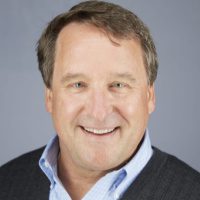
Alan Amling is a TED speaker and leading authority helping companies get out of their way to thrive in disruption. Alan’s deep research backed by 27 years of driving innovation at UPS provides actionable insights driving real results for leaders and their organizations. Alan is a Distinguished Fellow at The University of Tennessee Supply Chain Institute, CEO of advisory firm Thrive and Advance LLC, and on the Executive Advisory Board for the Georgia Tech Manufacturing Institute. In addition, he is a Board member and advisor to promising startups. His first book, Organizational Velocity, will be released on March 16th. Alan holds a Ph.D. in Management from Kennesaw State University, an MBA from Indiana University, and a BA in Business and Psychology from Lewis & Clark College. Connect with Alan on LinkedIn.
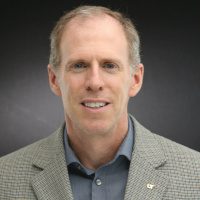
Professor Thomas J. Goldsby is the Dee and Jimmy Haslam Chair of Logistics at the Haslam College of Business, University of Tennessee-Knoxville. He holds a B.S. in Business Administration from the University of Evansville, M.B.A. from the University of Kentucky, and Ph.D. in Marketing and Logistics from Michigan State University.Dr. Goldsby is immediate-past Editor-in-Chief of the Journal of Business Logistics and former Editor-in-Chief of Transportation Journal. He serves as Co-Faculty Director for the Global Supply Chain Institute at the Haslam College. His research interests include logistics strategy, supply chain integration, and the theory and practice of lean and agile supply chain strategies. He has published more than 100 articles in academic and professional journals and serves as a frequent speaker at academic conferences, executive education seminars, and professional meetings. Professor Goldsby is author of five books and a recipient of multiple best paper awards for his research. He has also received recognition for excellence in teaching at the University of Tennessee, The Ohio State University, University of Kentucky, and Iowa State University. In 2019, he was recognized as a “Rainmaker” by DC Velocity magazine and received the inaugural Lifetime Achievement Award from Supply Chain Leaders in Action (SCLA).Dr. Goldsby delivered a course on Business Operations for The Great Courses’ Critical Business Skills series in 2015, which continues to rate as a bestselling Nonfiction/Business title at audible.com, and was rated among the Top 50 bestsellers (#27) among all audiobooks during Summer 2020 by Newsweek. His supply chain and logistics insights been sought by a wide assortment of media outlets, ranging from NBC News to the Wall Street Journal and National Geographic. Connect with Tom on LinkedIn.
